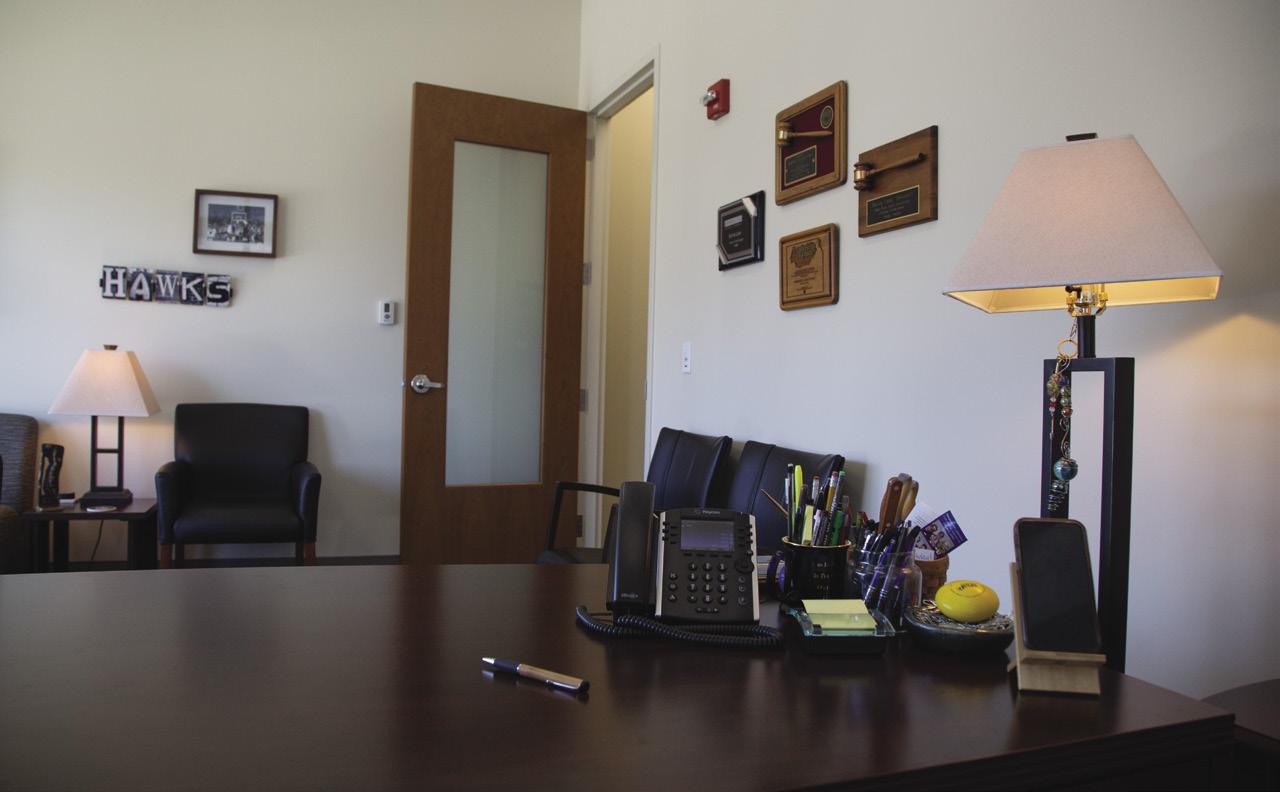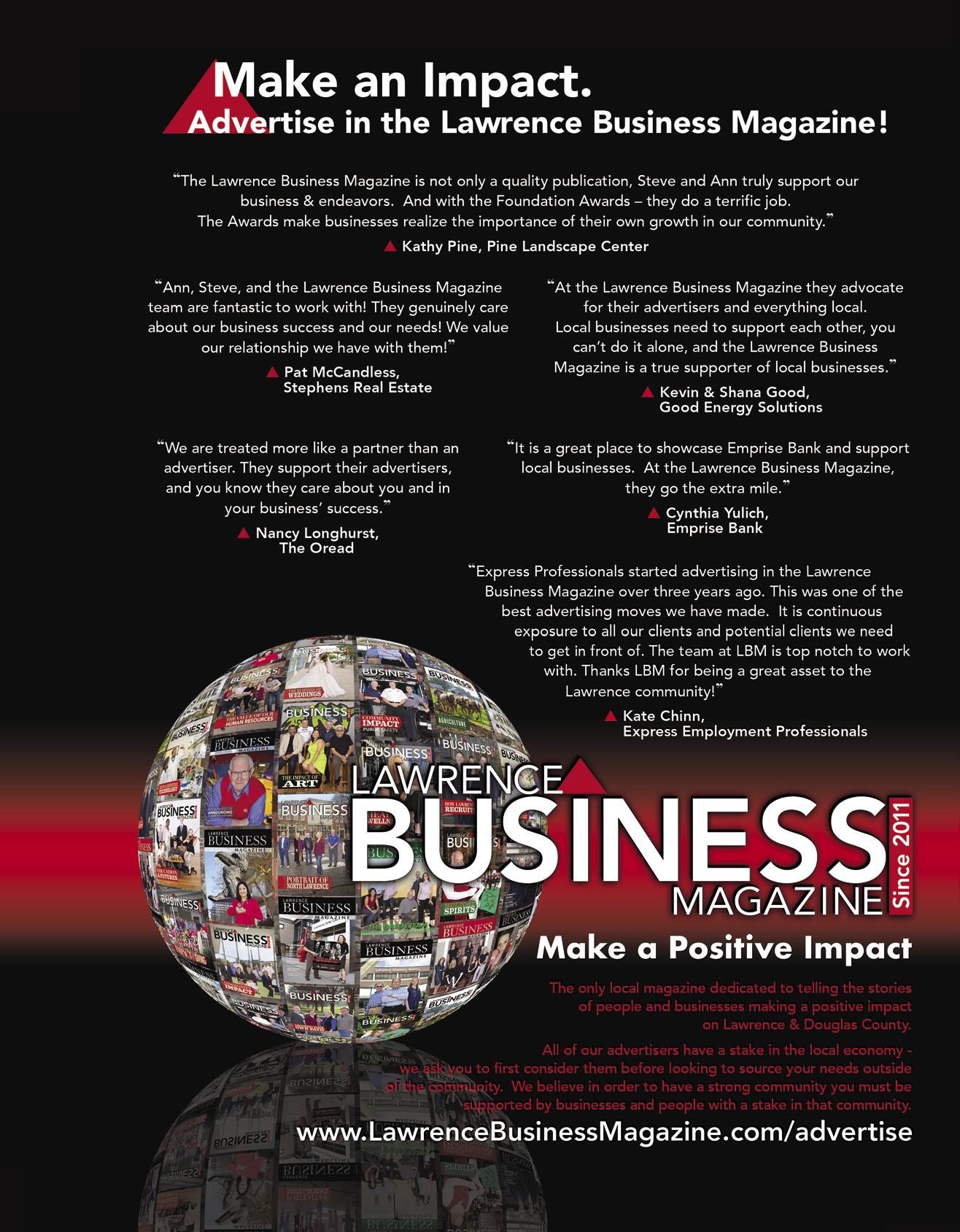












The Lawrence Business Magazine introduced our yearly impact issue in 2012 with the Women of Impact; ten years later, we decided to focus again on the Women of Impact in our community. We are fortunate to have so many incredible women from which to choose. But it also poses a big challenge. Unfortunately, we couldn't get all of the amazing women in this issue, and we are sure you have someone very deserving that isn't here, but along with our writers, we tried to find a collection of strong, diverse, and selfless women; individuals who reflect a multitude of different career paths and who represent various ways to make an impact.
Lawrence is and continues to be shaped by dedicated women. One woman, Elizabeth M. Watkins, was a philanthropist and a steward of education and health. She is known for her generous monetary contributions to the City of Lawrence and the University of Kansas. If you have ever come across a Lawrence building or organization with the name Watkins on it, such as The Watkins Museum of History at 11th and Mass St (and the location we chose for the cover shoot), there is a good chance its existence is the result of Elizabeth's philanthropic donations. From 1926 until her death in 1939, Elizabeth became a champion of health and education, which earned her the nickname "Lady Bountiful." The Lawrence Business Magazine celebrates Elizabeth Watkins as one of the original Women of Impact.
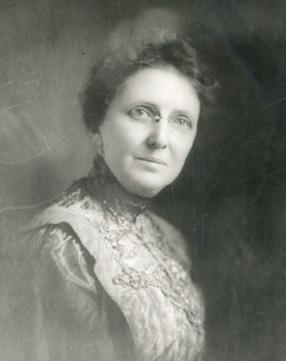
The Women of Impact throughout our community, whether mentioned in this issue or not, are the role models that uplift our youth and influence generations to become more impactful in their present lives. They inspire others to follow in their footsteps and leave their legacy on our future.
As we end the year, take inspiration from these women and all of those in our lives that are making a positive impact. Let's appreciate them, and do our best to honor them by making a positive impact on our neighbors and community. Please remember that all our advertisers have a stake in the local economy; we ask you to first consider them before looking to source your needs outside of the community. Try and shop locally as much as possible and avoid the urge to order online. If you find something online – see if one of our local businesses has it. We know that they would appreciate the business, and when you hear someone say, "We are all in this together," remember that our local businesses are at the center of our community.
When we Shop Local - Shop Baldwin, Eudora, Lecompton, and Lawrence (and use Local Services). We are not just supporting those businesses but giving back to our community and building a future together.
Happy Holidays, Ann Frame Hertzog Editor-in-Chief/Publisher Chief Photographer/Publisher
www.LawrenceBusinessMagazine.com

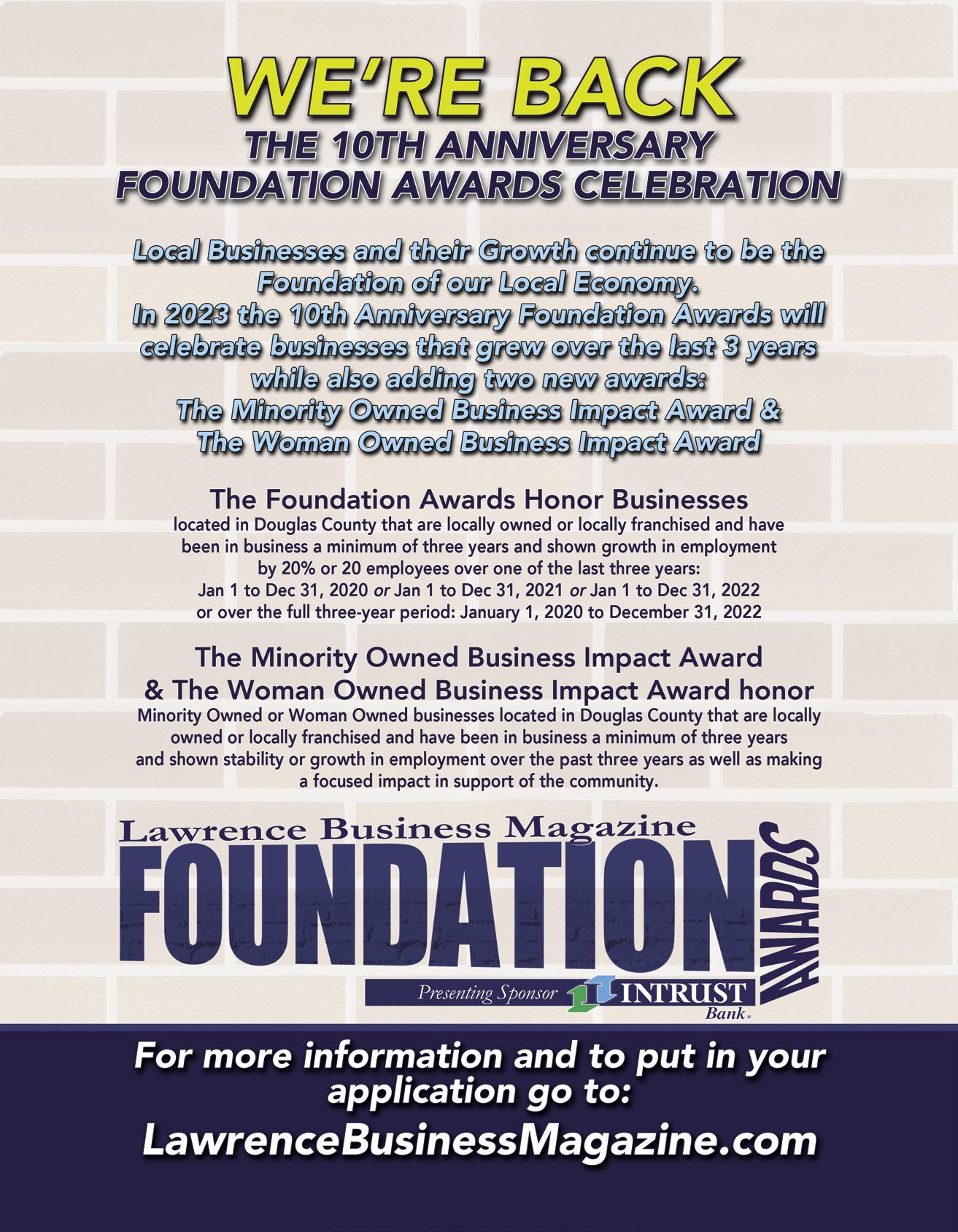

Note: Much of the information in this article is from “Experimental Autonomy: Dean Emily Taylor and the Women’s Movement at the University of Kansas,” by Kelly Sartorius, published in Kansas History: a Journal of the Central Plains, Spring 2010. Emily Taylor served as the Dean of Women at the University of Kansas (KU) from 1956 until 1974. In this position, she encouraged women students to look beyond their traditional concerns about dorm hours, social events and traditional feminine careers to greater personal independence and intellectual growth. She had a lasting impact on students at KU and across the nation in her position as Director of the Office of Women in Higher Education at the American Council on Education. While serving in this position, she helped establish a national program to identify women qualified to be high-level university administrators. She was viewed as a leader of educators by supporting for-
ward-looking women’s organizations, including those focused on the status of women.
Taylor was working at Miami University in Ohio at the time she was offered the position. Her negotiations for the job gave a clue about how she would approach the position. When Chancellor Franklin Murphy initially offered her the position of dean of women, Taylor was interested in the position because of Murphy’s progressive views on the involvement of students in their own governance. He emphasized that student personnel positions should encourage student achievement, develop leadership skills and foster personal growth. However, she was to be subordinate to Laurence C. Woodruff, who had recently been given the title Dean of Students instead of Dean of Men. Taylor refused to accept the current organization chart and requested that she report directly to the chancellor. Murphy agreed that Taylor would report to him without going through the dean of students. This allowed women (Taylor) a role in the
administration at KU. In addition, reflecting Murphy’s support for an independent role for the dean of women, Taylor’s salary was $8000 per year, $1300 more than the Dean of Men. She was also able to increase her staff. She began with one assistant in 1957, but by 1975, she supervised 11 employees and a graduate assistant. Meanwhile, the dean of men’s office depended on graduate assistants for its activities.
Through her career at KU, Emily Taylor supported initiatives that focused on women’s independence and their intellect. She was setting the agenda rather than the female students themselves. Her work with the Association of Women Students changed the focus from using rules and disciplinary action to women being more independent and in control of their lives.
Taylor wanted women’s living groups and the female students to take an active role in determining their own social standards. This was at a time when in loco parentis—the idea that university administrators would set
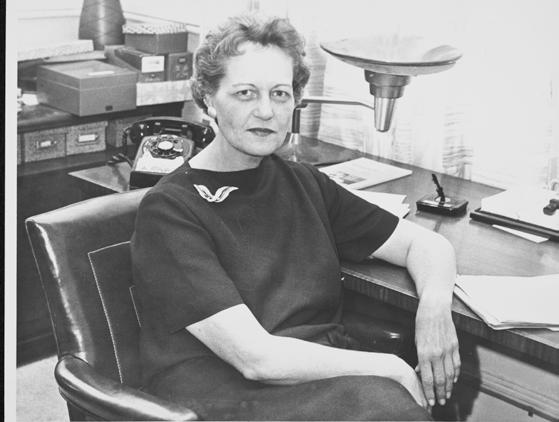
A woman ahead of her times, Emily Taylor gave the women of KU a sense of confidence and a drive to challenge steretypes during a time when women were treated as inferior to men.



rules that mimicked those established by parents before the women went to college—was practiced. At KU, the Associated Women Students (AWS) governed dorms and sorority houses by adopting closing hours, regulations that set hours for “men’s calling hours,” the hours women could visit men’s living quarters, and establishing a procedure for “late permission” to return after the normal closing hours. At the time Emily Taylor arrived on campus, residence halls dealt with minor infractions, while the AWS had a judiciary board to deal with more serious cases. Safety of women students was the rationale for all these rules, but if administrators were candid, they admitted that the primary purpose of these regulations was to limit time male and female students were unsupervised in order to enforce social behavior to prevent premarital sex.
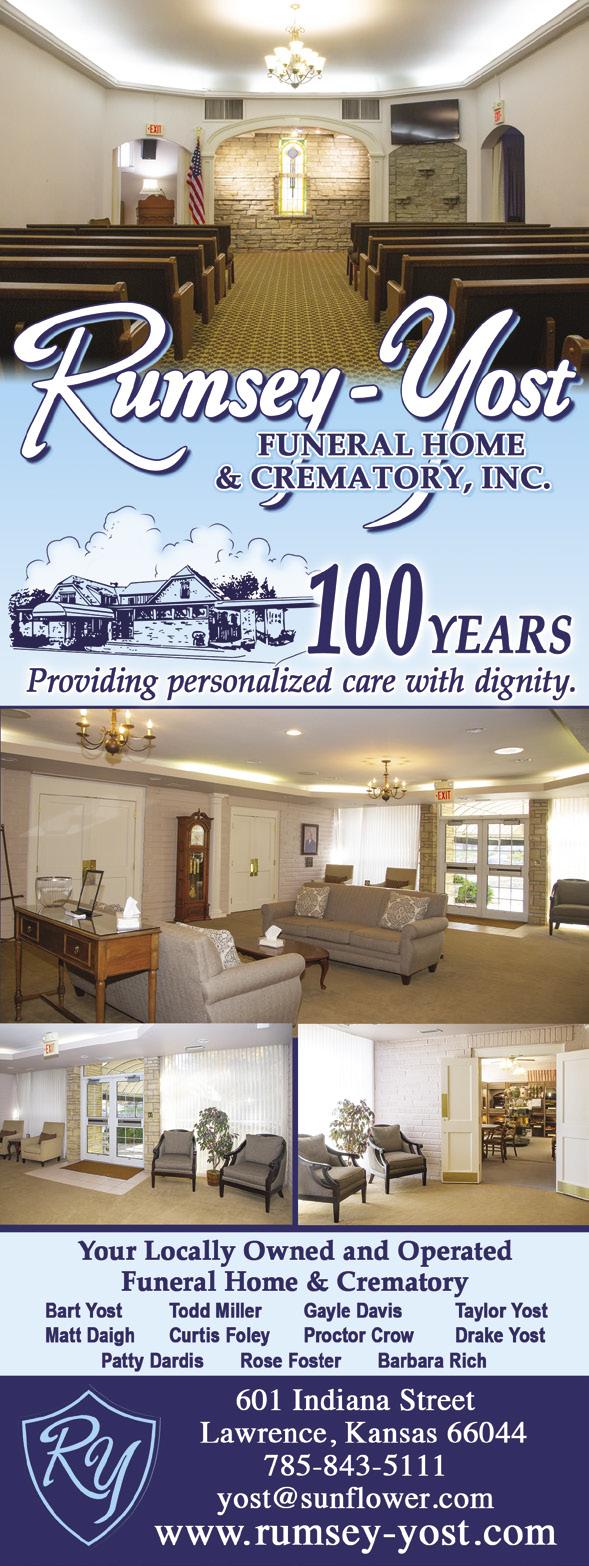
Taylor indicated she was interested in the position at KU because the AWS reported only to the dean of women and the chancellor. She wanted her staff to encourage student leaders to influence and to help make university policy. She believed the females involved in women’s student government would develop leadership skills while allowing women to define their own policies. Taylor wanted female students to determine their own programming by bringing in lecturers who questioned the status quo for women in universities and encouraged them to become autonomous by developing personal behavioral standards and the confidence to apply them in their own lives without an authority dictating their personal actions, according to “Experimental Autonomy: Dean Emily Taylor and the Women’s Movement at the University of Kansas,” by Kelly Sartorius.
Taylor reorganized the AWS and established two committees: Bright Women to research KU alumnae with careers and Roles of Women to exam women’s place in society. She also changed the judiciary board to a board of standards because she wanted to downplay the disciplinary actions of the AWS. Instead, she encouraged women’s dorms and other living units to resolve the student problems that occurred. To be inclusive of all females attending the university, she expanded the prevue of the AWS to include even those living off campus. One student compared Taylor’s interaction with students as the student being a post and Taylor a pile driver. Taylor did not intend to provide traditional advice about boyfriends. In an interview with Sartorius on June 4, 1998, Taylor explained her no nonsense views.
I warned them that my advice would be very unconventional and that I had no sympathy for many things. … [One] young woman said she wanted to talk about … this awful story about this fellow that she was dating [who] was treating he so badly and [she] just went on and on. And I said … no I didn’t say anything for awhile, I just listened. And then she said, “What do you


think I should do?” And I said, “Well, I think you should get yourself another man.”
Taylor took her guidance of the AWS to a personal level by meeting with the president of the AWS Senate at her home every Sunday. She hosted receptions for AWS members and an annual overnight retreat. Anne Hoopingarner Ritter, AWS president during the 1960-61 school year, explained that Taylor asked women to think about their role in society and their reasons for attending the university. She had the women explain their plans after they graduated and expected them to consider options beyond being a wife and mother.
A sit-in by a group a women called the February Sisters in 1972 illustrated that Taylor’s ideas were taking hold. These women held a peaceful, 13-hour sit-in at the East Asian Studies Center. After meeting with university administrators including Chancellor Laurence Chalmers , the “sisters” reported they had achieved one of their goals with an announcement that a woman would chair the university’s affirmative action program. Other demands included a free day care center financed by KU. Other concessions included the appointment of a woman as vice chancellor for academic affairs, a woman administrator in the financial aid office, an autonomous women’s studies department and a women’s health program.
Though all of her accomplishments would be hard to include, Emily Taylor’s influence cannot be ignored. The following is taken from a “Tribute to Emily,” written by Casey Eike in July 1995, and provides an excellent summary of how she was viewed by her students.
Emily gave us what no one else could at the time, a belief in ourselves and in our abilities, a self-confidence we never had, even a belief that we could change the world. All that, and the chance to prove to ourselves and to others that we were becoming leaders. And, once leaders, she helped us to find our own way of challenging the usual, the stereotypes, the way it has always been. And when we were unsure and hesitant about our ability or talent, Emily would sigh, “Well,” and quote, “They said it couldn’t be done … so I didn’t even try.” Such recitation would shame us into forging ahead with our particular project or challenge, and once again we would prove to ourselves that, yes, I can do this. With her guidance, her witty nuances, her sometimes acid remarks, we finally saw the world and our place in it in a new way. And we would never be the same.
A woman among women. A mentor’s mentor. A role model which we knew we could never match. We thank you, Emily, for all that you are and all that we have become. p


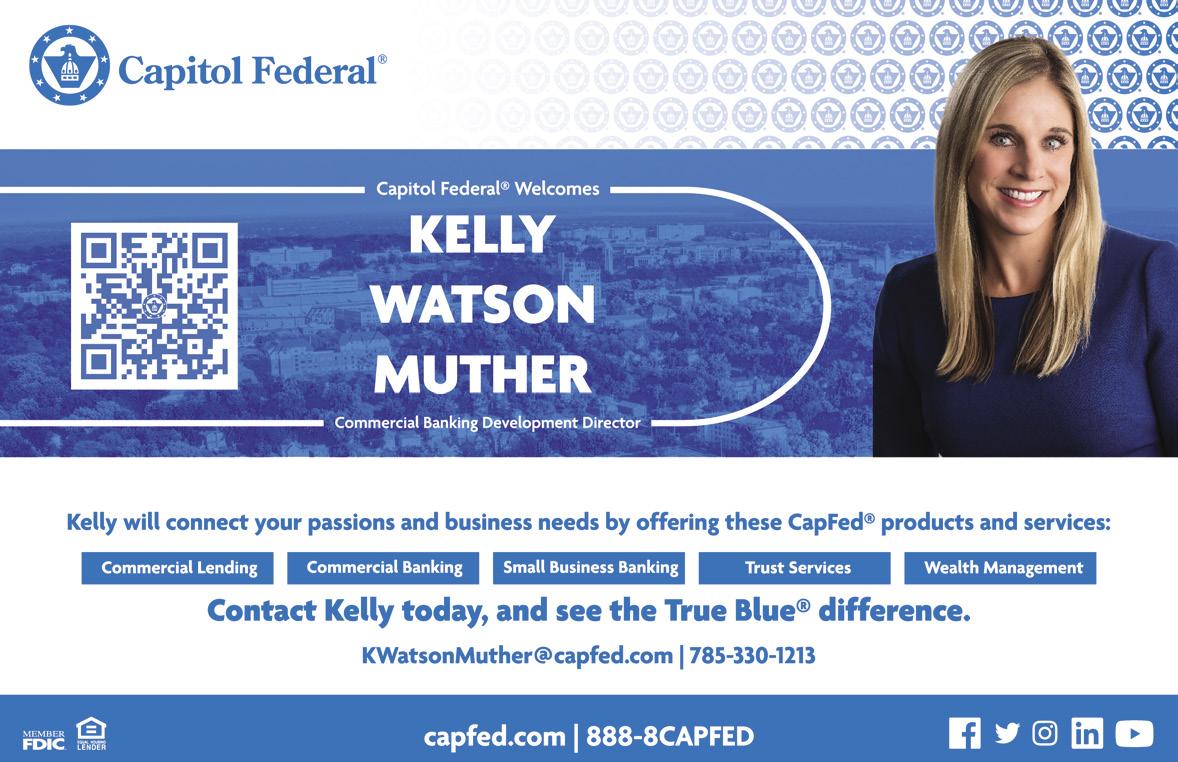
Tammy Barta walked alongside her mother when she received her breast cancer diagnosis in 1993. She had seen Matthew Stein, MD, then a physician at the LMH Health Cancer Center, and knew when her mom received the news, she better prepare herself and take all precautions now in case, one day, she got the same call.
“In my mind, it was never if I would get breast cancer but when,” Barta explains. “I had prepared myself for years about what I would do if I ever found a lump. Of course, I checked myself regularly, and on my birthday in February of 2021, when I went to bed, I noticed a knot under my breast.”
She called her doctor the morning after discovering the knot, and they sent her to have a sonogram as soon as possible at the LMH Health West Campus. While nothing had appeared on Barta’s mammogram the previous November, after this mammogram, the radiologist and technician both said it looked pretty serious. “They had me in the next day for a biopsy, and just a couple of days later,
they called to confirm that it was cancer,” she says. “I was OK because I had it in my mind all these years. For my family, it was much tougher. After my husband had finished processing, we told our kids and the family.”
When Barta’s mom was going through cancer, she and her stepdad had cared for her. Her stepdad now lives with her and her family, and she says having someone who had walked this road before as a resource made a huge impact.
When it was time for treatment, Barta ended up needing chemotherapy but not radiation. She met with Jennifer Hawasli, MD, a breast surgeon with Lawrence Breast Specialists, who walked her through what was next.

“Dr. Hawasli answered all the questions I had about my surgery. She was sweet and kind and stayed positive,” Barta says. “She would affirm me that we could get this cancer out and would explain every step of the way—what I would have done, why— and it always gave me clarity knowing what was going on.”
In the coming days, she met with An-
continued to put her at ease, her knowing she was going to receive great care.
“Dr. Meyer is the sweetest man in the whole wide world. He was always reassuring and kind. Since we caught it early enough, he assured me it was only Stage 1, but we needed to move fast,” Barta says. “I met with Dr. Aldrich about breast reconstruction, and she was amazing at explaining everything. During my visit, she looked at everything she needed to, provided some wonderful suggestions and let me make my own decision on reconstruction.”
Barta remembers it all happening so quickly. She found the lump on Feb. 28, 2021. Her port was put in on March 25, and she began her journey through chemotherapy on April 6.
“From diagnosis to treatment, it all happened within a month. No one hesitated or missed a beat; it was boom, boom, boom, and I was ready for treatment,” she explains. “I truly


have to give credit to my coordinator, as well. There is a lot of information that comes your way. They gave me a printout that just gave me clear answers and schedules telling me where to be at what time. It made that portion so easy.”
Barta’s team determined she would need six rounds of chemotherapy. She would receive six different infusions when she went into treatment, and since she was HER+ (which can cause more growth of cancer cells), she would need six rounds of infusions for that diagnosis, as well. She says the nurses and medical staff were always kind and checked in often to make sure she was comfortable and doing alright.
“The team would offer me blankets and snacks, and would constantly check in and ask questions to make sure I was OK. Every time they would come care for me, they would explain exactly what they were doing,” she adds. “Though I was supposed to have six chemo infusions, by mid-July 2021, I had become incredibly sick and didn’t know if I could continue with the treatments.”
Barta’s sickness led to low magnesium and potassium, and she became anemic. She needed blood transfusions, magnesium and potassium infusions, and fluids, and later became an inpatient at LMH Health because she had nephrites (inflammation in the kidneys).

“This whole time, with any complication I had, the nurses continued to treat me wonderfully and were very responsive in getting things done and talking with me about my condition,” Barta says. “After my fifth chemo treatment, Dr. Meyer decided it would not be smart to complete the sixth. This scared me. My brain would say, ‘But what if, what if.’ Dr. Meyer talked me through this and said my body needed to heal before we began the double mastectomy and reconstruction.”
Once her body had healed, she met again with Drs. Hawasli and Aldrich to discuss surgery and reconstruction. The process was again seamless, and before she knew it, it was time for the procedure.

Barta had previously had breast-reduction surgery, so the process wasn’t completely unfamiliar. The team continued to assure her everything would be alright. After the surgery, she went home and began her recovery.
“Not too long after the surgery, I got a call from Dr. Hawasli,” Barta says. “She asked if my husband was around since he was with me every step of the way at the appointments, treatments and everything. I said yes, and she asked that I put him on speaker phone. She said she didn’t usually call, but she had to let us know some good
news. She said, ‘Tammy, we got it. We got all the cancer.’
At my next appointment with her, she couldn’t wait to give me a big hug, and I was just overjoyed. These people were now like great friends and family to me. To hear this news was incredible.”

She says her care team made her feel like she was also part of the team. There were no decisions made for Barta—they gave her all the information, made sure she felt calm and let her make the decisions that were best for her. She says she knows she made the right decision staying in Lawrence for her care.
“Years ago, I worked in IT (information technology) at LMH Health at a time where the reputation was that LMH wasn’t the best place for your care,” Barta explains. “It brings me so much joy to see how much has changed and how incredible the care that we offer our community is. I could not imagine having a better experience or a better care team. They made sure I was healthy, mentally and physically, and never made me seem like just another patient. I was always their No. 1 priority when I was in their care.”
Barta was amazed to see that even when the team members seemed like they were running 100 miles a minute, they still checked in to talk with her and make sure she was hanging in there.
“I have nothing but wonderful things to say. Even the scars from my surgery were fantastic, I don’t even see them,” she says. “I am grateful to be back to work full time and doing things with my family. If I see any member of my care team out in public, I would without a doubt give them a hug. I recommend the team at LMH Health to everyone and could not imagine receiving better care anywhere else.” p
The seeds of a life in public service were sown early in Kansas Rep. Barbara Ballard, who gained her drive toward civic duty from her allfemale high school and college, as well as with hands-on experiences during the Civil Rights Movement.
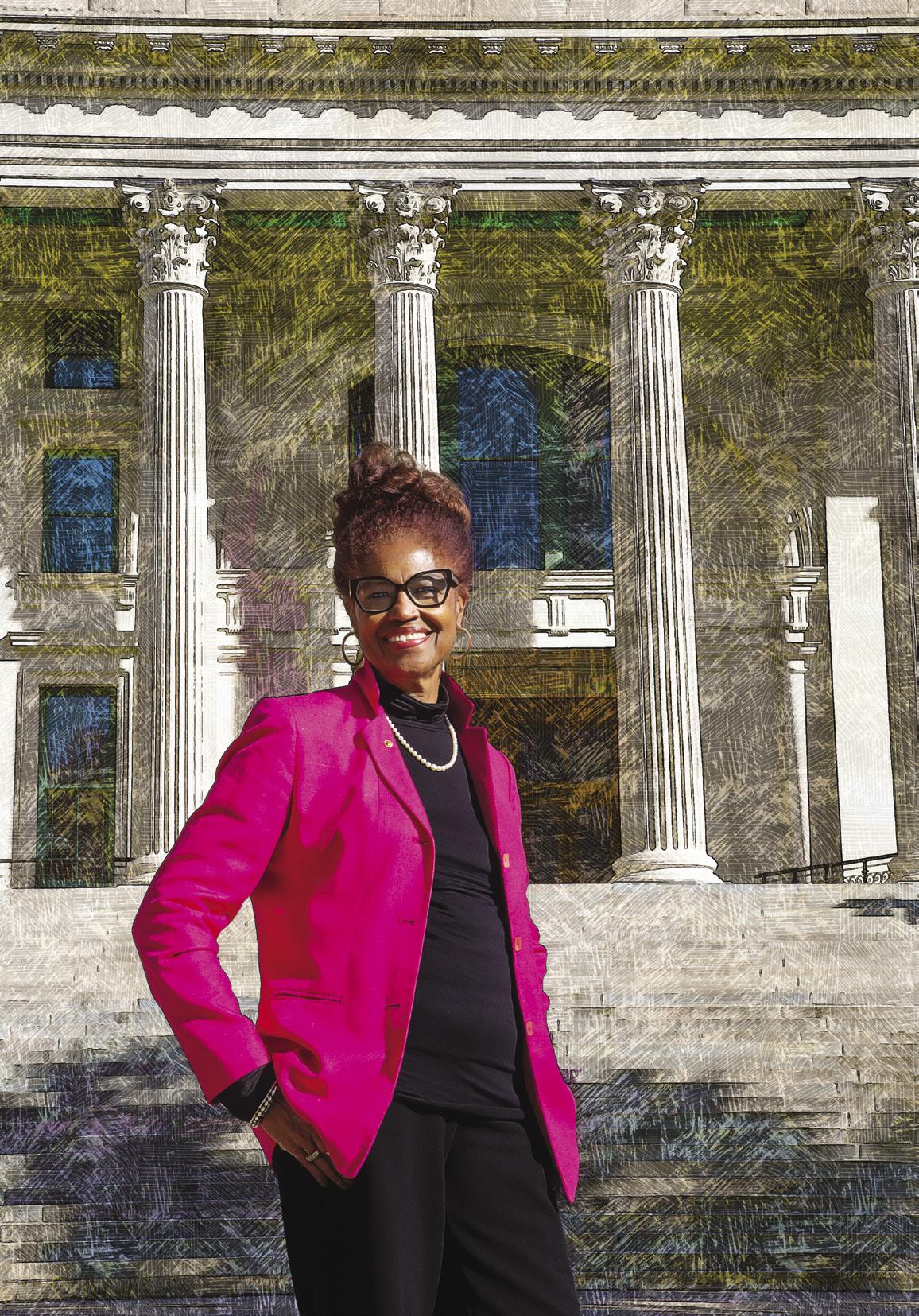 by Bob Luder, photo by Steven Hertzog
by Bob Luder, photo by Steven Hertzog
At the end of this year, Barbara Ballard will complete her 30th year as a member of the Kansas State House of Representatives, representing Lawrence’s 44th District. And having just been reelected last month—she ran unopposed—to a 15th two-year term beginning in January, at least a 31st and 32nd year in the Legislature appears certain.
At 78 years young, the ebullient and energetic Ballard shows absolutely no signs of slowing down.
“I’m asked all the time how long I’m going to keep doing this,” Ballard says from a conference room inside the Dole Institute on the University of Kansas (KU) West Campus, where she serves as associate director of Civic Engagement and Outreach. “When I wake up one morning and say, ‘That’s it,’ then that will be it. As long as I feel I’m making a difference and have energy to do it, I’ll do it. “I enjoy what I’m doing, and I hope it’s apparent I enjoy it,” she adds.
As Ballard is quick to point out, only 165 people—125 House representatives and 40 state senators—have an opportunity to serve the people of Kansas in the state Legislature at any given time, and she’s never lost sight of the honor and privilege she has been bestowed by her district constituents the last three decades.
“Serving is not easy,” she says. “You have to adjust your life to what you’re doing for your constituents. Keeping a positive outlook in what you’re doing is important.”
All evidence indicates the state’s Legislature has been the better for her service.
Since 1996, Ballard has served in House leadership and on the Appro-
priations Committee. She has been chairperson of the House Democratic Caucus and has served as ranking minority member on the social services budget and calendar and printing. She also has served on the Robert G. (Bob) Bethell Joint Committee on Home and Community Based Services and KanCare Oversight.
In 2007, the National Black Caucus of State Legislators named Ballard its Outstanding Legislator of the Year.
“Barbara is just a really nice person, a really caring person, and she listens,” says Brenda Landwehr, Representative of the state’s 105th District, which encompasses the Wichita area, and who has served for decades with Ballard on appropriations and social services budget. “She doesn’t play all the games. Social services can be very difficult. You hear some really sad stories, and it’s difficult to not get emotional and determine where the greatest needs are.
“Barbara’s been able to do that,” she continues. “She’s young at heart, and she really cares.”
Ballard grew up the second of four children. Her father was a master sergeant in the Army, but she’s quick to point out she was not brought up as a prototypical “army brat.” She only knew two homes growing up. Born in Petersburg, Virginia, the family quickly moved to Hawaii, where Ballard would spend much of her formative years.
She says when she was 14 or 15, her father was reassigned to El Paso, Texas, and it was there she received the seeds of a life in public service.
“The high school I went to in El Paso was the Loretto Academy, an all-girls Catholic high school,” she says. “All the students there were involved in so many things. That had a big impact on me.”
She says because there were no boys at Loretto, the girl students weren’t relegated to the background, as was the norm back in those days, and were actively involved in all sorts of civic endeavors. Her civic-mindedness was further bolstered when she attended Webster College, in St. Louis, which was operated by the same order of nuns that ran the Loretto Academy and also had an all-female enrollment.
During her sophomore year, in 1965, she joined a group of Webster students that flew to Montgomery, Alabama, and participated in the Selma to Montgomery protest marches.
“I remember the Western Union man (arriving with a telegram) the night before from my father giving me permission to go,” Ballard says.
While sowing the seeds of a life of public service, Ballard also found time to graduate from Webster with a degree in music performance and education.
She married Albert Ballard in 1969 and moved to Monterey, California, where she taught music and fifth grade. She originally stayed in Monterey when Albert, who also served in the Army, was reassigned to Fort Riley, Kansas, but eventually joined him in central Kansas. She would go on to earn a master’s degree in guidance and counseling, and a Ph.D. in counseling and student personnel services, both at Kansas State University.
Albert’s retirement from the Army eventually would lead to the Ballards’ moving to Lawrence when Barbara accepted a position as the director of the Emily Taylor Women’s Resource Center at KU. She was responsible for organizing activities for women students and advocating for victims of sexual assault. She later was promoted to associate dean of student life and then to assistant vice chancellor of student affairs.
In 1985, Ballard became the first African American woman to run and be elected to the Lawrence School Board. She served two terms through 1993. It was around that time that Jessie Branson, then-representative for the 44th District, announced she would be retiring and asked Ballard if she’d consider running for the seat. That began a three-decades-long career in state Legislature of which she’s grown quite fond—and proud.
Ballard has had a hand in passing much legislation through the House during her 30 years in office, but there are two pieces she says are particularly memorable.
After a constituent crashed a car into the back of a trailer that was sticking out onto a highway at night, she crafted a bill requiring all trailers to have reflector lights at the rear. What was memorable, however, was that, after the bill passed the House, it had to go through the Senate, which attached a motorcycle helmet requirement to it.

“I bet I had every motorcycle rider in the state at my door,” she laughs now. “And I had nothing to do with it.” The helmet requirement eventually was taken off, and the bill passed.
The other accomplishment that makes Ballard especially proud had to do with appropriating funding in 2019 for a comprehensive plan to repair, update and reopen the Osawatomie State Hospital, which had closed in 2015.
“I am most proud of my work on the Social Services Budget Committee over the years,” she says. “It has provided our committee many opportunities to fund services, including mental health services in Kansas, Home and Community Based Services, Kansas Department for Aging and Disability Services, Kansas Department for Children and Families, Veterans Affairs and Guardianship Program for guardianship or conservatorship services for vulnerable adults.
“Our efforts have made a difference in the quality of Kansans’ lives,” Ballard says.
Barbara Ballard has made a difference these last 30 years for the 44th District, Lawrence and Kansas.
“Barbara understands bipartisanship; she’s effective at working across the aisle,” says Paul Davis, a Lawrencebased attorney who served on the legislature with Ballard from 2003 through 2015. “Social services has always been her passion. She’s been a big voice for people in the state who don’t have a lobbyist or someone else to represent them.” p
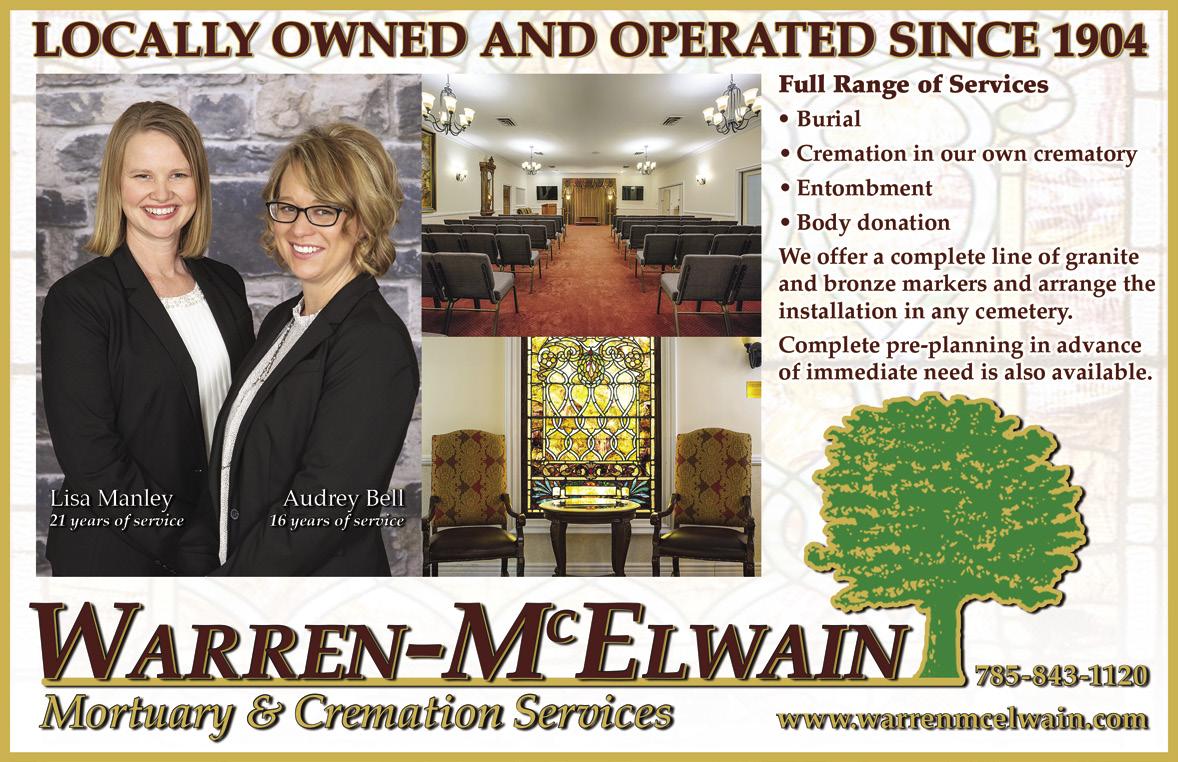

Because of her great admiration for late Supreme Court Justice Ruth Bader Ginsburg, Amii Castle has always leaned toward women’s rights legislation in her study of law. And she impresses that to her students as a professor at KU. The way she sees things, she’s constantly educating others, if not in a classroom then through the publication of
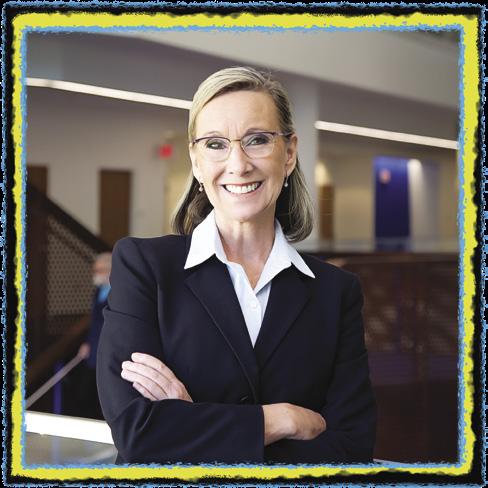
written documents or letters. She likes to simplify complex subjects pertaining to the law and make the law more easily understandable, whether it be to her students or anyone else seeking her expertise. But it’s not just enough for her students to know the law. Her goal is to make her students critical thinkers about what might be happening in government and politics. She doesn’t want students to just know the facts, but be able to interpret them accurately. Finally, if she can successfully encourage more young people to vote, then she’ll consider her mission accomplished.
Ruth Bader Ginsburg. RBG is my role model not only for the opinions and dissents she wrote while a Supreme Court Justice, but more for her groundbreaking work as a lawyer in challenging laws that discriminate against women. RBG led the fight against gender discrimination and changed the legal landscape for the better in the process.
I am an educator by trade, so with that lens, I am always looking for opportunities to educate others. Whether it’s teaching in the classroom, writing letters to the editor, or preparing a presentation on a legal issue, my challenge is to break down and simplify complex subjects—usually subjects having to do with the law. I want each of my audience members to walk away understanding a legal concept that was once confusing to them. If my audience feels just a little smarter after hearing me speak or reading an article, I’ve done my job as an educator.

For most of my adult life, I was a busy attorney practicing law in downtown Kansas City. I came to teach at KU in 2016—when the political landscape really shifted. I decided then to do all I can as a professor to provide accurate and truthful information to my students and to teach them how to think critically about legal issues. By extension, I try to provide members of my community accurate and truthful information so they can think critically about what might be happening in our government and in politics. Misinformation and disinformation can’t exist in a room full of educated, critical thinkers. That’s the impact I hope I am making.
More young people voting! My daughters now have fewer constitutional rights than I have enjoyed my entire life, and we are handing the next generation a planet that’s on fire. It’s younger folks who are going to have to fix our mess, and many don’t realize they have a secret superpower right now—the ballot box. Politicians and elected officials don’t listen to people who don’t vote, so if younger folks want to be heard, they need to start voting in higher numbers. r
“My mother told me to be a lady. And for her, that meant to be your own person, be independent."
– Ruth Bader Ginsburg


Setting aside graduate school to work in the music industry may not have been the original plan, but it led Jacki Becker to realize not only her passion for music but other passions, as well.
 by Nick Spacek, photo by Steven Hertzog
by Nick Spacek, photo by Steven Hertzog
The story of Jacki Becker’s life in Lawrence begins with music, an unsurprising fact for anyone who knows the owner and operator of the booking agency Up to Eleven Productions. Beginning with her time at the University of Kansas’ student-run radio station, KJHK 90.7 FM, where she started a show devoted to local music called “Plow the Fields, Martha,” in 1990, and continuing on through booking bands at The Bottleneck, tour-managing bands and on to managing her company for more than 20 years, music has been the throughline.
“I never thought I’d move here and stay,” Becker explains over coffee at Sunflower Outdoor & Bike Shop. “That’s just always the joke to me— that somehow I found Kansas more appealing than Wisconsin or anywhere else in the world—but apparently I did, and I’m glad that I have.”
Becker originally assumed she was going to graduate school, looking at going to the University of North Carolina or Duke to do women’s history or women’s studies, something like that, but business owner Brett Mosiman offered her a job at the Bottleneck, to which she said yes.
“Told my mom and dad I wasn’t going to grad school, and I was gonna book bands,” Becker laughs. “And here I am.”
While Becker doesn’t want to come across as that old person spouting off about walking 20 miles in the snow uphill both ways, she does acknowledge that when she started in the business, the job was a bit different from the way it is now. She made the poster, she made the handbills, she ran the show, she did the ticketing, she settled with the band, and she
was the runner, while now multiple people do all those jobs.
However, in the process of running around town doing things for bands, Becker became more aware of other aspects of Lawrence outside of the music scene. When people are coming in and they’re asking, “Where’s a good place to get vegetarian food?”, that makes you have to know more about the city you live in.
“Where we’re sitting right now was a veggie place called Herbivores,” Becker points out. “I think the live music industry probably kept that space alive, along with myself. I probably ate at Herbivores five days a week because it I don’t need meat. It was the perfect place to go and eat.”
Becker’s veganism is very much an important part of who she is, and it informs some of the other things she does in the community, although she is quick to explain that she’s “mostly vegan,” but she’s also from Wisconsin, and there’s something about local cheese from sheep and cows that she still really likes.
“I’ve gotten great at making cashew cheese and things like that, but cashew cheese curds don’t exist, and they probably wouldn’t squeak,” the promoter jokes. That being said, during the COVID lockdown, when there were no shows to be put on, Becker did the occasional vegan or veggie pop-up, working with what she refers to as “the wonderful family that I have at The Roost.
“If you keep challenging yourself, you can find new things to do,” Becker explains. “Do I wanna open a vegan restaurant? No, but would I like to do a vegan pop-up every now and then, and make really good food from my
garden for people? Yes. Absolutely. It’s an important piece of who I am and what I do in the community.”
COVID saw Becker’s career in music turn to activism as tours began canceling, and music venues started shutting down. Given their status as vectors for transmission, many venues were the first places to close in the towns and cities that had them, and were often the last places to reopen. Because of that, Becker partnered with Mike Logan, owner of downtown Lawrence venues The Bottleneck, Granada, and Lucia, to work with Save Our Stages, a “group of over 3,000 independent venues in 50 states and Washington D.C. that [were] banding together to ask Washington for targeted legislation to help [them] survive.”
As COVID took hold in early 2020, Becker was constantly moving shows—more than 200, by her recollection—with some rescheduled three or four times apiece until the full shutdown became apparent.
“We were doing anything we could not realizing the damage of what this was doing to us,” Becker recalls. “But then, watching a group of crazy independent humans go to D.C. and actually push for ‘Save Our Stages’ to happen? That’s beautiful. What was accomplished, I don’t think it’ll ever happen again, but it just shows you that live music independent promoters are nuts, and we will commit to anything to the extreme level, to the nth degree, and it needed to happen.”
As she points out, next to University of Kansas basketball, she thinks live music is consistently one of the most important things people have to do in this community. People can come to a space and see a show, and those people who come from out of town, they stay at a hotel or Airbnb, get coffee, get gas, eat food and go shopping in a space that’s walkable.
Being able to get about in a way that doesn’t encourage using an automobile might be the other aspect of Becker’s activism that most exemplifies her devotion to Lawrence. She rode up to the interview on her bike and can frequently be seen on it all over town and, during the years, has been part of a group that has advocated time and time again for bicycle accessibility in Lawrence. It just might be one of the more uphill battles Becker has had to fight. Live music and sustainable eating are things people can get up behind, but it seems as though folks have very strong emotional reactions to people on bikes. “One of the first committees I joined
back, I don’t even know when, was working on bicycle stuff with the City,” she recalls. “We started picking away at and trying to figure it out. We got that little two-block area on Ninth Street. I rode it, I was like, ‘Yeah, this is amazing, and we’re gonna get made so much fun of, ’cause that’s all we have, and it doesn’t go anywhere, but we did it!’ ”
In addition to architect Mike Myers and Jessica Morton, with the City of Lawrence, Becker found a group that thought the same way she did, and they started writing grants and talking about safe biking, and now, she says, she can bike almost anywhere in the city.
“There’s still lots of work to do,” Becker says. “But we’ve got it started, and
we’re making it accessible.”
All of this—Save Our Stages, veggie pop-up kitchens, bike advocacy— comes from the way Becker hopes everyone can live their life.
“I believe in a life that hopefully allows you to give time to volunteer,” Becker says, explaining that’s something she got from her parents, and they’ve always been those people. “I’ve never lived my life to be incredibly wealthy,” she explains. “I want to have enough money to live and spend my time—I guess you’d say ‘solving problems,’ but being a piece of a group of humans who are working to make sure that communities can be fed, have accessibility, can feel safe, secure and live. I like where I live, and I’d like others to enjoy it, too.” p
As a Kansas State Senator, Marci Francisco believes in doing – action – more than saying mere words. Many of those actions of directly had positive impacts on members of the Lawrence community, such as restored and affordable housing, wood-chip programs, even turn lanes on busy city streets. She reached the state senate from the ground up, serving in the late 1970s on local neighborhood associations and community advi-
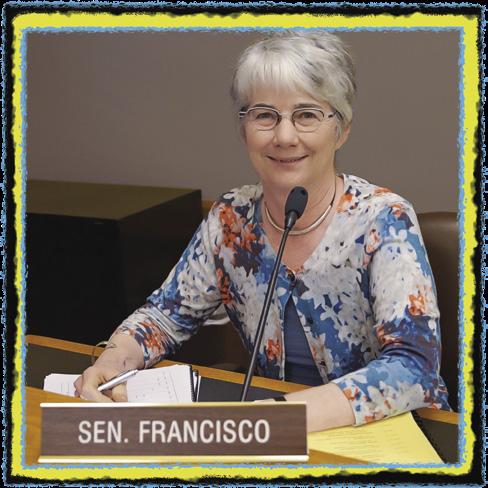
sory boards before moving on to city commission. She believes in working for the community from a standpoint of responsibility, accountability and –there’s that word again – action that always comes from a place of understanding and taking into account what the people of Lawrence need.
Jessie Branson and Betty Jo Charlton, two of the members in the Kansas House of Representatives representing districts in Lawrence.
I try to change things more through what I do than what I say. I take responsibility and actions while trying to understand and take account of what others need.
Being able to point to things in our community that were a result of my actions: restored and affordable housing, the city’s wood chipping program, and the turning lane at 23rd Street that allows northbound traffic onto Massachusetts Street without stopping for a traffic signal. Also, it’s helping others understand how they can have an impact.
I decided in 1977, as a member of the Oread Neighborhood Association, to volunteer for the Community Development Block Grant Advisory Board to help improve my neighborhood. Two years later
I ran for City Commission hoping to help improve neighborhoods throughout Lawrence.
I’d like to see less waste of plastic, food, building materials, energy. r
“What you do makes a difference, and you have to decide what kind of difference you want to make.”
– Jane Goodall


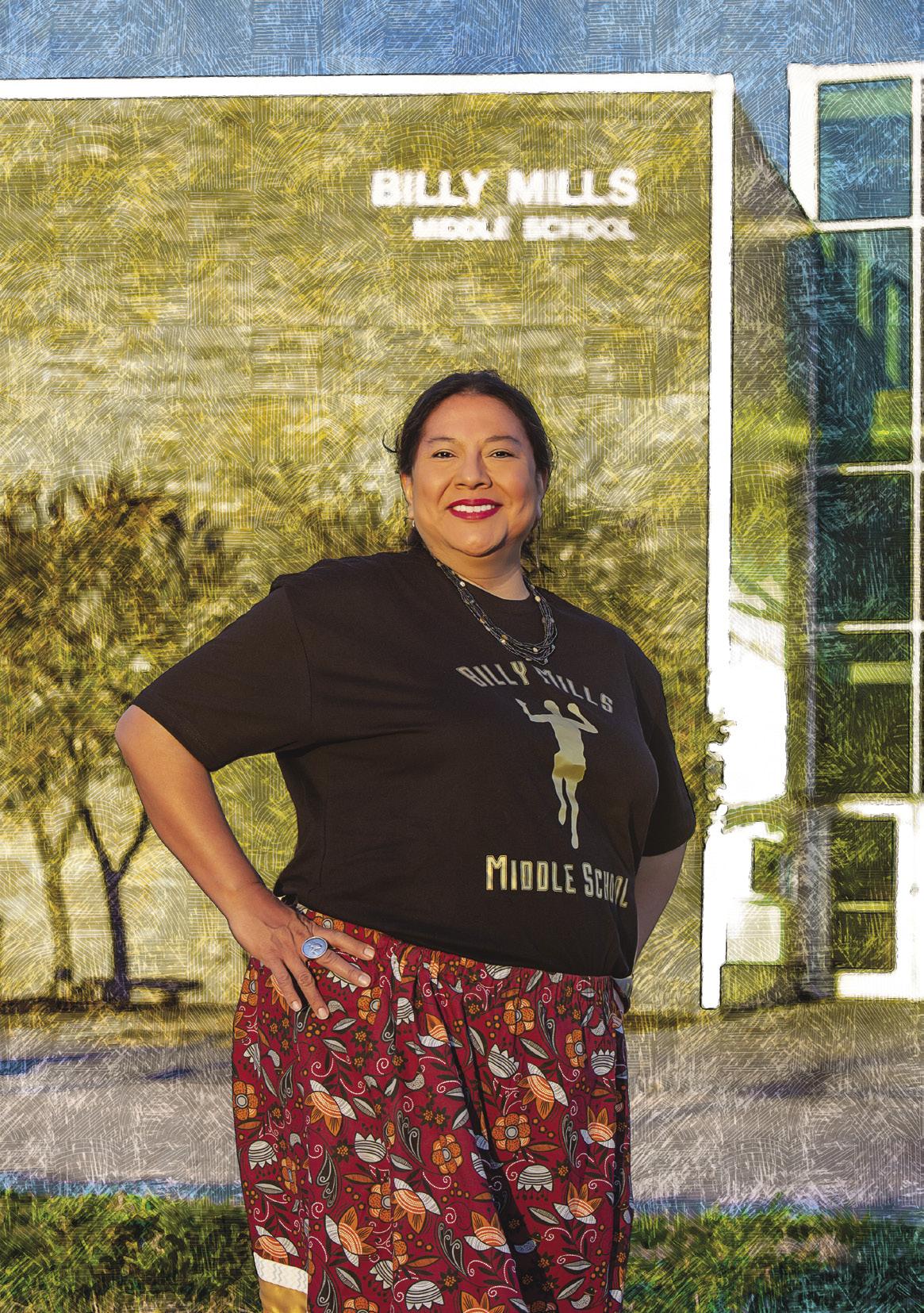
A pillar of the Indigenous community and a strong advocate for her people, Carole CadueBlackwood continues to shed a light on the racism against Native Americans in all walks of life— from sports to schools to everyday life.by Tara Trenary, photo by Steven Hertzog
On a cool morning one recent Saturday, about 15 people showed up to a Kansas City Chiefs game to protest— peacefully—at the GEHA entrance of Arrowhead Stadium. Members and supporters of Not in Our Honor, formed in 2005 by a group of Native American college students at the University of Kansas (KU) and Haskell Indian Nations University, were there to raise awareness about how detrimental the use of Native Americans as mascots in sports is. The Chiefs happen to be the last NFL organization to choose not to change its mascot.
“I’m not going to stop until it changes,” says Carole Cadue-Blackwood, USD 497 Board of Education member, case manager for The Kansas City Indian Center and enrolled member of the Kickapoo Tribe in Kansas. “It’s dismantling structural racism. People aren’t aware of how harmful the use of Native American imagery is.”
This life that she has chosen—or that has chosen her—is one of activism, community outreach, service to her people, advocacy for youth and providing mental health services for all. “She’s very justice-oriented,” explains Gaylene Crouser, executive director of the Kansas City Indian Center. “It all boils down to her people and being able to create positive social change for our community.”
In November 2022, a win for Not in Our Honor and Indigenous people alike, the Kansas Board of Education voted to retire using American Indians as mascots, helping to prevent “imagery and practices (to) seep into our publics schools,” Cadue-Blackwood says.
Cadue-Blackwood grew up in Lawrence. Her parents had moved the family here for the schools in 1978. She began her education at Sunset Hill Elementary in kindergarten and ultimately graduated from Lawrence High School in 1992. “I enjoyed the freedoms of being able to ride bikes with the neighborhood kids,” she says. “One of my favorite memories was when my parents came home from the grocery store to find us neighborhood kids playing kickball in the street.” She says her parents always encouraged their kids to get outside, and they never allowed them to say the “B” word (“bored”).
She spent many summers with her grandparents. From her grandmother, she learned “the concepts of mindfulness and the ability to examine my own biases while developing how to look through another person’s perspective,” she explains. “She (her grandmother) was highly intelligent, kind and fearless.”
From her grandfather, Cadue-Blackwood learned about discrimination, segregation and the power of words. She grew up seeing townsfolk call her grandfather “Chief” whenever they encountered him. She witnessed firsthand what he was forced to endure throughout his life (eating in the backs of restaurants and sitting on milk cartons around town) and what that kind of treatment can do to a person. This taught her how to be strong. She was called “Chief” once in high school, but only once. “I put a stop to that immediately,” she asserts.
She has always admired strong women, “my mother, my grandmothers and Wonder Woman. Specifically, in that order,” she quips. “All of them were committed to fighting the good
fight while maintaining grace and compassion.”
Cadue-Blackwood met her husband, Dennis Blackwood, in the Intertribal Club at Lawrence High School when she was a junior and he was a senior. “It was during the ’90s when seven of our Indigenous men were being killed in a rash of violence or unsolved murders,” she relates. “I wasn’t able to concentrate in school and advocated and coordinated for members of our club to protest with members from The American Indian Movement (AIM),” a grassroots movement founded in 1968 to address issues related to racism and civil rights violations against Native Americans.
The couple has three adult children. “As an Indigenous woman, I was raised with the mindset of doing everything for future generations. I took my children everywhere with me as much as possible for advocacy efforts,” she says. Cadue-Blackwood credits her parents for taking her and her siblings to their workplaces, protests, lobbying and public meetings. “I try my best to model that same behavior for them (her kids).”
She credits her first job, as a cashier at Checker’s, for directing her career down the path it has since taken. “I now advocate for a living wage and am mindful of how the cost of climate change will affect the price of a loaf of bread or an increase in utilities. I am able to help the clients I serve maximize their resources to live with dignity.”
Cadue-Blackwood says the most challenging part of her life has been maintaining harmony in work and life. “Balancing child care, school, activism and marriage have all been challenging. I am fortunate to have found the love of my life early who supports me and vice versa,” she says. “He served our country, and now I feel like it’s my time to reciprocate.”
Cadue-Blackwood says advocating for others is her “self-care.” “I grew up in a household of change agents. I like a good challenge,” she says. “I’m able to measure moments that will influence future generations—my determination to see a dream or an idea become a reality.”
She is the first USD 497 board member to have attended Lawrence public schools, K through 12, and hold degrees from Haskell and KU (an associate’s degree from Haskell, a bachelor’s degree in political science and a master’s degree in social welfare with a clinical focus, both from KU).
She serves on three site councils, the Budget and Program Evaluation Committee, Equity Advisory Committee and Educate Lawrence. “It’s my role (at USD 497) to serve as a link for the community; that means being accessible, looking out for students, keeping schools accountable for performance (and) ensuring the best education while working with reduced funding and supporting our superintendent,” she explains. “I also enjoy getting out and meeting our students. I want to hear from our most important stakeholders—our youth.”
Cadue-Blackwood works at The Kansas City Indian Center, one of only a few urban Indian centers in the country, which serves the Indigenous population of Kansas City and the greater surrounding area. “I love being a social worker,” she explains. “I have a dream job at The Kansas City Indian Center. I’m able to provide much-needed mental health services, performing community outreach and collaborating with other organizations to improve outcomes for urban Indigenous peoples.” She says she offers intensive outpatient services and facilitates a support group for those
in recovery from addiction. “I want to improve access to mental health services and improve prevention services for our students. The pandemic showed just how much mental health services are now needed more than ever.”
But Crouser says Cadue-Blackwood does so much more at the Indian Center. “Carole wears so many hats,” she explains. Case manager, social worker, leader of after-care groups, counselor, policy and advocacy work, making connections and finding resources. More importantly, “The folks that come here look at her as an auntie. She’s just a really good auntie to the people in our community.”
In addition to her work with USD 497 and the Indian Center, she is also the liaison for the United States Attorney’s Office for the Western District of Missouri for Missing and Murdered Indigenous Peoples (MMIP). She advocated for the passage of Savanna’s Act, a bill that requires the Department of Justice to “review, revise and develop law enforcement and justice protocols to address missing or murdered Native Americans.” She was appointed by Gov. Laura Kelly to serve on the Juvenile Justice and Delinquency Prevention Committee to support local and state efforts to prevent delinquency and improve juvenile justice systems. “In 2019, Kansas Department of Corrections was transferring some inmates to an Arizona private prison to help alleviate overcrowding,” costing the state millions of dollars, Cadue-Blackwood explains. “I strongly believe that if we invested in our educational systems and improving access to mental health services, we could begin to see improved outcomes for our youth.”
She also is on the Douglas County Senior Services Board of Directors. She believes it’s important to include elders when working with students.
“It’s imperative to incorporate the knowledge and experience of our elders to improve outcomes for our youth. The pandemic showed how isolation played a tremendous part of the need for mental health support for the world over.”
Over the years, Cadue-Blackwood has earned her fair share of accolades. In 2022, she was nominated by the YWCA Northeast Kansas as a Woman of Excellence for community contributions. In 2020, she was appointed by Kansas Gov. Laura Kelly to the Kansas Advisory Group on Juvenile Justice and Delinquency Prevention, was appointed to the Board of Directors for the Douglas County Senior Resource Center in Lawrence and was selected to be featured on the Lawrence Habitat for Humanity’s “Women Build” Calendar for outstanding women in the community. In 2019, she was a recipient of the Dr. Precious Porras Award for Campus Advocacy and Activism, and was recognized on the Kansas State Capitol statehouse floor for advocacy work for Indigenous peoples. In 2018, she was named to Lawrence Chamber of Commerce’s “Best Grassroots Initiative” for leading the Billy Mills Middle School rededication efforts and was the recipient of the National Indian Education of the Year Award for Advocating. In 2015, she received the United Way’s “William Wallace ‘Galluzzi’ Award” for Outstanding Volunteer.
“My combined town roots, experiential knowledge and education have given me the strength and knowledge to work with multiple systems from the macro to the micro level,” she explains.

Cadue-Blackwood believes her hometown of Lawrence has great potential to become the mecca for Indigenous education. “I have matriculated my education in Lawrence. A diverse school community alone is not enough. We can continue to strive to create a truly inclusive community, one where students and adults are welcomed and supported. The work of inclusion is a responsibility held by all and done for all, person to person,” she explains.
She adds that we can do a better job toward inclusion of Indigenous people in the school curriculum while creating stronger partnerships with Haskell and KU. “Lawrence does a great job of honoring the uniqueness of each individual while embracing diverse backgrounds, values and points of view to ... prepare students for lives in a multicultural society.” The best education, she believes, occurs in “a school comprised of students, teachers and families drawn from diverse socioeconomic backgrounds, cultures, races, religions and sexual orientations.”
Cadue-Blackwood says her greatest achievement thus far is leading the name-change campaign for Billy Mills Middle School, in Lawrence, the first public school in America to be renamed after a Native American, let alone a living one. “It will stand as an example that we are still here, and Billy Mills will serve as role model for others to remember their dreams.”
“Sometimes it’s hard to know if you’re moving the needle at all,” the Indian Center’s Crouser says. “She (CadueBlackwood) will work hard and stick with it when things are not easy-coming, and she’s not going to give up. If it’s important and worth doing, she’ll keep after it. That’s (Billy Mills) gonna live on, something to be proud of, and it’s not some stereotype.”
To her family, friends and colleagues, she is an agent of change for her people and her community. “Her goal is to uplift the Native American community and provide and educate all kids, not just Native kids,” she continues. “She wants to make sure we’re really being seen in a way that reflects who we are as an Indigenous people.”
Cadue-Blackwood says she’d like to continue her advocacy efforts into the future. “I would like to see myself at a ribbon cutting for a new school instead of searching for ways to maximize our underfunded schools,” she says. Ultimately, “I am able to sleep with a clear conscious. I feel that when I go into the next world, I can tell my ancestors I did the best I could to help.” p
by Darin White, photo by Steven Hertzog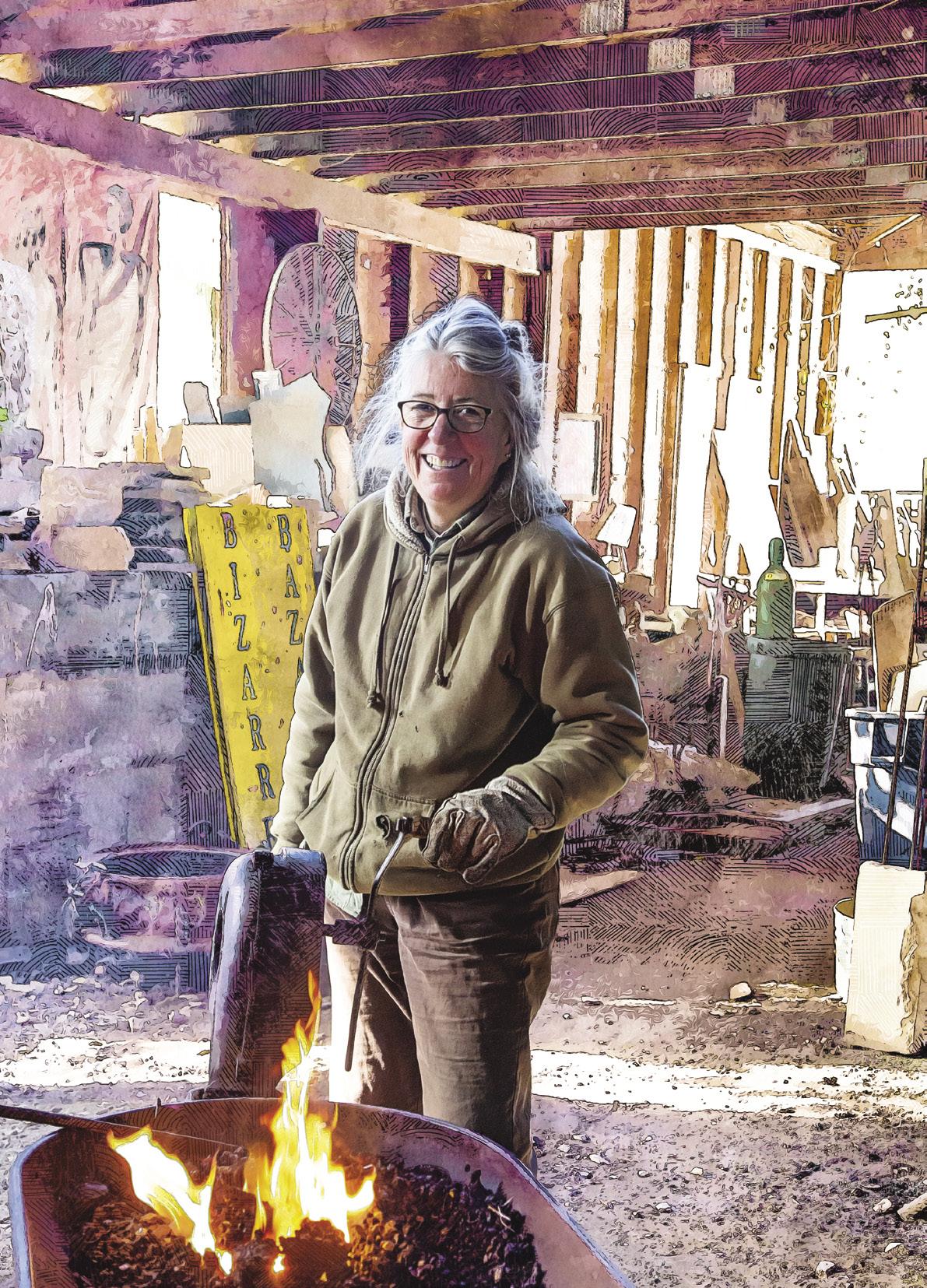
A jack-of-alltrades, Kate Dinneen has her hands in not only her passion for blacksmithing and bike riding, but also acting as a role model to teens through Van Go and volunteering her time with Emergency Management for Douglas County.
Kate Dinneen thinks of various ways of having influence, including wealth or title, or, as she prefers to say, as a connector. Connectors are by definition a person or thing that links two or more things together.
In Author Malcolm Gladwell’s book “The Tipping Point: How Little Things Can Make a Difference,” he describes connectors: “The point about Connectors is that by having a foot in so many different worlds, they have the effect of bringing them all together.” This idea of influence, Dinneen believes, is also directly tied to respect and integrity.
In 1963, Dinneen’s family arrived in Lawrence so her father could teach French and linguistics at the University of Kansas. Her mother began teaching a few years later. She was born overseas in Saigon, Vietnam, where her father was stationed as a translator. When she was growing up, she wanted to be an Olympic ice skater for the Vietnam ice-skating team and planned to join after she received dual citizenship when she turned 18. However, Saigon fell before this time, and she never received dual citizenship. Dinneen has lived in Spain and France, where, because of necessity, she became fluent in Spanish and French. Soon after her return to Lawrence, she discovered an interest in and talent for playing the upright string bass. She played from this point through junior high, high school and college. She performed with the Topeka Symphony for many years as well as in the “Nutcracker” at the Lawrence Arts Center.
At one point, Dinneen discovered her love of biking and was on a path to compete in the 1992 Barcelona Olympic Games as a cyclist. She was a fivetime state champion for road and time trial in Kansas cycling. Additionally, she trained with the Masters national cycling team and rode at the Ore-Ida
Women’s Challenge, a grueling, multiday, multistage challenge race called “The Toughest Women’s Race in History,” by Isabel Best, of Rouleur magazine. Unfortunately, during training for the Olympics, she was hit by a vehicle, sustained injuries and was unable to continue to compete, crushing her second Olympic dreams.
As a cyclist, Dinneen volunteered for Friends of the Lawrence Area Trails (FLAT), which has been working to help create the Lawrence Loop as well as maintain and promote Lawrence area bike trails. She was one of the originators and chair of the board of the organization from 2017 to 2021. FLAT (named so because Lawrence is not flat, as so many people assume of Kansas) says its group “is devoted to developing, promoting and maintaining a robust, accessible trails system serving the diverse people and communities of Douglas County and Northeast Kansas.” The Lawrence Loop, as it is called, is a series of connected paved trails that circles around the city. There are only a few areas left to be finished so the entire loop is connected. When finished, it will be 22 miles long.
In addition to her passions and interests, Dinneen is a full-time blacksmith. She has been part of associations such as Artist Blacksmith’s Association of North America (ABANA) as well as other international associations, and has traveled and worked on blacksmithing projects all over the world. She worked on the Globe Theater Gates, in London, England, and received, along with others, a prestigious Tonypandy Cup award from the Worshipful Company of Blacksmiths.
Because of her love of blacksmithing, connecting and also encouraging others, Dinneen has been volunteering at the creative nonprofit Van Go, which supports and encourages teens in their own creativity. “Using art as the vehicle for self-expression, self-confidence and hope for the future, Van Go empowers young people to create their own vision of success,” according to the Van Go website.
For the last decade, Dinneen has volunteered her time teaching blacksmithing to teens. She knows most of these lessons go deeper than just hammering red hot metal and will help shape teens into healthier, more well-rounded humans. Even if these teens don’t end up using the metal-shaping skills in a trade, they will have a better understanding of and respect for the creative process.
Kristen Malloy, co-executive director of Van Go, confirms, “Kate has been an invaluable part of our Van Go family for almost 10 years, dedicating her time and sharing her many talents with not only the youth in our programs but our agency as a whole. Kate is a very accomplished blacksmith, but she is also an incredible teacher and mentor. Her compassionate character and ability to teach our youth her craft with such care, enthusiasm and intentionality is unparalleled. We are so grateful to Kate for the countless ways she supports Van Go and our entire community.”
Dinneen also hopes to influence future generations by providing practical tools— not just a hammer but ways of dealing with relationships, community and life. One area she believes most of us could improve is our ego. “If you are a good influencer, you will have to deal with ego,” she explains.
In summers, storm-chasing was something some Kansas kids did for fun. At least, it’s what Dinneen did. Eventually, this led her to a volunteer group called SKYWARN, which has locations all over the United States.
According to the National Weather Service, “To obtain critical weather information, the National Weather Service (NWS) established SKYWARN with partner organizations” as its eyes on the ground. Generally connected to the Office of Emergency Management, these volunteer groups are assigned locations or “chase” storms and radio back reports. Technology has changed, but these groups are still a necessary part of early warnings.
After a number of years with SKYWARN, Dinneen was hired by Emergency Management as part of the Federal Emergency Management Agency’s CERT (Community Emergency Response Team) program. “The CERT program educates volunteers about disaster preparedness for the hazards that may occur where they live,” according to FEMA.org. Dinneen has worked her way up during the last 15 years to duty officer and, in addition, the Douglas County CERT manager.
As a duty officer, Dinneen is on call overnights and weekends, so if anything happens requiring additional support and the opening of the operation center, she is contacted first. She could receive a call from dispatch or the incident commander, and if needed, she will contact the director and deputy director. It is important to note that Emergency Management are first responders for weather, but during any other emergency, it acts as a supporting agency. Emergency Management is the connection to the Weather Service and is responsible for watching the weather and sounding the sirens.
Emergency Management acts as support for fun events such as the KU men’s basketball team winning the NCAA National Championship in 2022 and the corresponding crowds that followed downtown, to other emergency events such as

supporting the health department during COVID-19. Dinneen acted as a volunteer and traffic coordinator for 26 mass vaccination events from Jan. 29, 2021, to April 28, 2021, at the Douglas County Fairgrounds.
CERT provides training classes twice a year, once in spring and again in fall. Dinneen says about CERT training programs: “My hope is it helps them influence their friends and family with disaster prep.”
She is currently writing an article for FEMA about the need to provide mental health support systems for volunteers, especially through peer support, as they understand what others in Emergency Management are dealing with. The piece will be the featured article in the FEMA quarterly newsletter. Dinneen continues to be influential in the community in many ways—whatever she sets her mind to. p
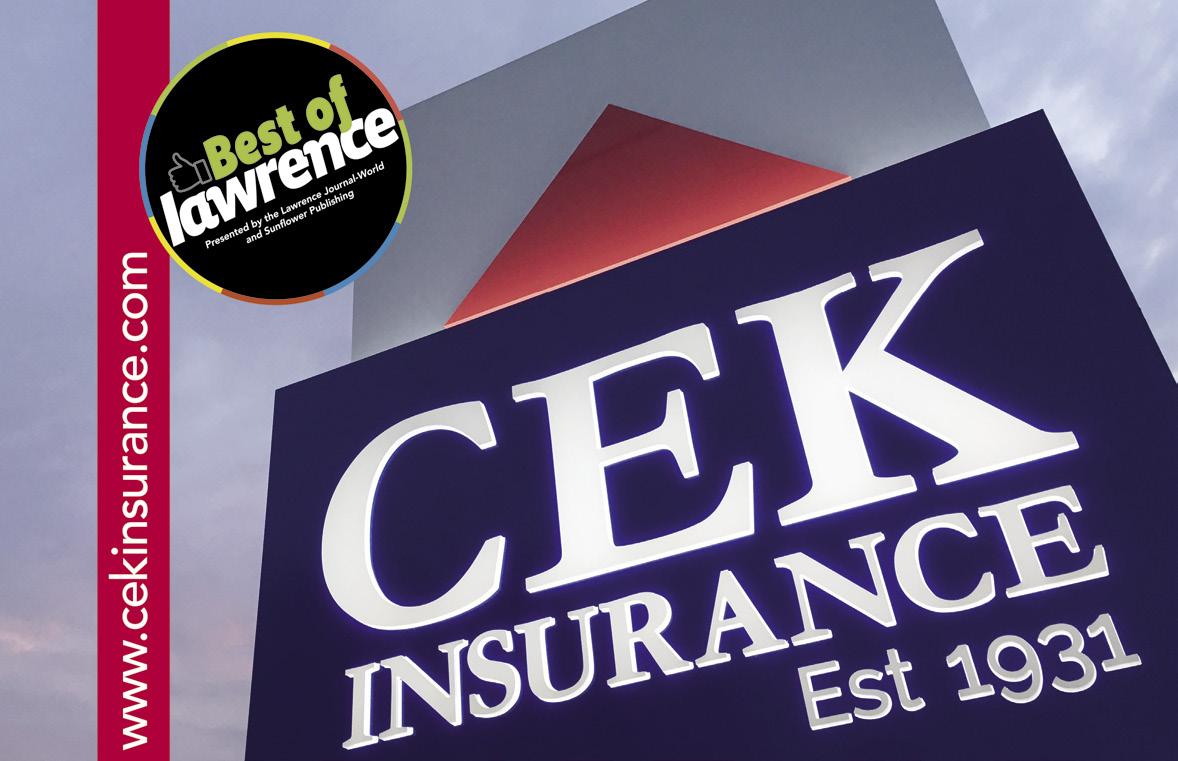

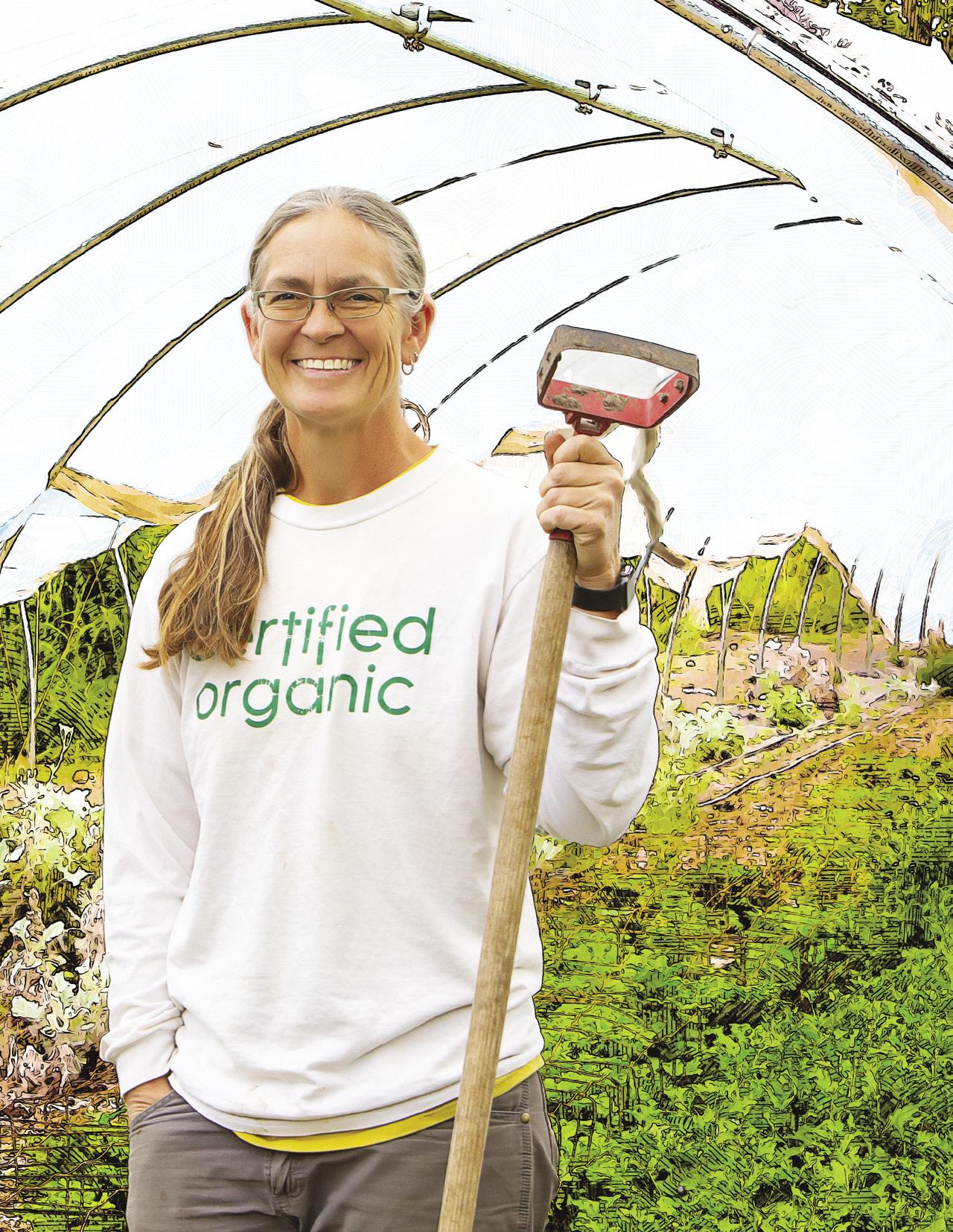
Jill Elmers, Common Harvest CSA, is shaping the local food system with a focus on putting sustainably grown local foods on the plates of Douglas County residents.by Anne Brockhoff, photo by Steven Hertzog
Farming, in the collective imagination, is a solitary enterprise.
Farming, in Jill Elmers’ world, is anything but.
To be sure, Elmers spends plenty of hours working solo on her Moon on the Meadow operation east of Lawrence, near the Lawrence/Douglas County line. But she approaches farming with a spirit of cooperation that prioritizes engagement with producers, organizations, civic and governmental leaders, and others throughout the community.
“I consider myself part of the food system, and that system is made up from all different kinds of people,” Elmers says. “I’m always more interested in collaborative work than in doing something on my own. We can move mountains when we work together.”
Not that it’s easy. Farming is notoriously grueling, and produce growers such as Elmers have little time during the season for anything other than planting, managing, harvesting and marketing their crops. That Elmers has through the years carved out time to serve on numerous organizational and advisory boards, and participated in countless food-policy discussions—all with an eye toward putting more sustainably grown local food on Douglas County plates—is impressive, Kevin Prather says.
“The day-to-day operations (of farming) are pretty all-encompassing,” says Prather, who with his wife, Jessi Asmussen, owns Mellowfields Farm, in Lawrence, and is one of Elmers’ business partners. “But she still makes time for all these other aspects.”
Elmers is originally from St. Louis, and she considers herself a Midwesterner at heart even though her family moved to Dallas when she was a grade-schooler. She earned an electrical engineering degree from Valparaiso University, in Indiana, then worked in Chicago before a newspaper ad for an acoustical design company drew her to Kansas City. She then moved to Lawrence. Elmers didn’t have an agricultural background, but self-sufficiency had always appealed to her. When she had the chance to take a sabbatical, she decided to check “organic farming” off her bucket list by spending a summer working for Mark Lumpe on his Wakarusa Valley Farm, south of Lawrence.
Elmers was hooked. She accepted Lumpe’s offer to continue farming a small parcel of his land and, in 2000, launched Moon on the Meadow. She bought 3½ acres in 2006; a year later, she started a CSA (community-supported agriculture) group. In 2013, she flipped her career to farm full time and do audio-visual design consulting on the side.
“I love growing food, and I love the community around the food system,” Elmers says. “It’s like having your dream job. I wake up most mornings feeling very happy.”
Elmers grows certified organic flowers, tomatoes, beets, greens, potatoes, asparagus, strawberries, cauliflower, peppers, garlic, fennel, ginger and more. Some is planted in open plots; she also has four large high tunnels (unheated, plastic-covered structures sometimes called hoop houses) and seven smaller ones to extend the season and help control for the unpredictable weather that climate change has brought about. Elmers sells much of her harvest at the Lawrence Farmers’ Market, where she has been a vendor for 21 years and now chairs its board of directors.
From that vantage point, Elmers sees how the pandemic and rising inflation affect both producers and consumers. The first sparked increased demand for local food. To meet it, the market has been “recruiting vendors like crazy” and is considering the possibility of a permanent location, she says. The second has some locals relying more regularly on the area’s farms for fresh produce.
“This is the first year ever in my life when people come to the market and say, ‘This is the cheapest place to buy food,’ ” says Elmers, who also offers delivery of online orders within Lawrence city limits. “If we can figure out how to keep (food purchases) here, we’re all going to be better off.”
We. It’s a word Elmers uses a lot when describing her operation, especially when outlining the contributions made by her five seasonal employees. Those workers are often, in fact, apprentices, some of whom she met through the Growing Growers KC program, which connects beginning farmers with established sustainable operations.
“In the farming world, it feels like there’s a lot of competition, and I don’t understand that,” Elmers says. “If I know how to do something, why am I not teaching everyone else? Why are they not teaching me?”
That many of her apprentices have gone on to grow similar products and sell them in the same venues as Moon on the Meadow might worry some people. Not Elmers.
She knows that “people in this area eat way more fruits and vegetables than local producers can grow,” says Tom Buller, who is executive director of the Kansas Rural Center (KRC). “She’s not interested in eliminating the competition but in growing the pie for everybody so we have a bigger local food system.”
He would know. Buller and his wife, Jenny, own Buller Family Farm, in Lawrence, and was one of Elmers’ early apprentices. They became partners when Elmers and the Bullers together purchased 28 acres of land in 2010, enabling both farms to expand. As Elmers’ CSA grew, she diversified its offerings by joining forces with the Bullers and Red Tractor Farm, which was owned by Jessica Pierson (also a former apprentice) and Jen Humphrey.
Those three farms, together with Juniper Hill Farms, launched the Common Harvest CSA and soon added Mellowfields Farm to its list of suppliers. The CSA is still in operation today, although it has evolved. The Bullers now sell all their produce wholesale instead of marketing direct-to-consumer. Pierson and Humphrey are still homesteading on their farm but no longer sell food retail. Juniper Hill has expanded its own retail and wholesale operations, and added on-farm pizza nights and chef’s dinners.
Mellowfields, which grows certified organic produce on the eastern edge of Lawrence, remains Elmers’ Common Harvest CSA partner. The 24-week CSA grew to 125 shares in 2022 and offers “add-ons” from Sweetlove Farm, 1900 Barker, Wild Alive Ferments, South Baldwin Farms, Stirring Soil Farm and Crooked Bar N Ranch. That Elmers has long worked with so many other businesses should come as no surprise, Mellowfields’ Prather says.
“Jill has found (collaboration) to really be an important part of how she proceeds generally in life,” he says.
Nowhere is that more true than in Elmers’ advocacy for a robust local food system that supports food production, processing, distribution, safety, waste disposal, nutrition and equity. Lawrence and Douglas County are unique in that they joined forces to address all those issues more than a decade ago by forming the Douglas County Food Policy Council (DCFPC), making it the first such entity in the state.
“There is such a wide representation of the food system,” Elmers says of the DCFPC, which was established by the Douglas County Board of Commissioners in 2010 and became a joint city-county advisory body in 2013. “People in food sales, restaurant people, farmers, nutritionists, people who work to end food insecurity—it’s a real mix.”
Elmers was an agricultural producer appointee on the council from 2012 to 2017 and served as chair for two of those years. A main priority at the time: creating a countywide food system plan using both hard data and community input. The result: a 10-year plan that was adopted by both the Douglas County Board of Commissioners and Lawrence City Commission in 2017, and addresses everything from the economic vitality of farming and food access to soil and water quality and food-waste reduction.
“Convincing everyone it was really important to have food-system coordination within our county—that was pretty big,” Elmers says.
She worked closely with the food-waste committee, helping to figure out how to collect unsold produce and share it with food pantries. That work spurred formation of Community Organized Gleaners (COG), which in 2020 collected and distributed 2,644 pounds of food from four Lawrence-area farms.
COG in 2021 joined forces with the Lawrence-Douglas County Sustainability Office and After the Harvest, a Kansas City, Missouri-based produce rescue nonprofit, to recover 17,656 pounds of food. A Community Composting and Food Waste grant from the USDA Office of Urban Agriculture financed much of that work, and other partners included the DCFPC, Just Food, The Sunrise Project, Lawrence Community Shelter, University of Kansas Center for Environmental Policy—and Elmers’ Moon on the Meadow.
“Through her leadership, (Elmers) engaged on a remarkable level with all aspects of the food system,” Elizabeth Keever says of working with Elmers on the DCFPF. Keever was, at the time, executive director of Just Food and a fellow DCFPC member; she is now chief development officer at Heartland Community Health Center.
And Elmers didn’t stop there. She and others on the DCFPC worked with city-planning staff to craft an Urban Ag text amendment that better defined urban farms, streamlined the special-use permit process for them and cleared the way for commercial production of crops and some livestock, and on-site sales of unprocessed agricultural products within city limits. The Lawrence City Commission approved that updated language in 2016.
Elmers is also a founding member of The Kansas City Food Hub, a farmer-owned cooperative formed in 2016. It aggregates the production of more than 20 farms within 125 miles of Kansas City, making locally grown produce, eggs, dairy and meats more accessible to restaurants, schools and other wholesale and retail customers throughout the region.
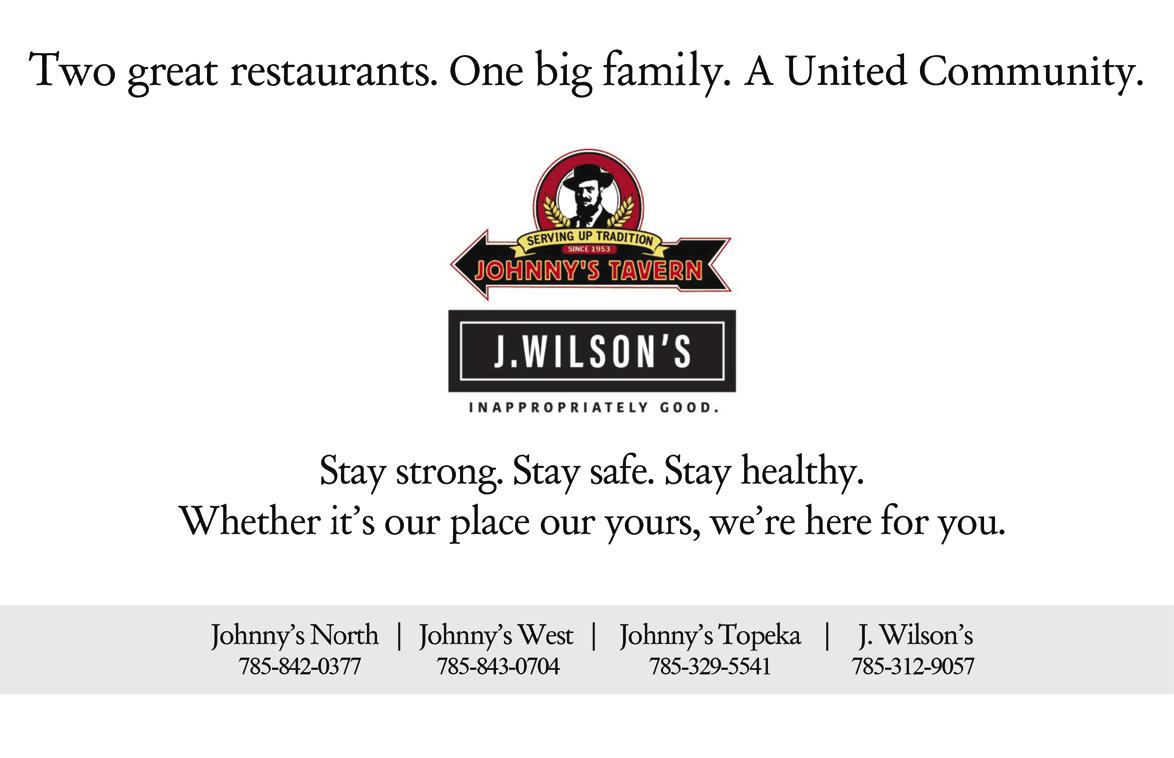
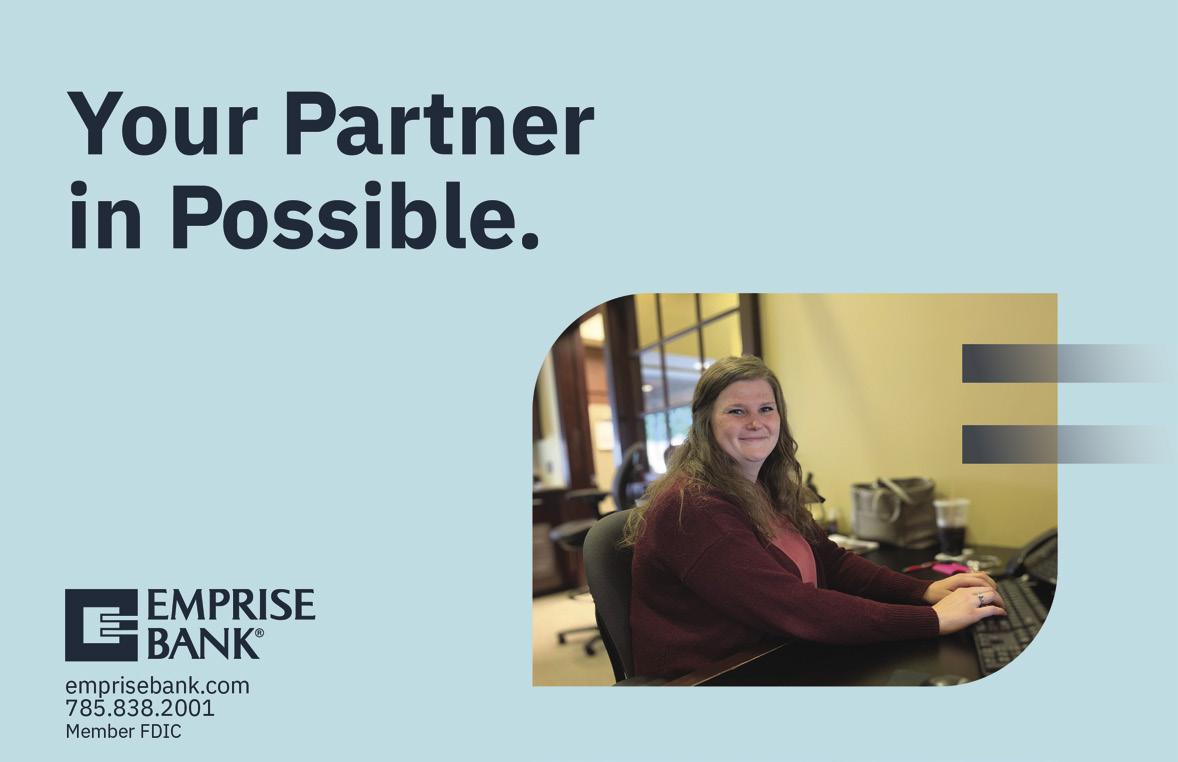
The Sunrise Project also benefited from Elmers’ energy. Programs include community meals and events, a community garden and orchard, a porch pantry and youth programs—all things that bring people of diverse cultures, neighborhoods, ages and socioeconomic statuses together in a former garden center at 15th and Leanard streets, which is now owned by Sunrise Green LLC. Although Elmers is no longer on The Sunrise Project’s board of directors, she’s a neighbor of sorts (Moon on the Meadow leases a greenhouse from Sunrise Green) and remains an enthusiastic supporter.
“(Elmers) has that same generosity of spirit with a lot of her work throughout the food system,” Buller says. “A lot of the time, she’s not just looking out for the best interests of her farm but for the whole community.”
That community is growing larger as Elmers becomes more involved in statewide groups including the Kansas Rural Center. The nonprofit was founded in 1979 and uses education, research and advocacy to support the long-term health of the land and the farms, ranches and communities on which it relies. Elmers has long participated in grant-funded KRC projects (such as high tunnel research, farm-to-school programs and beginning farmer and rancher resources) and joined its board of directors in 2021.
Elmers was also drawn to the Kansas Farmers Union, the state’s oldest active general farm organization, because of its commitment to shaping policies that benefit small farms while fostering sustainability. On a federal level, the National Farmers Union addresses agricultural industry consolidation and monopolies, the Food and Drug Administration’s Food Safety Modernization Act and other policy issues.
Elmers joined the KFU board in 2019 and is a county chair for the northeast Kansas chapter, which holds tours and other events in Douglas, Atchison, Franklin, Jackson, Jefferson, Johnson, Leavenworth, Miami, Osage, Shawnee, and Wyandotte counties. Locally, she works to increase membership and create opportunities for other small farmers.
Expanding the local farm base is essential, Elmers says, as climate change and economic uncertainty disrupt existing food production and distribution channels. Weather extremes such as the extended drought in California will make it harder for farmers there to reliably grow commercial produce, while high shipping costs and supply chain
issues affect distribution of what is grown. Rising interest rates, inflation, environmental worries, geopolitical instability and other factors will likely further impact the food industry. The solution?
“We need to get more of our food from Douglas County,” which means the county needs to attract more farmers committed to using sustainable practices, Elmers says.
The 2017 Census of Agriculture (the most recent year for which statistics are available; new data will be released in 2024) did show a slight uptick in the county’s farm numbers, from 945 in 2012 to 998 in 2017. But many of those are traditional grain and beef cattle operations where the cost of land and equipment pose formidable barriers to entry.
Kansas farmers are getting older, too. In 2017, their average age was 58, and only 0.01 percent were under the age of 35. That statistic doesn’t reveal how many of any age are new to the industry because the state numbers don’t distinguish between young and beginning farmers, however the 2017 Census shows that 27 percent of the country’s 3.4 million producers had been farming for 10 years or less.
What’s all that mean for Douglas County? That while there’s plenty of demand for local food here, Elmers isn’t sure who will be growing it.
“I’m in the process of learning what that next generation of farms looks like” she says. “I don’t think they look like what we see now.”
They might be urban or micro farms or something entirely different, operated by people in their 20s and 30s who want a more balanced lifestyle than agriculture typically allows for.
“Farming is hard work. It’s not a glamorous life,” Elmers says. “I think we’re going to have more small farms, and a lot of them, so people can have that work-life balance.”
Whatever their aspirations, Elmers wants to assist beginners by transitioning Moon on the Meadow into a teaching farm over the next three years. While she’s still working out how to do that, Elmers is certain about one thing: more local food is good for consumers, farmers and the region’s economy because it keeps dollars circulating in Lawrence and Douglas County.
“The local economy we have is thriving, and I want to keep it that way,” she says. “It’s amazing to watch the dollars stay.” p
Christina Haswood sees her role as a Kansas State House Representative as not only helping to shape state politics and policy, but also to represent the values of Indigenous Americans. A child of parents from the Navajo Reservation, Haswood operates from the belief that making an impact means working in good faith to be part of a solution to an issue, to leave the community better than when you arrived. Her background in public health has focused on removing or reducing barriers, for her, focusing on those Indigenous people find when leaving the reservation. She’s been a warrior for civil rights for all Indigenous people and works tirelessly in the state legislature to make lives better for her people.
My mentor is Kansas State Rep. Dr. Ponka-We Victors-Cozad who is the first Native American woman to be elected into the Kansas State Legislature. She recruited me to run for office and has been my mentor ever since. She has taught me the ropes of becoming a politician while still holding our Indigenous values.
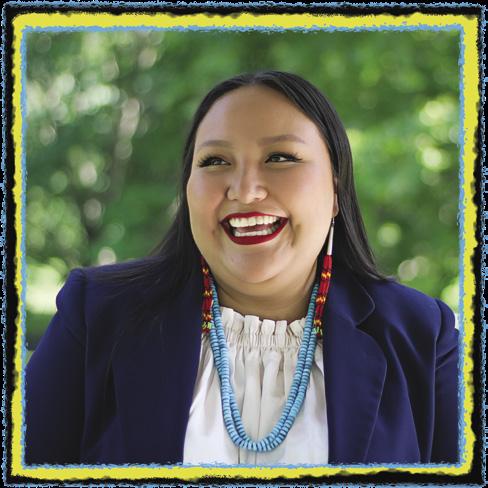
My role models would have to be my parents. They came from the Navajo Reservation at a young age and made the tough decision to raise my brother and me off the reservation for a better life and opportunities. They taught me hard work and perseverance which have been key players in my accomplishments in life.
Perseverance has been a key part of my story. I have failed so many times from classes to not getting a specific internship or job. When I wanted to give up, my parents would lecture me to not or when to redirect to a new path. This life lesson is a great skill in politics where it is hard to get bills passed on the first try though you can not give up the fight.
Making an impact means, that you are a part of the solution to an issue, doing more good than harm, in good faith.
(I made a decision to make an impact), as my background is in public health, it is a profession where we want to improve our communities by reducing barriers. This goal to help people came from me realizing as an urban Indigenous person, I have fewer barriers to those who grew up on a reservation. I always wondered why my school was able to teach me to play the violin in 7th grade when my cousins on the rez did not have that option. This realization really hit me when I was at Haskell Indian Nations University and saw that health issues such as diabetes were still prevalent to us Natives even if we lived on or off the reservation. There are multiple obstacles we all have to overcome as Indigenous peoples and many were the cause of U.S. policy trying to kill us off - genocide. I took an American Indian Movement (AIM) class at Arizona State University and learned about the fight for our civil rights - which is not often taught about or widely known. If you look through U.S. History and American Indian Law, you will see shocking things such as Native Americans did not gain U.S. citizenship until 1924 and the American Indian Religious Freedom Act did not get signed until 1978, just 44 years ago. All of this angered me and I knew I had to get to 'the table' to continue advocating for my people.
My earliest recall of what I wanted to be when I grew up was when I was about 5 or 6, I wanted to be a police officer. Then, I learned how to make cupcakes and wanted to be a pastry chef. In high school, I started to appreciate health and medicine then followed that path to public health. I knew I wanted to improve the wellness of my community but did not envision myself to be a policymaker until I met Rep. Dr. Ponka-We Victors-Cozad and saw Congresswoman Sharice Davids and Deb Haaland (now Secretary of the Interior) win their race. Running for office became a possibility and seeing other young folks run and win for office gave me the confidence to know I want to run for office one day but I always thought it would be after I get a PhD or when I was in my 40's. The opportunity came knocking during my last semester in graduate school just before finals week and I accepted.
I would like to see the healing of our country and community with compassion. Embracing our diversities and taking care of one another, has the power to save lives. r
“Memories of our lives, of our works and our deeds will continue in others.”
– Rosa Parks
With a passion for health equity, Erica Hill has gone above and beyond to ensure all community members are afforded the right of good health without fear of being denied because of their consequences, poverty or discrimination.
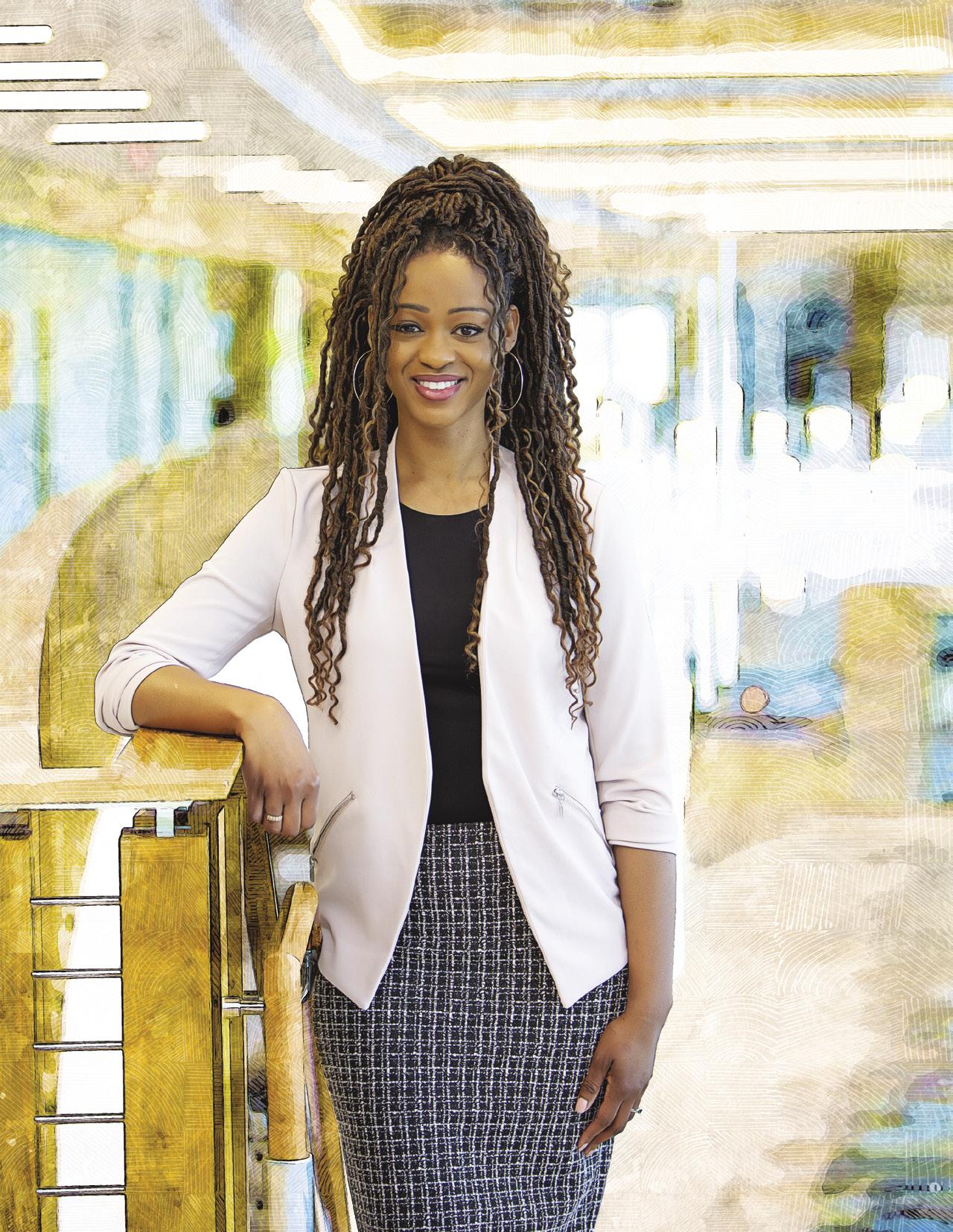 by Anne Brockhoff, photo by Steven Hertzog
by Anne Brockhoff, photo by Steven Hertzog
The pandemic, race, schools—they’re all headline issues that local leaders are striving to address.
Among those leaders is Erica Hill, a health-equity advocate whose collaborative work in health care, philanthropy and education is helping build a stronger Lawrence.
“She is passionate, and she spreads that passion,” says Sheryle D’Amico, LMH Health’s senior vice president for clinical integration.
That’s most obvious at LMH Health, where Hill is director of Health Equity, Inclusion and Diversity, and at the LMH Health Foundation, where she is director of finance and strategic initiatives. But she is also past president of the Lawrence Public Schools USD 497 Board of Education and a member of the Lawrence-Douglas County Public Health Board, Heartland Regional Health Equity Council and numerous other boards and organizations. Her goal: to remove barriers to health wherever they exist.
“Equity work goes way beyond the four walls of a hospital. It goes way beyond the four walls of a school building. It’s a community effort,” Hill says.
Health equity means that everyone has a fair and just opportunity to be as healthy as possible without constraints such as poverty and discrimination, or their consequences, including lack of access to jobs, education, housing, safe environments and health care, according to the Robert Wood Johnson Foundation, the nation’s largest philanthropy dedicated solely to health.
It’s not an entirely new idea, according
to a 2019 study published by the International Journal for Equity in Health. References to health-equity studies date back to 1801, and the World Health Organization and United Nations General Assembly in the 1940s asserted that “every human being is entitled to the highest attainable standard of health without the distinction of race, religion, political belief, economic or social condition.” The phrase “health and equity” was first used in a scientific article in 1966; studies on health equity began accelerating in 1990, the study says.
Hill herself became aware of it while pursuing a master’s degree in healthcare leadership from Friends University. She’d already earned a degree in human biology from the University of Kansas in 2003 and moved back to Lawrence in 2012 to continue her studies. When she began researching Black maternal health for a project, she was taken aback by statistics showing that Black women have higher rates of poor outcomes when diagnosed with breast cancer, even when studies controlled for income and other factors.
“It’s about so much more than access,” Hill says. “That’s what piqued my interest.”
Hill wanted more direct experience in the health-care industry, so she began volunteering at the LMH Health Foundation in 2013. When the foundation hired her in October of that year, Hill immediately impressed her new colleagues, D’Amico says.
“What I really appreciated was her vision, her confidence and her leadership,” says D’Amico, who is Hill’s friend and mentor. “She thinks about the community, the future, the kids. She thinks about those who might be left behind by any decisions that are being made.”
Hill held several positions at the foundation before being named director of finance and strategic initiatives,
where she develops ways of advancing health equity through philanthropy. She builds on already-established programs such as the Help and Healing fund (which assists patients with financial barriers to care) and the Catch a Break Fund (which helps cancer patients and survivors pay for day-to-day needs), and brings health equity to the forefront.
Research increasingly shows that’s necessary. According to the Lawrence-Douglas County Health Department’s 2021 Health Equity Report, outside factors known as social determinants of health greatly impact health outcomes. These include economic stability, education access and quality, health-care access and quality, built environment (factors such as housing and crime) and social and community context (discrimination because of identity, resilience and social cohesion, and levels of incarceration).
“A majority of what impacts someone’s health happens outside of the hospital,” says Hill, who in 2019 was named one of the Association for Healthcare Philanthropy’s “40 Under 40” award winners. “Education, access to food and housing, where you live and if there are sidewalks there … all those types of things are external factors of what makes someone healthy. People are starting to understand that now.”
LMH Health has long worked to help patients address those factors and, in 2014, hired the Rev. Verdell Taylor as its Inclusion, Diversity and Equity (IDE) manager. Taylor is also a former LMH Health trustee and former pastor of St. Luke African Methodist Episcopal Church, in Lawrence. As Taylor began updating LMH Health’s health-equity mission, he says Hill immediately volunteered to help.
“She was there from the beginning,” he says.
Hill served on committees, offered administrative support and helped develop programming. When LMH Health created the director of health equity and inclusion position in 2020, Hill was a natural fit for the role. She now works with Taylor to expand IDE opportunities for both hospital employees and the community, and reports directly to LMH Health President and CEO Russ Johnson.
“We collaborate on everything that deals with IDE work,” Taylor says of Hill. “It’s wonderful to have a person who believes in it and is part of the work.”
Their goal is to instill equity throughout the entire LMH Health system, something that overlaps with Hill’s continued role at the LMH Health Foundation. Some efforts are hospital-focused, such as creating a recent series of workshops on eliminating implicit bias in medical documentation. Hill also provides leadership in various groups, including the Community Health Equity Advocacy Council, an LMH Health-hosted advisory body, and Health Equity Impact Advisors, which make recommendations to senior leadership on IDE issues.
“When making decisions—like a change in human resources policy, opening a new building or eliminating a service—the team that is responsible for leading those discussions and decisions will include an Equity Impact Advisory member at the table from the very beginning,” D’Amico says.
Hill also co-chairs LMH Health’s Health Equity Advancement Team (HEAT), an interdisciplinary team of physicians, staff, administrators and others who strive to create an inclusive, equitable clinical environment along with the necessary infrastructure for eliminating health-care disparities.
“We make data-driven decisions, so when we have that data about our community and see that X, Y and Z are issues, we as a hospital system can then ask, ‘What can we do to alleviate this?’ ” says Hill, who draws frequently on her experiences as a member of the Lawrence Chamber of Commerce’s 2018 Leadership Lawrence class.
Hill has also participated in the Kansas Leadership Center’s “Your Leadership Edge” training program since 2017; she’ll complete the third stage of that this year. Such experiences have proven vital, Hill says, because health equity poses what she calls adaptive challenges. Unlike technical challenges (such as a broken arm), these are broader, more complex factors (like race, ethnicity, gender and income) that greatly impact health.
“It’s not clear-cut, and it’s not easy,” Hill says.
LMH Health in 2021 updated its Health Equity Advancement Strategy to establish operational pathways for staff and medical providers to infuse health equity in their day-to-day activities. The hospital also applies its health-equity assessment tool to every project, decision or policy discussion to better examine who benefits or is disadvantaged by potential changes, and how to mitigate possible adverse outcomes. Continued collaboration between LMH Health and its community partners is also key to expanding health equity, Hill says. And Hill, herself, has proven influential in those efforts, D’Amico says.
“She has a gift of being able to have people with disparate beliefs work together and pull toward a common vision,” she adds.
Nowhere is that more evident than in the LMH Health Summer Leadership Academy, which launched in 2019. The academy introduces high school sophomores, juniors and seniors to careers in health-care administration, medicine and allied health through paid summer internships. These engage students in leadership and health care, help them explore and prepare for post-secondary programs and careers, allow them to make professional connections and offer volunteer and scholarship opportunities.
It’s a comprehensive experience that includes everything from shopping for professional attire (donors cover the cost) and learning how to behave at a lunch to providing them with letters of recommendation. That assistance doesn’t end when summer does, either. Hill says most students and mentors have ongoing relationships, and her bulletin board is filled with notes and letters she’s received from past participants.
“Of everything I’ve done, I am really proud of that program,” says Hill, who was invited to deliver a presentation on the academy during the National School Boards Association’s 2023 annual conference. “We have been able to really help students in our community.”
Help, however, isn’t a strong enough word for Dr. Anthony Lewis, superintendent of schools for USD 497, which partners with LMH Health and the LMH Health Foundation.
“The work Erica is doing with the Leadership Academy is literally lifechanging for students and their families,” Lewis says. “This is her legacy work.”
Hill first connected with Lewis while he was conducting “listening and learning” tours in the community shortly after he was hired as superintendent in 2018. Hill, who lives in Lawrence with her husband and two children, was at the time a member of the Parents of Color Advisory Team (it was then called the District Equity Leadership Team Advisory) and other groups, and president of the Boys & Girls Club of Lawrence.
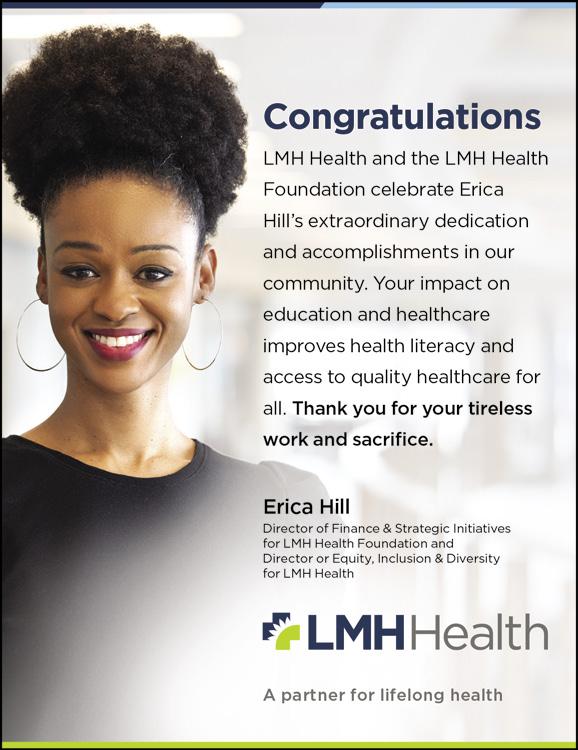
“Even then she was coming out to make sure her voice was heard in that space,” Lewis recalls.
Hill then upped the ante by winning a seat on the school board in 2020—just in time for COVID-19. The board focused immediately on crafting and managing the districtwide response to the pandemic; the budgetary shortfall that followed posed another challenge.

“To cut $6.4 million out of the budget is not an easy thing in a community like Lawrence, where there is a lot of engagement, and there are a lot of opinions,” Lewis says. “She handled that with a lot of grace.”
Even while grappling with such issues, Hill “always centered equity at the front of every decision,” Lewis says.
The board has in recent years introduced an equity policy to ensure student outcomes are not predicated on race, socioeconomic status, disability or other factors that are often marginalized, and it uses an equity analysis impact tool in decision-making.

Hill took all that in, listened to other perspectives, asked pertinent questions and then brought people together to consider solutions. It’s a quiet but effective approach, Lewis says.
“She is what I would call a velvet crowbar,” Lewis says. “She can get the work done in a subtle, soft way, even though she’s a very strong and fierce individual.”
That’s because Hill believes that inclusion is an essential element of health equity, and she counts among her favorite quotes one often attributed to Maya Angelou: “ … people will never forget how you made them feel.”
“That is so important. We need to do the work, but truly, it’s about people having a sense of belonging,” Hill says. “That unity and togetherness—as a leader, I want to create that type of environment.” p
Longtime teacher and administrator, Cynthia Johnson, overcame major obstacles throughout her life and is now devoted to making sure her students thrive in their educations and ultimately reach their full potential.
 by Tara Trenary, photo by Steven Hertzog
by Tara Trenary, photo by Steven Hertzog
In 1987, the Raytown School District, in Missouri, hired a new speech and debate teacher. At that time, she was the only black teacher in the building. “A lot of African American students gravitated to her because she was the first teacher who looked like us in the building,” relates Rodney Watson, executive director of Region 4 Education Service Center, in Houston. One day after school, this new teacher stayed late to work with her debate students, who had a competition coming up. She tried to get control of a classroom full of rambunctious teens, but nothing she did seemed to work. The teacher contacted each of the teen’s parents, who were less than thrilled.
“She wanted us to want it,” explains Watson, a student in the classroom that day. “There’s a time and a place for everything, and that’s what we learned that day.”
Even though this was her first job out of college, Cynthia Johnson, current executive director of inclusion, engagement and belonging with USD 497, was not one to play around when it was time to learn. The kids in her debate class learned that the hard way, but none of them ever forgot it. Four or five of those debate students remain in touch today, and they still laugh about that day, Watson says. “She wanted us to be good; she cared.”
As a child, Watson had a stutter, and Johnson helped him overcome that. He says he would not be able to do what he does today, including giving speeches regularly, if it was not for her. “She helped me work through slowing down, concentrating, giving
me strategies. She’s great at seeing the potential in people, being able to bring out in people what they’re good at,” he explains. During his high school career, Watson qualified for nationals and earned a fourth-place ranking in prose interpretation.
Johnson didn’t have to dig too deep to find the passion she needed to help him. She also stuttered as a child. It was so bad at times that people could not understand her. “My mother taught me how to sing to overcome stuttering. I always say that God gave me my voice as an instrument, but Mama taught me how to use it,” she says.
Watson’s parents died four years ago, his mother soon after his father. Unbeknownst to him, his mother had called Johnson several months before she died to ask her to help her grandson (Watson’s son), who had just started in speech and debate. She said to Johnson, “Help him the way you helped Rodney.” She promised his mother she would.
IIn 2019, Anthony Lewis, superintendent of Lawrence Public Schools, asked Johnson to visit the district, after which he offered her the opportunity to serve as interim principal at Lawrence High School (LHS) and colead the seven-phase construction/ renovation project, a significant part of the $87-million bond issue Lawrence voters approved in 2017.
“LHS marked the fifth multimillion-dollar construction project I co-led during my professional career,” Johnson explains. The five projects together totaled approximately $140 million.
“Having a seat at the table during construction allowed me to serve the LHS students, staff, families and the community. Creating an environment for the Chesty Lions’ students and staff to learn, teach and grow was important.”
After much positive feedback from colleagues, students and parents about her leadership during this transition, Lewis asked Johnson to stay on the next year to continue to help them through completion of the construction.
Although her childhood was full of faith and love, Johnson grew up in extreme poverty; the water and gas were turned off often. Her family had a small kerosene heater to keep the house warm, but it did not work well. At the beginning of each month, she would go with her mother to stand in line for food. “My family didn’t have much financially,” she says. “However, we had a love for one another and others. Also, our faith in God is what sustained us from day to day.”
One thing Johnson wanted as a child but never obtained was a box of 64 crayons. At the time, they only received eight crayons on the welfare system. “I thought only the rich, white students had the boxes of 64 crayons with the sharpener on the back,” she remembers. “Although my family could not afford this item when I was a child, I made sure to purchase a box when I became an educator. To this day, I always have a box of 64 crayons on my desk to remind me of my journey of overcoming obstacles.”
Johnson’s parents were bused 60 miles a day to C.C. Hubbard High School, in Missouri, because of the color of their skin. Segregation kept them from attending a high school with others who didn’t look like them.
“I was blessed to become an administrator years later at the same school they could not walk in front of,” she explains. “I proudly walked down the halls for my parents and others who could not attend that school in the past.”
As a child, her father taught her how to kneel and pray, and her mother taught her how to sing to overcome her stuttering. “My parents knew that if I could pray and sing, I would always have a prayer in my heart and a song on my lips,” she says.

Johnson looked up to activists who lived and served during the Civil Rights Movement. “Rosa Parks was my favorite hero. Because she sat down on Dec. 1, 1955, and refused to give up her seat. Because of what Mrs. Parks did on that day in December, I was able to stand up years later and am still standing today.”
In 1977, when Johnson was in seventh grade, her English and drama teacher, Ken Bell, asked her to join speech and forensics. “At first, I thought he was crazy because I stuttered badly and was quiet in class,” she explains. He gave Johnson her first script, “In White America,” by Martin B. Duberman, a documentary about what it is like to be black in white America. “One of the excerpts in the story … is the story of how Elizabeth walked through the taunting crowd as she tried to make it to Central High School … ” she says. “This scene was why I fell in love with the historical perspective of the Civil Rights Movement.”
With Bell’s help, Johnson went to her first competition, held at the same school her parents were not allowed to attend, and won first place. This experience led her to become a forensic teacher, coach and professional speaker. “The ‘In White America’ script was one that I began reenacting in junior high school, and I still reenact this scene … today.”
Johnson earned a bachelor’s degree in education and speech communication, theater and special education from Central Missouri State University. She also earned a master’s of education in secondary administration and a doctorate in educational leadership, concentrating on school connectedness, building relationships and closing the academic/achievement gap, from Baker University.
She’s served 35 years as a high school speech, forensics and special education teacher; middle/high school principal, elementary principal leadership coach and district-level project leader in Missouri. She has also worked as an independent national educational consultant, facilitating professional development in more than 40 states.
During her very first job at age 14, working at Central Missouri State University as a cafeteria worker, Johnson was sure she was going to continue down this path. “I had watched my parents work at the university … but
God had a different plan for my life,” she says. Today, her career path is still about service, as it was back then. But when she visits schools, “I always visit the cafeteria staff to tell them what they do is essential so I can remember where I started.”
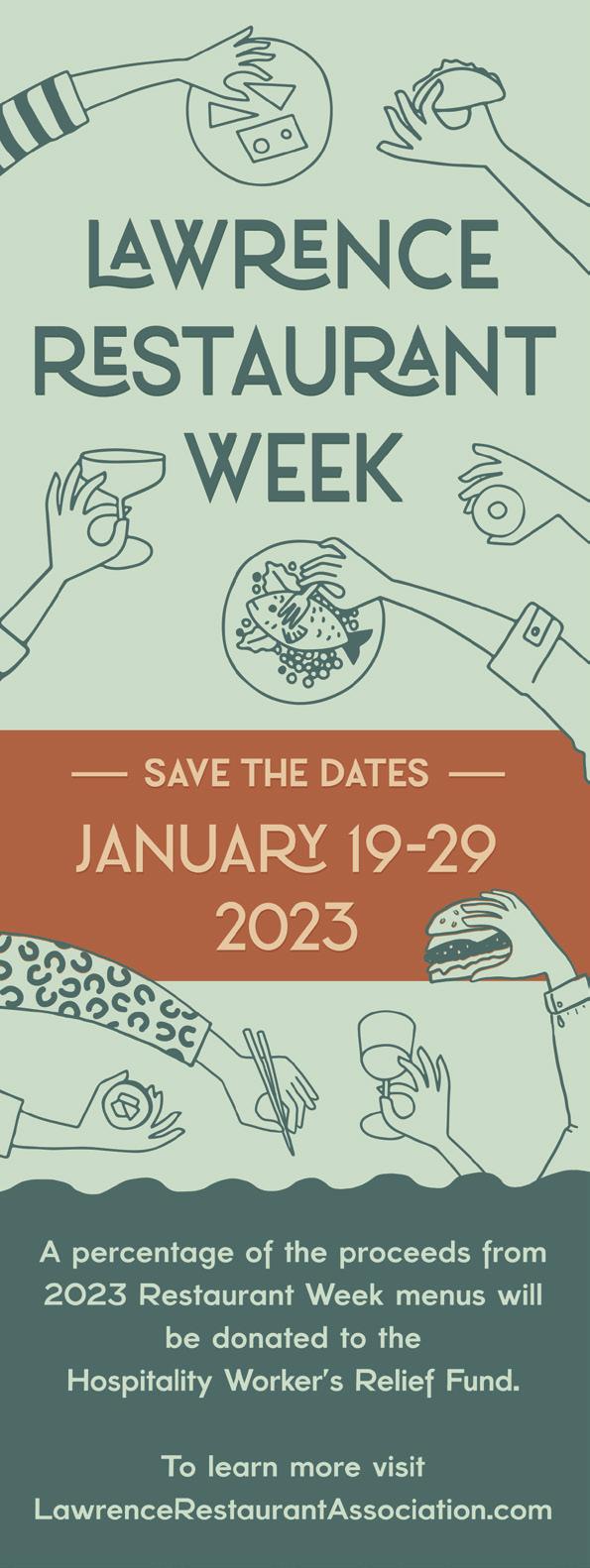
Johnson’s current role with USD 497, executive director of inclusion, engagement and belonging, is a combination of her life’s work. She works with the Executive Leadership Team, Native American Student Services Coordinator, Mental Health Coordinator, Lead Principals, Teaching and Learning Department, building principals, educators, students and families. Her main focus is to lead the district equity work, which includes ensuring all students have access and opportunities, and are representative of all populations so they can reach successful outcomes. It has provided Johnson yet another opportunity to reach, teach, lead and succeed with today’s youth, she explains. “My role as an educational leader is important to the community because the students in our schools today will be the same ones living and working in our community tomorrow. There is no greater joy than working with children of all ages and seeing them become adults.”
“She works very well with children of all ages,” says Bruce Kerr, commissioner on the board of Platte County, Missouri, retired highway patrolman and former colleague of Johnson’s. He believes it’s her goal to give them the best of herself and to make each child feel valued and supported in their educational endeavors. “Johnson is always helping other people, and it’s important to her to always help somebody else whenever she can. She cares very much for others, and again, whatever her hands seem to touch turns to gold.”
For Johnson, not everyone has been supportive along her journey. At 5 years old, Johnson remembers teachers starting to talk about her stuttering. The older she got, the more they talked—about her inability to read aloud, being placed in special classes, living in poverty. “Many people liked me but didn't believe I would ever achieve anything,” she says.
They said she wouldn’t make it because she came from impoverished conditions, she says. Because she stuttered so badly one could hardly understand the words that came out of her mouth; because she couldn’t read aloud until the fourth grade and struggled with reading throughout high school; because she was placed in special classes until the 10th grade even though she begged to attend “regular” classes. “Everything around me seemed to say, ‘No, she can’t,’ and ‘No, she won’t.’ But I stood up one day and said, ‘Yes, I can, and yes, I will!’
“Yes,
“My greatest accomplishment is not believing what others (educators and classmates) said about me growing up,” Johnson explains. “Earning a doctorate was to show me that I didn’t have to live down to the level that people thought about me.”
Still today, she faces obstacles, but the way she views them and handles them has changed. “When people try to impede my journey because of the color of my skin, those who are intimidated by a strong African American woman, and those who try to make me feel inferior or less than others: None of these obstacles have stopped God's plan for my life,” she says. “I have learned to turn obstacles into opportunities with my faith in God.”
Johnson loves spending time with her husband of 28 years, reading the Bible and Christian literature, and listening to sermons, inspirational speakers and gospel music. She volunteers as part of her ministry to encourage others through singing. “I share my gift of singing with those who are sick and shut in, those in the hospital and those who may need help but don’t know how to express it,” she says. “I love all types of music, but the church's hymns bring me tremendous peace.”
Johnson has no children of her own but feels she has been blessed with a heart to love all children. “My students have always been like my children,” she says. “My nickname is ‘Mama J.’ This is a name given to me by students during my student teaching and is still how students refer to me today.”
She sees her role as building relationships with students, helping them learn the essential skills to be fully equipped to navigate their futures and letting them know they have the power to be great. She believes if
students turned this idea into action, they would unleash their power to reach their highest level.
“I describe myself as a woman with a message of hope. Hope awakens the spirit and nurtures the soul. Hope keeps you moving forward when the world's pressures try to hold you back. Hope gets you through the tough times when you want to give up. Hope gives you something to look forward to even when you don’t know what to do. Hope lifts a bowed head when despair tries to steal your joy. Hope is what I have for students as they transition from the different grade levels and through this life,” Johnson explains.
She says she loves lifting students to a higher level. “As educators, I believe we have the power to lift every student.” What she does not like about what she does in education is witnessing others wound the spirits of children. “For some youth, school is the only place they can feel as if they belong.”
Felecia Andrews, business/career education teacher with Hickman Mills Schools, in Missouri, and Johnson’s colleague, agrees. “When I think of Cynthia ‘Mama J’ Johnson, I think of a phenomenal woman, full of faith, love and hope. She has a passion for learning and … educating others, letting them know that there is no learning goal that cannot be reached, no matter what obstacles they face. ‘Mama J’ is not just a name but a term of endearment, and she inspires every person she encounters.”
Johnson says her passion is speaking life into students and helping them reach their full potential and purpose. “I envision myself serving in the educational arena as long as God gives me the strength to do so. My journey includes multiple avenues to use all that God has given me to help others, especially youth. There are students in this world who still need a ‘Mama J.’” p
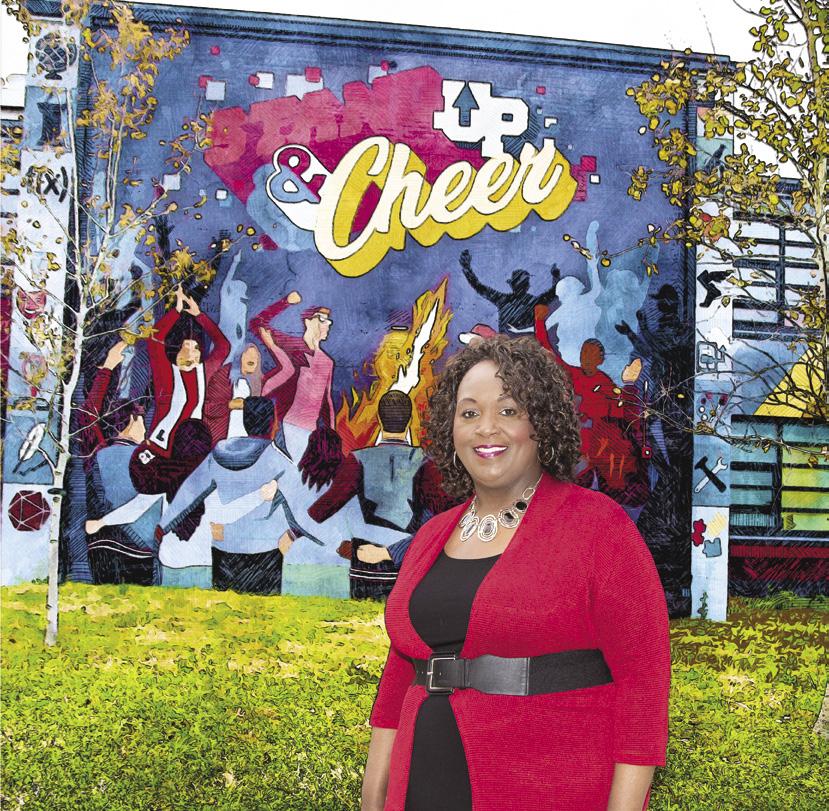


 by JBob Luder, photo by Steven Hertzog
by JBob Luder, photo by Steven Hertzog
An activist for people with disabilities, Dot Nary works to eliminate disparities in housing, health care, transportation and recreation, and create a more inclusive community so the disabled can thrive in a society that often rejects them.
The way Dot Nary sees it, her tireless work over the last three decades advocating for the rights and collective dignity of disabled people was inevitable.
“Activism was part of the work,” says Nary, who’s used a wheelchair the last 30 years because of a congenital condition. “I worked in several (independent living centers) in New York in the 1990s, and becoming active and an advocate for disabled people came along with that.”
Nary brought her work and activism to Lawrence in the late ’90s, taking an opportunity to complete graduate work at the University of Kansas (KU). And the local disabled community has been the better for it ever since.
Soon after arriving, she served on the board of directors for Independence Inc., an independent living center in Lawrence with a mission of maximizing independence among people with disabilities through advocacy, peer support, training, transportation and community education. When she wasn’t working with local government on issues of acceptance of disabled people as contributing members of the community or access of various buildings and businesses throughout town, she was involved with research on healthcare accessibility and quality of life for disabled people, and eliminating health disparities as an assistant research professor at KU’s Research and Training Center (RTC) on Independent Living, a role she retired from last December.
“Dot has always had a great sense of justice,” says Martha Hodgesmith, J.D., a retired lawyer who worked with Nary for 15 years at
the RTC. “It’s personal for her, but in a way that translates into advocacy and research. Live life as full as you can, then layer academics and career, and it leads to advocacy.
“Dot has a real commitment that the health industrial complex meets the needs of all for all ages. With the (COVID-19) pandemic, her advocacy is even more important, because long COVID has brought home the impact of long-term disabilities.”
Nary grew up the youngest of four children in Pawtucket, Rhode Island. She was born with spina bifida, a birth defect in the spinal column that, while not progressive itself, can be accompanied by conditions that can lead to limitations with mobility and function.
She walked and had few limitations through her preteen and teen years, but as she approached her 20s, she found getting around more and more difficult. She enrolled at Emmanuel College, in Boston, but dropped out her first year because she was having trouble walking.
“I progressed to braces, then crutches,” says Nary, who finished undergraduate work at Rhode Island College, in Providence. “My 20s were very difficult. I was falling all the time, and I had to have toes amputated.”
A turning point, she says, occurred when she discovered a movement that encouraged her to use a wheelchair without feeling inadequate or bad about herself. “Getting into a chair represented freedom to me,” Nary says. “I got to meet role models who were in
wheelchairs. My role models up to that time were people in nursing homes or Jill Kinmont, an Olympic skier who was left paralyzed from a skiing accident.”
“I got married at 30, lived in upstate New York. I started working with my peers in the disabled community and met others who were dealing with what I was going through, and it was life-changing,” she explains.
Nary became further involved in political issues involving disability rights. She remembers traveling to Washington, D.C., and not being able to get into her congressman’s office because it wasn’t wheelchair accessible, she says.
Eventually, she played a role in the advocating for the Americans with Disabilities Act (ADA), a 1990 landmark civil rights legislation prohibiting discrimination based on disability.
“I was invited to attend the signing in the White House Rose Garden but couldn’t go because I was having surgery,” she says.
In 1996, Nary and her husband, Norm White, also disabled, made the huge decision to uproot from their East Coast roots and move to the middle of the country.
“I had the opportunity to work with an advisor in disability research here at KU,” says Nary, who achieved a master’s degree and Ph.D. from the University in human development and child psychology. White worked at several independent living centers and then for the State of Kansas at both the Kansas Department of Health and Environment and the Department for Children and Families. He’s also recently retired.
Nary spent the last 25 years working mostly in research at KU’s RTC on Independent Living, learning ways and means to eliminate health disparities, increase independent living opportunities for persons with disabilities, teach advocacy skills and transform the Lawrence community for the better. She also taught as an adjunct professor at Rockhurst University, in Kansas City, and Washburn, in Topeka. She’s had numerous papers published in academic journals.
One of Nary’s most recent projects was a collaboration with the Lawrence Parks and Recreation Department and other key partners to create awareness of trails in the Lawrence area that are most “inviting” for people with mobility impairments and disabilities.
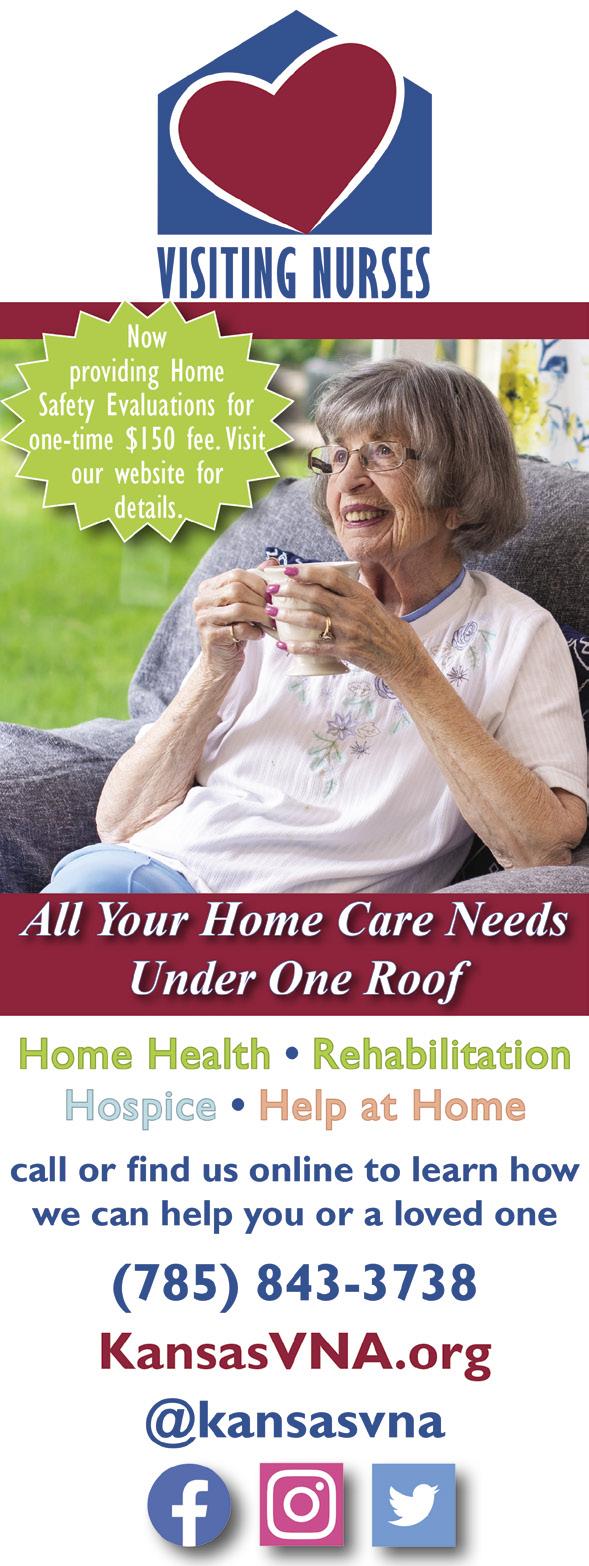
“We created a map of the (Lawrence) Loop to show the most accessible routes,” she says.
“Dot is respected by community members for her subject matter expertise on accessibility, her ability to work well with people and to find workable solutions to complex problems, and for her passion for making our community a better place to live for everyone regardless of their identities and abilities,” says Chris Tilden, who’s worked with Nary on many various workgroups and coalitions in town. “She is tireless and has made so many contributions to this community that it is hard to count.”
Nary says she has several points of emphasis she likes to focus on in her work. It’s estimated one in four persons experience a disability of some sort, and most will experience some form of disability—temporary or permanent—at some point in their lives. Disability is a broad term, she says, making the disabled community very diverse. And the disability movement is a rights movement not focused on limitations. Issues such as employment (employment rates for disabled people hover around 19 percent, Nary says), housing, health care, transportation, recreation—all need to be more inclusive.
Nary says she’s found, both through personal experience and through her research and collaborating with other disabled people, that they are very resourceful and can thrive in a society that often rejects disability.
“Having a disability has enhanced my life in many ways,” she explains. “It’s shown me the need to be resilient and the need to advocate. I committed to working in Lawrence to make it accessible to everyone.
“People tend to get beaten down, and I refuse to be beaten down,” she says. p
Dena Johnston was raised by her parents with a strong belief and ethos of public service and community involvement. As executive director for the Lawrence Schools Foundation, she believes every time she “teaches,” it’s just as important for her to learn about those she’s teaching and how she can further help improve lives. Making a positive impact has everything to do with giving, she says, and we all get by giving to others. Don’t have regrets dwelling on past mistakes or missteps. Keep both eyes forward, and she believes it especially is important to remain present and in the moment. It’s in those special moments that true joy lives. Not only does Johnston impress that upon those she touches with the Schools Foundation, but also as spirit squad director/head coach at Free State High School.
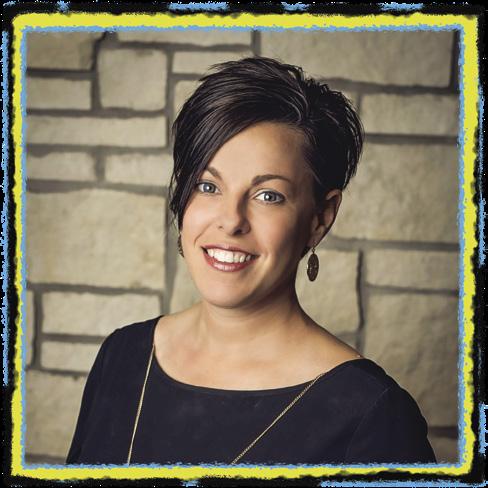
My parents. Growing up, my parents were actively involved in our community, their jobs, church and a variety of other organizations, boards and committees. They instilled in me how important it is to take on passion projects and really run with them if they are a good fit.
Giving back to the place that you call home helps to unite the community and you gain a unique sense of purpose by serving those around you, one that often manifests in other areas of your life. If a need in the community was articulated, my parents were among the first to be there. They set a healthy example from the very beginning that life is not all about getting… it’s about giving.
Even as an adult and mother now, they continue to remind me to live every day, focusing on how I respond to the challenges I face, rather than the challenges themselves.
Making a difference in the lives of others and putting good into the world are both a mission and a passion that are very close to my heart. One of my favorite quotes reads:
“The best way to find yourself is to lose yourself in the service of others.” - Mahatma Gandhi
Great role models aren’t just “teachers.” They are constant learners, challenging themselves to get out of their comfort zones, and surrounding themselves with smarter people.
Every day I strive to be better than the person I was yesterdayas a mom, friend, sister, daughter, coach, director or community leader. It is important to remind yourself to be humble. We have nothing to prove, but we have everything to offer.

Making an impact is about being able to positively influence the lives of others around you, while following your purpose. It is learning to be vulnerable, pursuing new relationships and leading by example.
Growing up, I learned how to be courageous and committed. I learned how to develop competence from my parents, even when they thought I wasn’t watching (or listening). As a quote often attributed to Winston Churchill says, “We make a living by what we get, but we make a life by what we give.”
Making a choice to have a positive impact gives meaning to life and is a tangible way to give back some of what you’ve received from others.
The ability to let go of regrets and live in the moment.
Regrets will only hold you back in life. If we spend all our time thinking about the past, we will miss the present and the future. Moreover, we are often so busy focusing on our pursuit of happiness that we miss the joy of actually living in the moment. r
by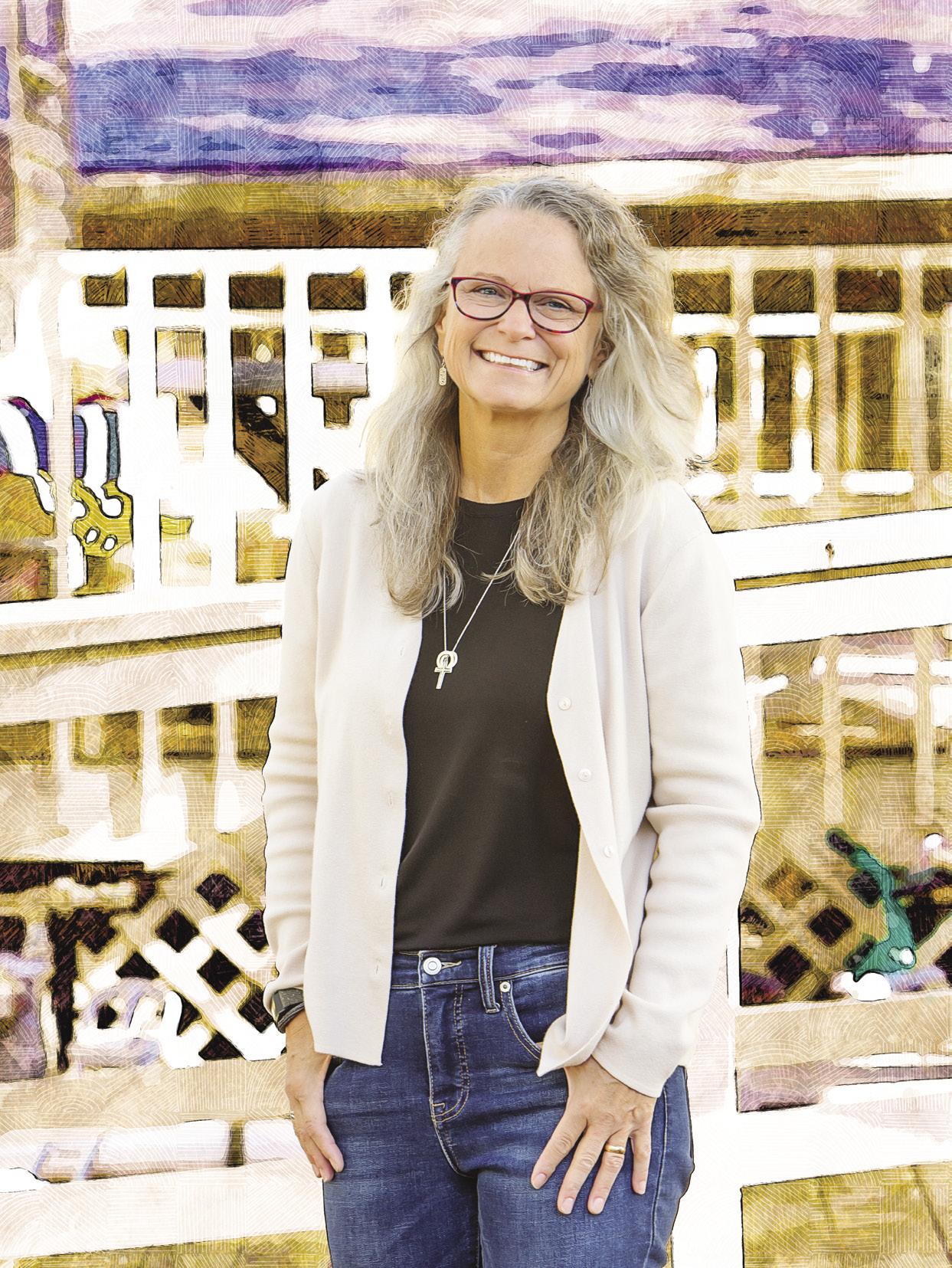 Darin White,
photo by Steven Hertzog
Darin White,
photo by Steven Hertzog
For Dana Ortiz, it is all about the relationships, many of which channeled her passion for volunteering with homeless communities on the West Coast to becoming the director of Family Promise right here in Lawrence.
How does someone with a degree in microbiology from Fresno State and a long career in chemistry and biochemistry in the San Francisco Bay Area end up as the director of a nonprofit organization that helps families dealing with homelessness in Lawrence, Kansas?
For Family Promise of Lawrence (FPL) Executive Director Dana Ortiz, it wasn’t a direct road but a journey from Fresno to San Jose and eventually to Lawrence, where her husband got his Ph.D., and the couple decided to put down roots. Along the way, they raised two daughters, who are now off creating adventures of their own.
After graduating from Fresno State, Ortiz had a career for a number of years working in the sciences. She worked as a chemist and biochemist, led a group of project managers and served as a project manager working with pharmaceuticals and drug development. This training and skill set has been helpful in working with Family Promise of Lawrence, which supports families in housing crises, as she can break down elements starting with data and then responding to it.
During her time in the Bay Area, she was exposed to and involved with family homelessness as her work began. She volunteered with her faith community once a month helping staff The San Jose Family Shelter, where she met her husband. They got to know each other through volunteering, while staying up late and talking.
When The San Jose Family Shelter was just beginning, there was a call for volunteers to help build, launch and eventually serve in the shelter. During this process and through the years, Ortiz developed relationships with many families, a number of which she maintained relationships
with for many years. These meaningful relationships are what got her interested in getting involved from the beginning.
“One of the neat things that happens organically: When someone is hosting, they bring dinner, and they sit down with the family, and they are volunteering. The walls fall down, the scales on our own eyes fall away. We don’t see this now as a volunteer or us versus them. Their kids play in the band with my kids. They play softball together. They remind me of my grandkids. And then you have people talking and listening to each other. There is no issue anymore, it’s people,” she explains.
Ortiz volunteered during her time in the Bay area and also when she arrived in Lawrence. She found out about Family Promise from her local congregation, where she eventually helped as a host and later as a coordinator for the congregation. She has been the director of Family Promise since 2011 and believes the reason the Family Promise model works is because of relationships and the many people involved in the work.
“We work really hard to not be very cognizant of not being transactional. That every family that comes here comes with a real important story that’s worth listening to and learning from. And [in] listening, each family will tell us what is helpful to them, and then we need to adjust our services to that, not the other way around.”
The Family Promise model started 35 years ago in New Jersey as a local response to a local issue. The nownational movement is in nearly 200 cities across the country. The Lawrence Family Promise affiliate program started in 2008. This was initiated by Joe Reitz, a retired University
of Kansas ethics professor, who gathered a number of concerned citizens to seek out models that would help with family homelessness. The goal was to open before winter 2008, accomplished with the help of Valerie Miller-Coleman, who became the first executive director.
As an affiliate of a larger organization, the Lawrence location relies on support, research, data and programing assistance, and adjusts its program to meet the needs of the local community.
Originally, Lawrence Family Promise was helping to shelter families overnight in a number of different places of worship, had around 1000 volunteers and would assist with food and case management. In 2011, when Ortiz joined the staff, FPL started keeping data. It recorded an overwhelming 515 families needing services the first year of data-keeping, and it was able to serve 18 families. Because of this new data, the board realized it needed to expand support, which it has over time.
Family Promise of Lawrence shifts as the community or times change. Before COVID-19, it had a small Prevention of Homelessness Program and a smaller Diversion from Shelter Program, but when the pandemic hit, there was an immediate need for these programs to expand. The Prevention of Homelessness Program helps provide support for those who are at risk for losing their homes. The Diversion from Shelter Program asks how we can help families explore other safe sheltering options. It puts them on a path toward housing and eliminating the trauma of being sheltered, and also helps with the limited number of beds available in shelters.

If, for instance, a family member is hosting a family but can’t support them fully, and Family Promise can provide the support needed to keep the family in this situation, which is a better solution than providing a sheltering place. Ortiz believes the overall goal is to get families back into their own housing as quickly as possible so FPL can then help with stabilization. The best scenario is to prevent rather than respond. It is much more effective use of resources for the FPL program, as well as less traumatic for the families.
Since the pandemic, FPL has served four times more families annually than in previous years, and the call continues to be tremendous. The cost of housing, overall inflation costs, change of jobs and many other economic challenges have added to the additional obstacles for families and additional strain on an already-taxed system.
Family Promise of Lawrence currently partners with more than 30 diverse local organizations ranging from government, physical and mental health, food, clothing, housing and shelter, credit and economic counseling, trauma and abuse, and a number of other general support organizations. One of the strongest partners is Ninth Street Missionary Baptist Church, which provides the FPL Day Center and additional temporary housing.
It takes selfless individuals in a community to decide something must be done about an issue, step up and do the work, and influence others to do so, as well. Ortiz is one of those remarkable individuals who joined with others to help make a difference in our community.
Founding board member Katherine Dinsdale says, “Dana is a unifier and a motivator. She is an incredibly hard worker … She is full of love and compassion, but not afraid to clearly state expectations. She asks the hard questions and delivers the hard answers. She can whip together a corporate flow chart, deliver and defend a complicated budget, and celebrate a lost tooth, a good report card or a full week sober, all in an afternoon. She tells stories that will bring you to tears and weaves in those pesky data points needed to earn a grant. I’ve never known such an effective and consistent mix of compassion and strength, intellect and heart.”
In her FPL profile, Ortiz explains, “This job is hard and is also a gift and brings great joy. I consider it an honor to work with Family Promise guests, graduates, clients, our board, staff, volunteers and alongside other nonprofits and community leaders to make real changes in the lives of families who are experiencing homelessness or who are at risk of becoming homeless.” She joyfully warns, “Be careful what you volunteer for; it really could change your life.” p

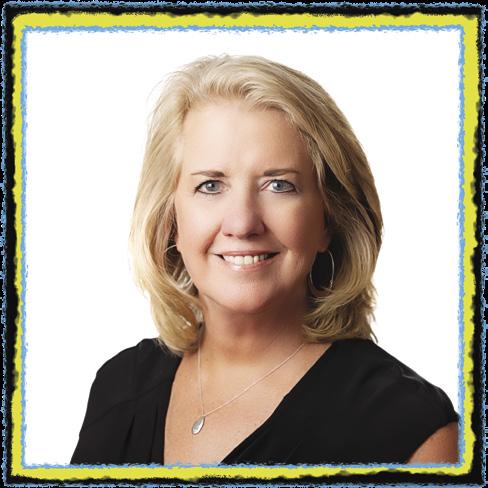
Growing up in rural western Kansas gave Bonnie Lowe an early appreciation for the challenges small businesses often face during day-to-day operations, so it only seems natural that she’s now helping Lawrence businesses find success as president/chief executive officer of The Chamber of Lawrence, Kansas. How businesses and the city work together for the common good of all in supporting and promoting each other is what excites Lowe about her position every day. Staying on the same page and remaining civil with each other can be a challenge in today’s business – or, political – world, but Lowe sees the importance of remaining respectful of each others’ opinions and remaining open-minded. Building solid, long-lasting relationships and working together, she believes, is what will lead to ultimate success.

I have learned from so many wonderful leaders and am indebted to each of them. While each experience with a mentor and role model has helped me embrace opportunities with hopes to be impactful in our community, there is an overarching message I have learned. Developing relationships and building trust with others can make each of us more effective in our positions while bringing us personal growth and satisfaction.
My roots are from Western Kansas. Our family ran a small business in a rural area. These experiences helped me fully appreciate the challenges these businesses face day after day. How we work together to support and promote each other is an exciting aspect of my position with The Chamber.
I am honored to be considered impactful with the other individuals in this publication. I have been fortunate to serve in various employment and Board positions. While I strive to make a positive difference with these opportunities, I often feel I receive much more than I give.
The lack of civility in some circles is disappointing. I would like to see all be respectful of each others’ opinions and understand that if viewpoints differ from our own, that does not make these feelings wrong. Being open-minded and establishing trust will build solid relationships and encourage meaningful dialogue and positive change. r
“Often we set out to make a difference in the lives of others only to discover we have made a difference in our own.”
– Ellie Braun-Haleyby Emily Mulligan, photo by Steven Hertzog
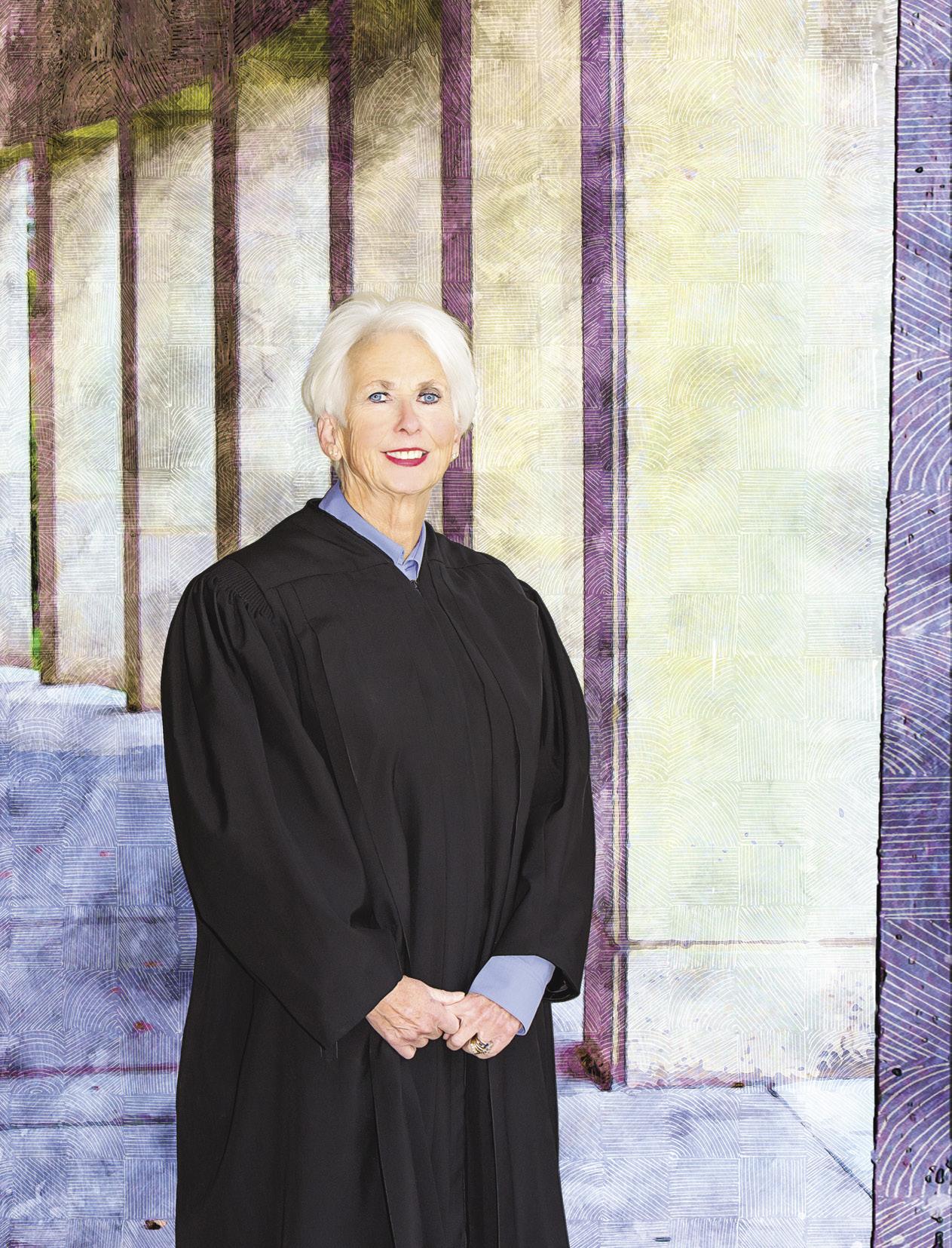
Using fairness and reason while relying on a deep-rooted compassion, Judge Sally Pokorny presides over her courtroom much like she does her life —with an eye toward treating all people with humanity.
Judging other people is generally not considered polite behavior. So most of us work to withhold our judgments and hold our tongues when it comes to commenting on the attributes and actions of others. There are only a precious few for whom judging is actually a profession. As a society, we look to judges to guide us within the law and set expectations for how to behave in order to perpetuate a germane society. That influence and its ripple effects are gigantic for those who must enter courtrooms and face judges, and certainly for society at large, as well.
Judge Sally Pokorny has presided over her courtroom in Division II, at the District Court of Douglas County, Kansas, 7th Judicial District, since 2009. She hears primarily criminal cases, as well divorce and family law. From behind the bench and in the community, it is difficult to overstate the impact that Judge Pokorny has had on individuals’ lives and on local society.
She is known for her fairness and reason, but she is also known for empathy and continually striving for improvement in the law and law enforcement communities.
According to APursuitOfJustice.com, some of the qualities of a good judge are judicial temperament, an ability to communicate, suitability to the workload and courage and integrity. Pokorny transcends all of these attributes with her outward focus and forward-thinking, and with her kind heart.
Let’s present a profile of Judge Pokorny, as best we can— without judgment.
Being fair and consistent in applying the law are at the core of what it means to be a judge. Day in and day out, people coming before Pokorny are accused of making big mistakes, physically harming other people and not honoring their marriages. It is fair to say that these people are not at their best, and in fact, many of them may be at their very worst when they are before her. The easier route might be to dismiss them as “bad people” or “criminals,” and move on to the next case.
“She is very cognizant of the fact that people screw up, and that doesn’t mean they’re not people,” says her longtime friend and fellow attorney, Sally Shattuck. Pokorny strikes a balance between being a human being and also an authority figure.
“She’s only 5 feet tall, but when she is on the bench, she
is in total control of that courtroom,” says Patti McCormick, another longtime friend.
For her part, Pokorny says she does not separate who she is or the experiences she has lived from those who appear in her courtroom, to the contrary.
“Being a woman plays a big role for me. My perspective on life is as a woman,” she says.
For example, she says when a couple divorces, it is a big financial hit for both of them. In a traditional marriage, the man typically recovers financially in three to five years; the woman rarely gets back to where she was before the divorce. So she bears that in mind as she helps determine support between the divorced couple.
To be sure, Pokorny has written more than her fair share of legal briefs in her 40-plus-year legal career. She has honed her craft of written communication. She finds, though, that the most valuable communication taking place in her courtroom is the verbal variety—and not necessarily coming from her.
“I tell people to talk to me about why they came to this. No one has listened to them for a long time. Many people have been in jail so long that it’s the first time they’ve been sober for any amount of time and had full mental health treatment and medications,” she explains.
McCormick marvels at the impact Pokorny has on people in just the relative short amount of time their case is before her. They stay in touch with Pokorny and continue to send her letters with updates on their lives.
“Many people have told her that they always feel like they are getting a fair shake. She actually listens to them, she looks at them, she gives them time to tell their story,” McCormick says.
Being a judge—and before that, being an attorney—is demanding. Start just with the amount of reading that takes place: hundreds and thousands of pages of documents. Add to that daily and hourly courtroom arguments and dockets, plus being the “duty judge” to take calls 24/7 for one week every six weeks. And well, you have to be willing to work really hard.
Pokorny did not set out to be a judge. In fact, as a young girl, her goal was to become a gynecologist. She blames her astigmatism for causing her to break too many slides in the microscopes in high school science, though, so she
chose a different path. After majoring in history education at Washburn University and doing her student teaching, becoming a teacher wasn’t the right fit either. At the time, she says, she was living in Topeka, across the street from Washburn Law School.
“I thought, I can delay my life for three years if I get into law school,” she says.
Pokorny’s first job in government law came during law school, when she received a grant from the U.S. Department of Justice to do a summer internship with the county attorney in her hometown of Independence, Kansas. She came back to Topeka and worked for the Shawnee County District Attorney while she was in law school and for three years total. She says she worked Shawnee County dockets as a jack-of-all-trades, from paternity cases and child support to consumer protection, to care and treatment cases for the mentally ill.
She moved back to Montgomery County from there and worked part-time for the County Attorney and part time with her own private practice. Then she ran for, and was elected as, Montgomery County’s first female county attorney. She served one term then returned to private practice so she could count on job security for supporting her young sons.
In 2006, Pokorny decided to move to northeast Kansas to live closer to her sons, who had both graduated from Washburn and decided to stay in the area. She went to work with Lawrence attorney David Brown in his private family law practice.
It was there that she saw how all of her prosecutorial experience had amounted to a potentially good fit for a judge position. So she threw her hat in the ring to become district judge and was appointed by then-governor Kathleen Sebelius.
“I think it was a really good time in her life to become a judge. She had been in practice for a while and had a desire to be able to change things in court,” Shattuck says.
Having the courage to put on the black robe and sit in judgment of others is one thing. Having the courage to actively seek change in how justice is served to people is another.
Pokorny is one of the founding members of—and the judge for—the Behavioral Health Court (BHC) of Douglas County, the existence of which she credits largely to former District Attorney Charles Branson. The court, established in 2017, comprises mental health professionals,
substance abuse professionals, peer support counselors, corrections officers and others in order to address the increasing number of defendants with mental illness in the court system.
“County jails and prisons are the largest mental health facilities—that’s where people get treated,” Pokorny says. She is the presiding judge, but she emphasizes that the BHC is a team effort. She also says she thinks the BHC is one of the most impactful things she has done.
“What she has done with the Behavioral Health Court is remarkable, forward-thinking and very compassionate,” Shattuck says.
Douglas County’s BHC, which convenes weekly, has become a role model for other jurisdictions in Kansas and out of state, but McCormick says Pokorny helps make it more than just the sum of all its parts.
“Sally is the only one to talk in the Behavioral Health Court. She doesn’t wear her robe, she just sits up front with all the people. She really gets involved in their lives and is upset when they fail—and they do fail sometimes,” she adds.
Trying to parse out every aspect of working as a judge is not as simple as separating the wheat from the chaff. Criminal judges have to be well-balanced people outside of the courtroom, as well, or the gravity of some of the defendants’ actions and the complications of the justice system can take a deep toll.
“To know Sally, you have to stand back and watch the magic and impact that she brings to her life and friends,” McCormick says. “She has friends from every phase of her life. I’ve never known anybody that has so many friends.”
Pokorny says she has become good at compartmentalizing some of the horrors of her job. She makes sure to seek relaxation and appreciate happy moments and occasions to help keep her upright.
“With Sally, what you see is what you get. She’s fun, she’s gracious, she’s welcoming, she’s smart,” Shattuck says. Pokorny will continue to be a catalyst for change in her profession. Outside of the courtroom, she has been a leader in legal organizations at the state and local levels, and she helped found the Kansas Women Attorneys Association.
“She likes to take the practice of law and use it for the betterment of people,” McCormick says. p
There’s power in kindness. Need proof? Look no further than Clare Nderagakura Granger, a community organizer and founder of Clare’s Community Closet. Granger jumped into volunteering in 2020, when she began helping Food Not Bombs, an organization that provides free vegetarian or vegan meals to the community. When she saw people also needed blankets and coats, she put out a call for them on her personal Facebook page. Community members donated the items, she gave them away and Clare’s Community Closet was born. When the effort outgrew her house, Granger leased a space and developed a long list of supporters who donated not only essential itmes but also funds to pay rent, utility and expenses. Granger now collaborates with Get It Give It Inc., a 501c3 nonprofit founded by Megan Haus-Divine located in Hillcrest Shopping Center that provides clothing, household goods and other items to anyone in need. Granger knows how much such kindness can mean to those living in poverty, having grown up in the foster care system and struggled at different points in her own life.

One of my main mentors and someone I’m lucky enough to call a friend is Megan Green Harrison. I feel like I get a ton of support and guidance when I need it from key people in our community, but Megan has made such a huge impact on my life since the day she asked me to do the Lip Sync competition for the Willow 4 years ago. She reminds me to walk when I get the zoomies, and builds me up when something in my world inevitably topples over. And thats more often than any of us would like.
I get all kinds of practical knowledge of non profits from her, and the reasons why things are done a certain way. I like being able to create my own niche in that sphere and still be supported the way I have been.
I think it’s extremely important for people to know that I do this out of love. For myself, for my community, for my kids…for my love of my home. I’m grateful for the opportunities I receive, and I just want to share the goodness I receive with others.
I think it’s hard for people to trust and provide for others because of pain and mistrust.
I want to infect people with goodness and love and the ability to forgive wrecklessly lol. We can all take care of each other, in small ways all the time. It all matters. :)

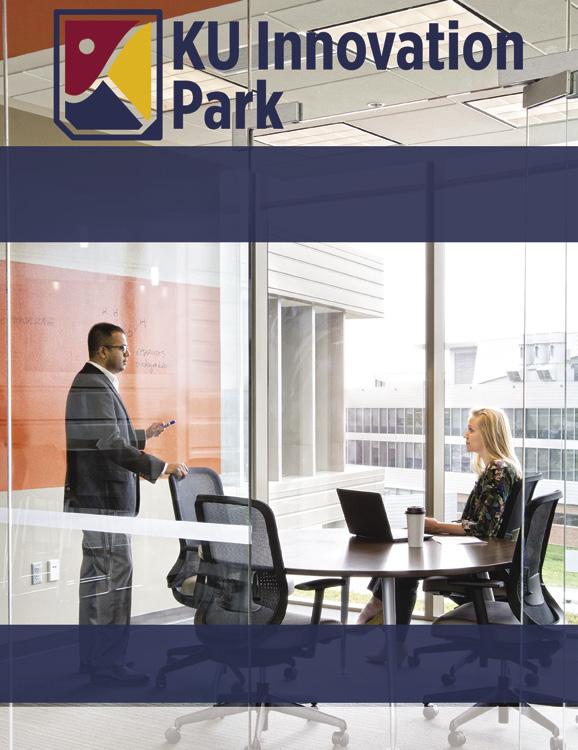
Making an impact to me is proven by the actions I see others take around me after I have shown my hand, or what I’m willing to do for our community. I love seeing others step up or believe they can after being able to see me do it.
I made a decision to continue making an impact through Clare’s Community Clos-
et when I could tell it was a resource that was needed. I made the decision to keep listening to Community members, my gut and the Universe (or God however you like to identity “the something bigger out there) on wether or not this was my place. And every time I got too tired, discouraged or even sabotaged from my community work, the pull always came back stronger and clearer for me.
The whole process is evolving with my life and the needs of myself, my family and those around me. As it should.
World Peace. Lol or maybe Lawrence Peace. Since Lawrence is like my favorite world to participate in. While I am actually serious, I think sooner than later I’d really like affordable housing and programs to support those needing it to really expand and explode. Like, let’s make getting basic needs easily, for everyone, popular. r

Emily
As owner/operator of Merchants Pub & Plate on Mass Street, Emily Peterson believes strongly in taking care of the small details and that the overall bigger picture will take care of itself if those details are handled properly. Another driving factor, she says – and this plays into taking care of the details – is making sure the people, i.e., her customers, are well taken care of … that they be seen and heard. Since childhood, she says she was raised with the belief in serving her community and contributing to the greater good, and she keeps that in mind every day as she goes about the business of running one of Lawrence’s most popular eateries.
Cindy Maude. She as been an incredible model of generosity, service and love, and has made a difference in my life and so many others as a leader in this community.
Details are just as important as the big picture. In my experience, it's the details that make people feel seen, heard and cared for.

It's been organic for me. I was raised with the ethos of serving my communitites, and have always found joy and fulfillment in contributing to the greater good.
For Lawrence, I'd like to see civic priorities for Downtown change. We need an earnest dedication to supporting locally-owned small businesses, and creating a safe and clean environment for Downtown workers and visitors. r

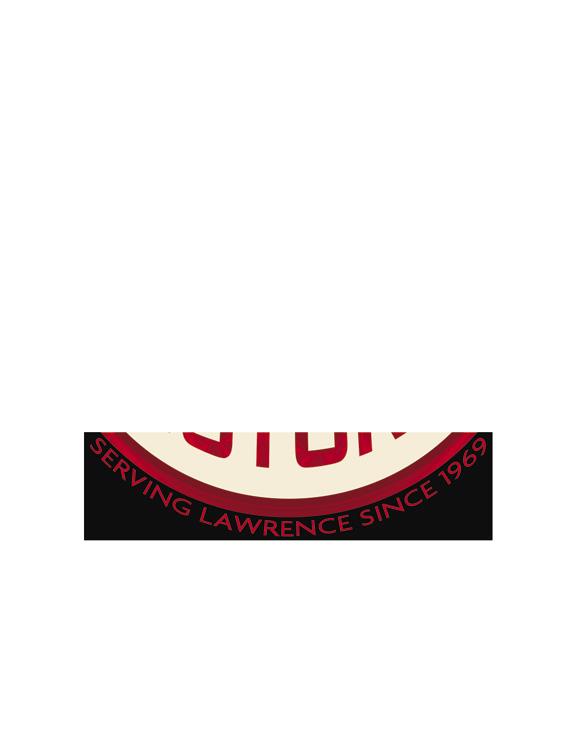



 by Emily Mulligan, photo by Steven Hertzog
by Emily Mulligan, photo by Steven Hertzog
With a combination of discipline, empathy and tenacity, Ballard Center CEO Becky Price turned a “nightmare” into a thriving nonprofit providing stability to families in need.
Unlike traditional corporate America, “success” in a nonprofit doesn’t have a specific visual, like sleek, trendy office décor or whizbang tech gizmos that blow people’s minds. In fact, there isn’t really a look at all for a successful nonprofit; it is all about action behind the scenes to meet the needs or the purpose of the people being served.
So how can we know if a person who works in nonprofits is good at what he does? It’s not really data that can tell part of the story. And it’s not completely about the budget or fund-raising, even though those are pretty crucial for a nonprofit to function.
Accomplishments, relationships and good feelings tell the best stories and demonstrate the most about outcomes of people who work in nonprofits. Becky Price has left a trail of all three of those in just about every single room she has entered for her past almost 40 years of work in Kansas nonprofits. Lucky for Lawrence, she lives here, and these days, she is the driving force behind the Ballard Center.
A moment to introduce—or maybe reintroduce—the Ballard Center. It is difficult to file it under a particular category of nonprofit because of its range of services. Ballard houses a day care and a preschool, and runs educational programming aimed at, but not exclusively for, low-income children and their families. The organization also provides rent and utility assistance for Douglas County residents in crisis, as well as a food pantry, a clothing closet and a “family stabilization network,” with access to other critical services such as legal help or even car repairs.
Price has been the CEO of Ballard since 2017. Neither her job nor her workplace are the kinds of things that allow for sitting still. Price moves all around the historic building pretty much constantly. She could be gathered in a meeting with staff and volunteers one minute, and then crouched down next to a small child the next. Price has stylish blonde hair that hangs past her shoulders, and her wardrobe reflects the attributes of the Ballard Center: colorful yet businesslike.
To say that the mid-2010s were a tough time for Ballard might be an understatement.
“I like a challenge and am good in crisis situations. What I inherited was such a nightmare,” Price says. And she might be being kind to call it a “nightmare.” Ballard Center was on the brink of failure altogether. The center owed about $90,000 to local Lawrence businesses and vendors, Price explains. The building was in disrepair such that it was drawing scrutiny by the Kansas Department of Health and Environment. Ballard’s relationships with other community entities and volunteers were strained, at best. There were no bylaws for the nonprofit, no database of donors, no personnel information, zero electronic records of anything.
Price says she could not apply for any grants in the first two years of her tenure, because with no records left behind, she didn’t have enough information to answer all the questions on grant applications.
Prior to her arrival, Ballard had absorbed Penn House, a clothing closet that had operated in Lawrence for 65 years. That meant Price was overseeing two separate buildings and essentially two nonprofits at the beginning. She knew Penn House was not sustainable in the long run, but she says it took her about a year to figure out
how to close and sell it. Now much of Penn House’s services are part of Ballard’s offerings, but finding the financial footing to operate that without taking away from Ballard’s already precarious position took some doing. Nowadays, Ballard doesn’t just exist, it is also thriving.
“Sometimes I’m amazed I did it. I wasn’t sure I could keep the thing afloat,” Price says.
Price has lived in Lawrence since 1980 and spent much of her career heading up Big Brothers Big Sisters (BBBS) Serving Douglas County, and then subsequently personally starting 16 Big Brothers Big Sisters offices across the state of Kansas. She also has worked statewide for the Kansas Coalition Against Sexual and Domestic Violence.
Her colleagues and partners in the nonprofit realm are not at all surprised at what Price has done turning around Ballard.
“She amazingly combines two things: She has real, heartfelt empathy, and at the same time, her mind is a very disciplined, business-related mind. She does both in a way that I’ve never seen in one person,” says local attorney and nonprofit advocate Wint Winter Jr.
Yet it isn’t just her organizational skills or the fact that she is “the most amazing delegator,” as her co-worker, Meg Pearson, at the Ballard Center, calls her. Colleagues describe her as driven and energetic, but her main attribute is her sincere and caring heart for others. Add in just the right amount of stubbornness, and that is Price.
“She’s a fireball,” says Pearson, who is a longtime co-worker of Price’s at BBBS who Price recently hired as director of communications and outreach at Ballard. “If she sees an in-
justice, she is on the horn, immediately reaching out to those who can make a difference.”
When talking about Price, Winter references the adage about roadblocks making for the best gravel.
“She’s one of those people that when she gets something in her mind, she is going to do it,” he says.
It is that tenacity combined with a gentle touch of humanity that is what really helps her succeed, Pearson explains.
“She does a good job of connecting with everybody she meets. She’s not afraid of having a conversation about anything. She is very comfortable, very social but also very direct. It’s easy to have hard conversations with her because she’s so authentic,” Pearson says.
As for Price, besides hours upon hours and very long weeks, months and years of hard work, she credits her own self-awareness for much of her success as a leader.

“I think my greatest strength is talking people into doing stuff for me. But also, I’m very aware of what my strengths are not, and so I think that’s why I ask,” she says.
Having worked with families and particularly with children for so long, Price has seen some tragic things. She has lived them in her own life, as well. Her son, Skyler, whom she describes as the “kindest human being,” died 15 years ago at the age of 19. And Katherine, who was Price’s “little sister” through BBBS, became Price’s daughter starting at the age of 11, when her own family was forced to split up in tragic circumstances.
Katherine, now Kat Geddings, (Price calls her “Kit Kat”) works at Ballard, and her three children attend the preK and day care. Price’s husband, Jeff, has retired, and their daughter, Brittany, just gave birth to her second child this fall.
Price says she copes with stress by cooking. At times, she will cook up as many as three different meals in one evening, depending on how tough of a day she had. She says she likes the focus and purpose that cooking provides.
What does Price believe is the best approach to leading and managing others?
“Speak up. If you don’t understand, ask—probably other people don’t understand either, and they’ll learn if you ask,” she says. p
There’s a word Amber Sellers uses in describing herself that perfectly sums up what makes her such an effective and strong civic leader – connector. Rather than focusing on the differences among people, organizations or situations, she finds the commonalities that can serve as catalysts in bringing those entities together and working collectively to solve problems and make the lives better for all in the community. According to her, “making an impact is when we use our collective voices and labor to pull from our experiences and history to empower change of action, thought, or behavior without centering ourselves in the process.” It’s no wonder she refuses to single out a single mentor in her life, but claims dozens of women leaders who have helped shape the civic leader she is today.
While the question asks who "was" my mentor/role model, I have been blessed to be surrounded by many individuals who have been instrumental in my journey and have earned this designation. First and foremost would be my parents for instilling a heart of service, a relentless spirit to always ask 'why not,' and a passion to seek justice in all that I do. I have been fortunate to meet many women who continue to impart knowledge and sage advice to me throughout my life. I call these women my kitchen cabinet squad - they are Schaunta
I'm a connector by nature - I look for commonalities between divergent situations. I truly believe success comes from recognizing the value of relationships. While discourse can be organic or manufactured, if we don't work as a collective to solve difficult challenges, we will fail. I approach each situation with a desire to cultivate potential, whether it be an individual or a strategy. I live to uncover what life ought to be like, not what it is.
It's the power of Sankofa - an African word from the Akan tribe in Ghana that means, "go back to the past and bring forward that which is useful." We all have a spirit of service built innately within us. Making an impact is when we use our collective voices and labor to pull from our experiences and history to empower change of action, thought, or behavior without centering ourselves in the process.
The biggest decision I made that I also felt could be impactful was running for local office. This was an organic journey 20 years in the making. While I had grown up seeing Black women and men representing my community on the local and state level, I struggled to see that same leadership in other communities I've lived in. When I finally made the decision to run for office, it was less about me doing a "thing," but rather elevating the importance of leadership that is representative of the community, unapologetically. Leadership should not be measured by popularity, performative behavior, or one's affluence - it should be measured by character, skillset, and ability to serve the collective.

I would love for us to challenge what success looks like for everyone in our community as it relates to housing/ homeownership. r

Diane Stoddard claims little to no credit for any accomplishments she’s achieved as assistant city manager of the City of Lawrence. She’s quick to credit the support and cooperation she’s had the pleasure of receiving and working with throughout the years, especially during most challenging times. What she loves most about her job is that those collaborations have enabled her to have a positive impact on a number of city projects and services that are lasting in the community and positively affect people’s daily lives. If only there could be greater civility in the discourse of public affairs, her position as a civic leader would be perfect, she says.
My parents have been strong role models for me and I have been extremely fortunate in my career to have had many mentors who have helped me along the way and supported my professional growth.
Nothing I have ever done has been due to my individual work- I have enjoyed the support and cooperation of a team of colleagues, especially during the most challenging times.
My job working in city government for many years has enabled me to impact a number of projects and services that are lasting in the community and positively affect people’s daily lives. It has been an honor to be able to do this work at the direction of elected officials, the City Manager, and in conjunction with a strong team of professionals.
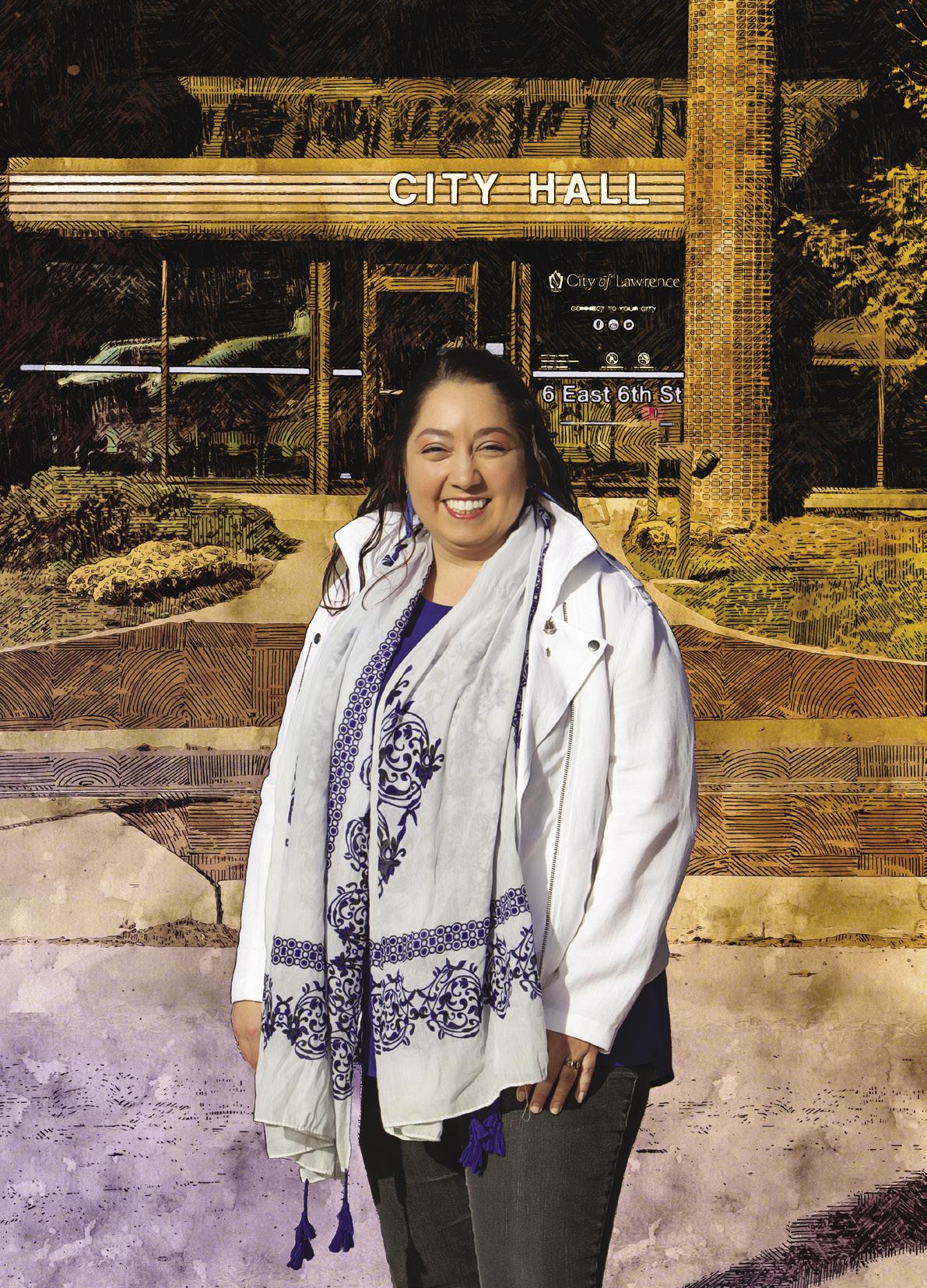 by Nick Spacek, photo by Steven Hertzog
by Nick Spacek, photo by Steven Hertzog
With a career that began with a mere interest in the workings of the city, Mayor Courtney Shipley methodically moved up the ranks.
Even before she became mayor of Lawrence, Courtney Shipley has been involved in city politics. Having lived here since the fifth grade, when her mother moved the two of them from Ottawa so that she could attend the University of Kansas, Shipley’s interest in how the city works came about because of a personal issue.
“I didn’t just wake up one day and think whimsically, ‘Wouldn’t it be fun to be on the city commission?’ ” Shipley explains. “I started going to these meetings because of something that was happening in my neighborhood, which was a traffic-related roundabout engagement that the city did.”
Shipley began going to city commission meetings in 2014 to see how that was going to play out, and she became interested in the other things happening on the agenda. With the desire to see how various city-related concerns shook out, she’d come back the next week to follow their progress, which ended up being a four-year span wherein Shipley went every Tuesday just to see what went on. “When people in those situations see you showing up and being interested, and you’re reasonably responsible, they want you to join their group or help them do something,” Shipley explains. “And you start saying yes to things.”
After two years, people started saying, “Hey, maybe you might want to do this,” but the future mayor wasn’t quite sure whether she was qualified for a position as city commissioner. “I’m sure partly because I’m a woman, I was like, ‘Well, I want to make sure that I’m totally qualified to do this,’ ” Shipley offers. “So, I did more, and I got more involved, and I learned more stuff for a couple more years before I
was reasonably sure that I could.”
2023 marks Shipley’s fourth year on the Lawrence City Commission, after four years of what she refers to as “just chilling.” But in her eight years’ time of being present nearly every single Tuesday night, she’s learned a lot about Lawrence and how it works.
“I’ve observed over the years that you don’t get a feel for the relationships in the room—who the staff members are, who the neighborhoods or the interest groups are—if you don’t physically go,” Shipley continues, clarifying the difference between in-person and streamed meetings. “You don’t meet those people. I’m a little bit shy, actually, so I made a deal with myself: Every time I went, I had to meet a new person if I was gonna go out.”
And that was a deal that served her well. You need to know who the characters in the conversation are in order to figure out a solution or move something forward if you’re an activist. To that end, much of what Shipley has become known for is that she is a “neighborhood person.” “Those are groups I’ve heard from on my way up. I’ve gotten used to understanding what their perspectives are and the patterns of those perspectives.”
Those patterns are the predictable worries of homeowners throughout town, no matter which neighborhood they might live in. For instance, “If this road or sidewalk comes through here, how does it directly affect me?” Those types of things affect people every day. As Shipley explains: When an engineer pulls out a map and looks at an intersection, the connection made in his or her mind might not be the same connection made by those who live there.
Because of this intense interest in making sure the needs of the neighborhoods and those who live in them are met, Shipley has made a concerted effort to not become pigeonholed
as the “neighborhood person,” the one philosophically opposed to developers.
“I just choose not to believe that’s true,” Shipley states. “Otherwise, we’re never going to get anything done. We’re just always going to be at loggerheads.”
Early on, some of those efforts— borne partly, Shipley believes, out of naivete—was her talking to people she didn’t know she wasn’t supposed to talk to. “One time, I was on a neighborhood board and invited a speaker to come who had never been invited there and believed themselves to be like mortal enemies—like persona non grata. I just had no clue. I was just like, ‘Hey, let’s talk to this person.’ ” The end result was that the group was very grateful anyone even wanted to hear its perspective, whether they agreed or not. The group was thrilled someone was even willing to have a conversation.
“And I remember that,” Shipley says. “I go on, and I look for people I’m pretty sure might disagree with me, because some of the ways that we end up in our decision-making here, end up as an impasse, not actually progressing when we consider ourselves progressives, ’cause we’re not really actually talking to each other very well.”
As to Shipley’s current involvement with boards and projects, “It’s a boring answer, unfortunately,” she says. “I was on three boards before I got elected: Board of Zoning Appeals, Lawrence Association of Neighborhoods, and Lawrence Preservation Alliance.”
At the moment, though, she continues, “it’s ill advised to be on boards when you’re elected,” due to perception of conflicts of interest. While she stills go to Lawrence Association of
Like most community leaders who make positive impacts, Cindy Yulich measures her own success by the successes of the people around her, whether it be fellow employees or customers/clients. Another common trait held by most impactful leaders is that she worries less about perceptions of others about her and more about results or the positive differences she’s making in the lives of those she serves. Leading with integrity in both her role as market president of Empire Bank and her work in the community is of utmost importance to Yulich. Bringing the community together around a common purpose of shared success is her vision.
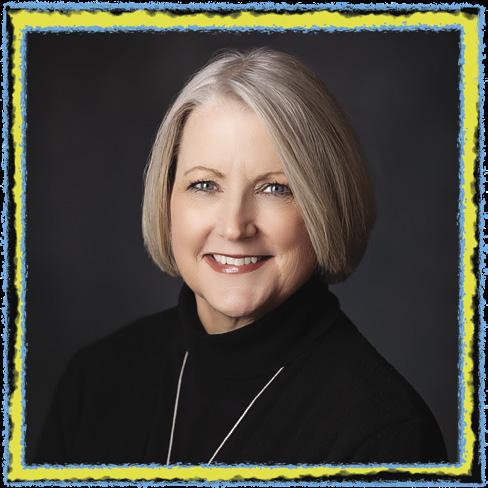
Many have impacted my life and career but three rise to the top: Jay Breidenthal, my first boss in banking at Security Bank of Kansas City. Jay taught me the art of taking care of customers. The second was Randy Weseman, former Superintendent of Lawrence Public Schools. Randy lived the concept of servant leadership, the importance of process and the difference between governance and management. Finally, Dave Adams retired President of Emprise Bank. Dave is one of the most empathetic and fair-minded people I know.
Leading with integrity in both my job and my community work is important to me. The success of my fellow employees and customers is my mission.
This was never really a decision but rather evolved over time. At this point in my career, I’m focused on making a difference when I am presented with an opportunity to help improve a situation and less worried about how I may be perceived by others.
I’d like to see the Lawrence community come together around a common purpose of shared success. We don’t have to always agree but let’s find the common ground where we do agree and begin the work of making progress toward our goals. r
Neighborhoods meetings to hear what people are concerned about, she’s no longer on the board.
“I don’t really have time for much else,” beyond that, she concludes. “‘Extra’ time goes to my kids.”
Shipley doesn’t believe she’s one philosophical idea, however, explaining that she’s trying to get to the middle and find the common ground. She knows being on the city commission is a position that follows you everywhere, and when she initially considered running, Shipley was confrontational with herself about whether that would annoy her.
“And it doesn’t,” she says. “I fully expect it. I encourage people when they’re like, ‘Oh, you don’t wanna hear about this.’ Yeah, I do. Go ahead. It’s all right. It’s what I’m out here for.”
Things do sometimes get interesting for Shipley being Latina. Given her last name, there are the occasional commenters at city commission meetings who are unaware of her heritage.
“Public commenters were not aware of that little fact,” Shipley says. “That, in fact, we have more representation on our board than is reflected in our actual city demographics, which is something you could be proud of, I guess, if you want to. But again, most people aren’t aware of that, and I don’t know how to play that up or down, so I just choose not to play it up or down, and just let it be what it is.”
This reflects her experience in life, Shipley continues. People who don’t know she’s Latina will say something, and then she’s in a familiar situation where she gets to tell them that she’s Mexican. “And that’ll be fun. Let’s see how that goes. How are they gonna take that?”
On the other side of the spectrum, she acknowledges she’s white-presenting and has had some people in her family says that doesn’t count.
“You’re not this, and you’re not that, because I don’t perceive you that way,” Shipley explains of all of these situations, regardless of the person with whom she’s interacting. “Which I think is very interesting, that what you are is really about what they perceive and nothing about how you feel.”
Shipley tells a story of how there once was a commenter during discussions about Lawrence’s sanctuary policy, which had to be changed because the state changed its laws.
“In that conversation, one of the commenters wanted to shame all the white people and—as ham-fisted as he possibly could be—only remarked on our last names,” Shipley recalls. “And at the end, I was like, ‘Who wants to tell him I’m Mexican?’ Everyone volunteered.” p

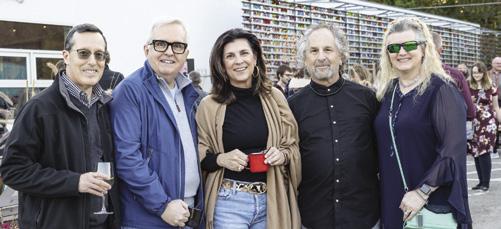


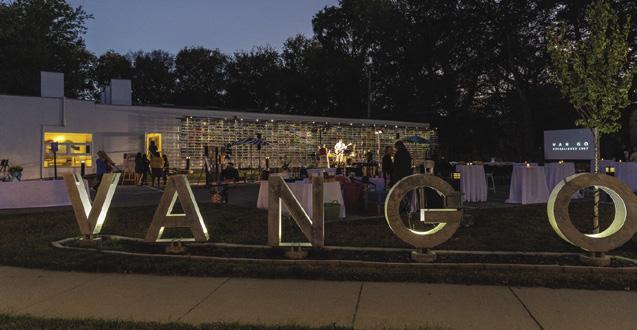

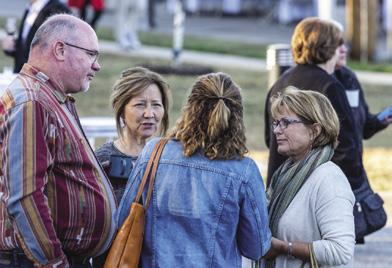
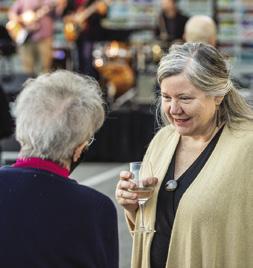

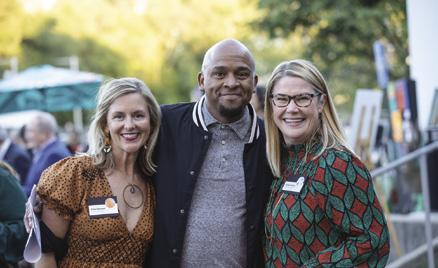
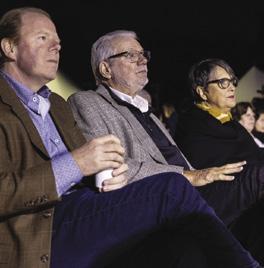
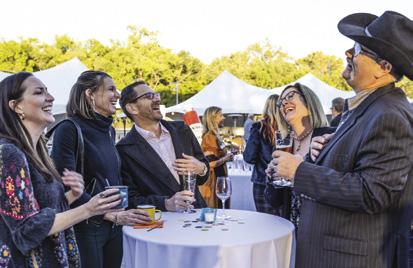
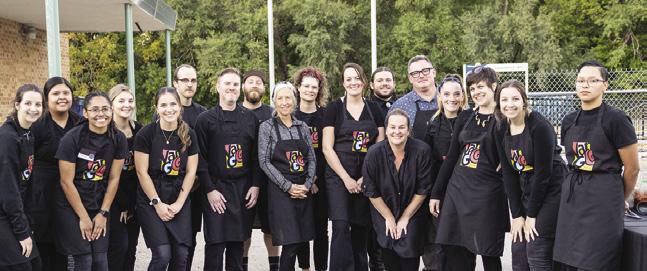
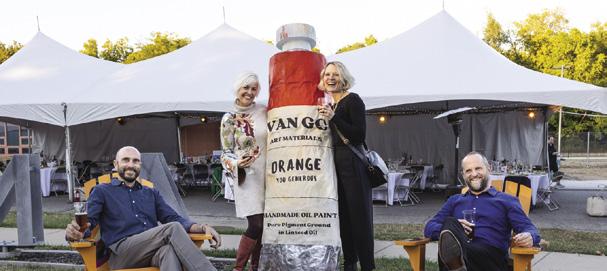

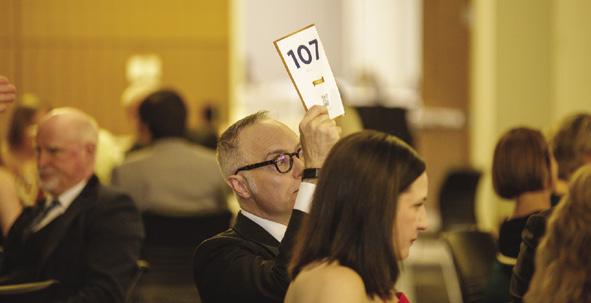
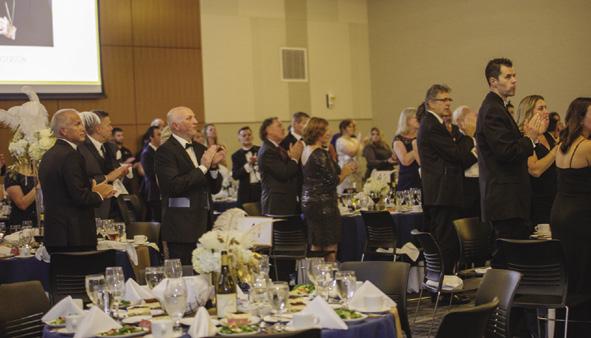
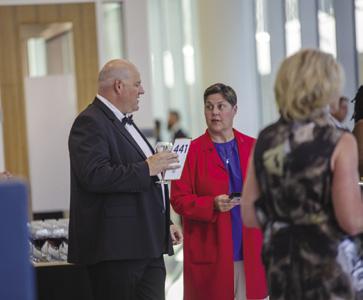
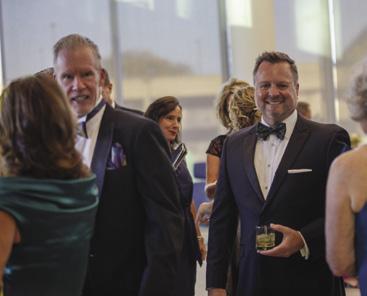


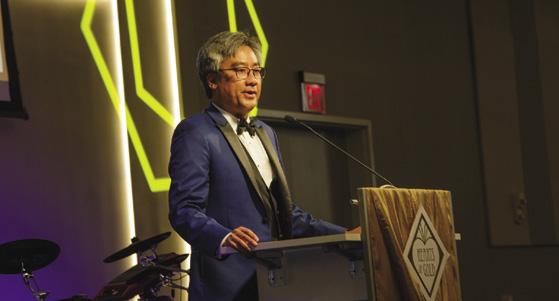


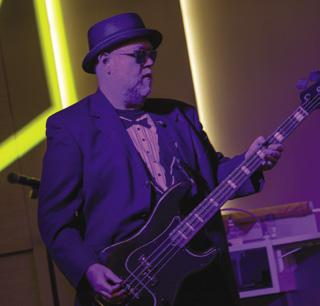
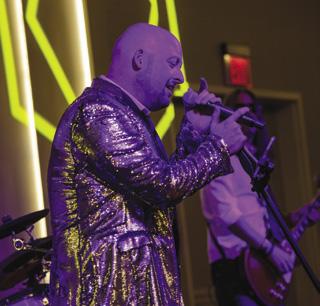 LMH Health - photos by Rachael Major
LMH Health - photos by Rachael Major
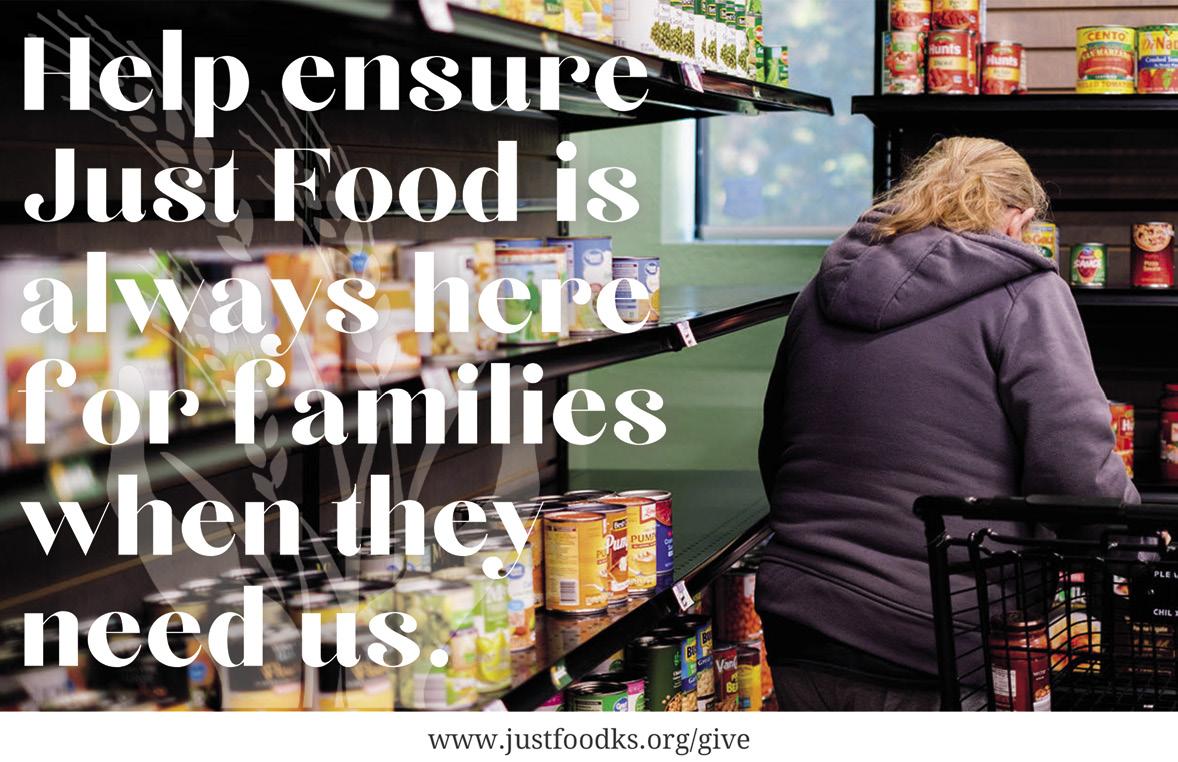
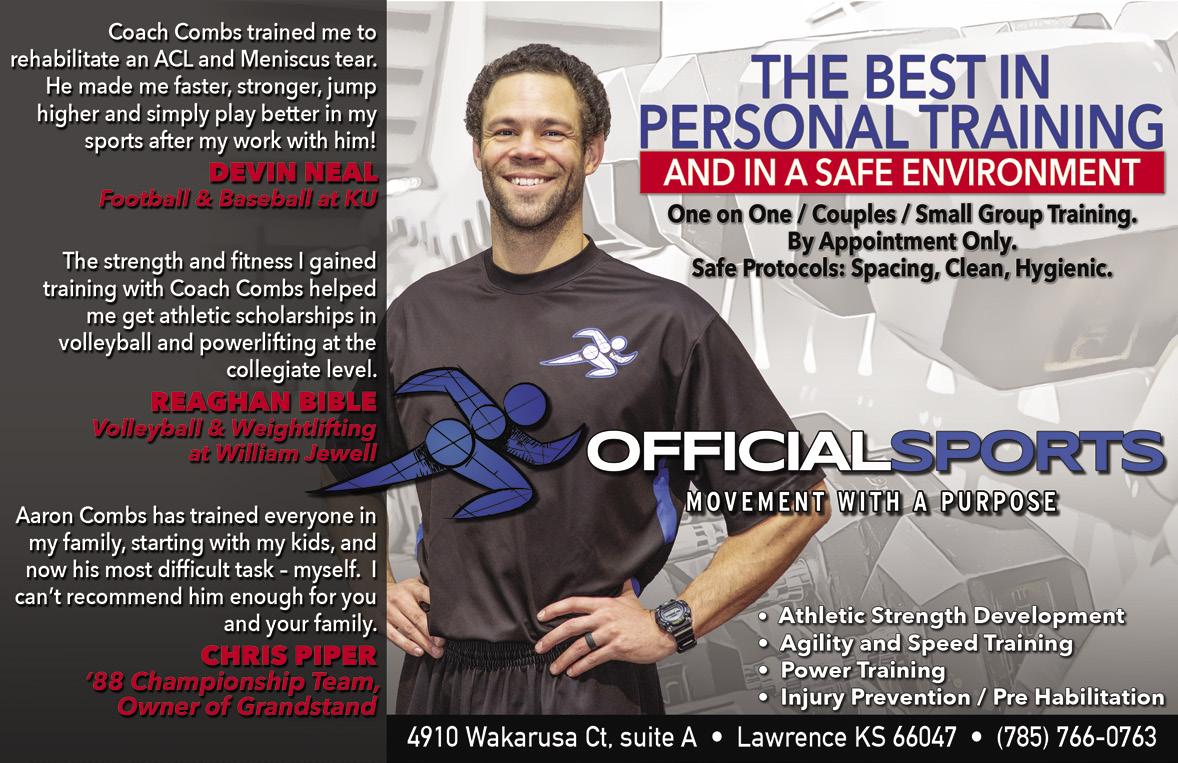
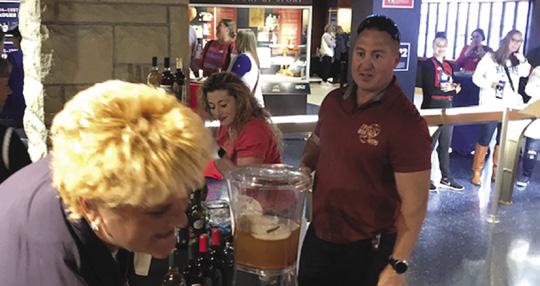
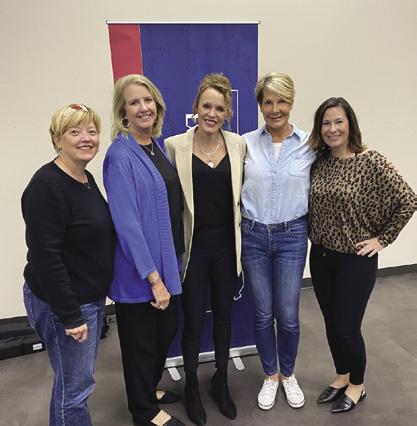

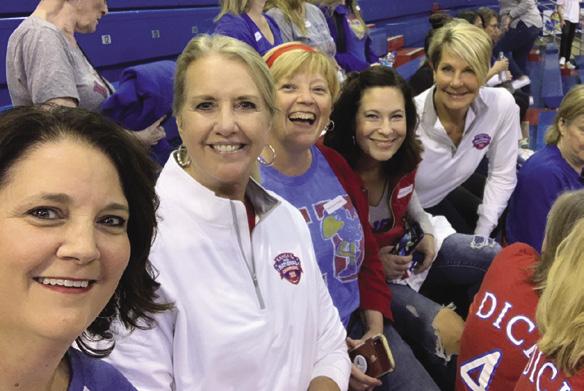
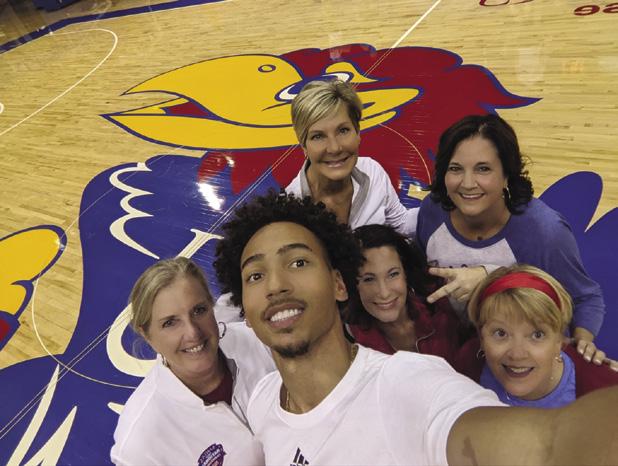

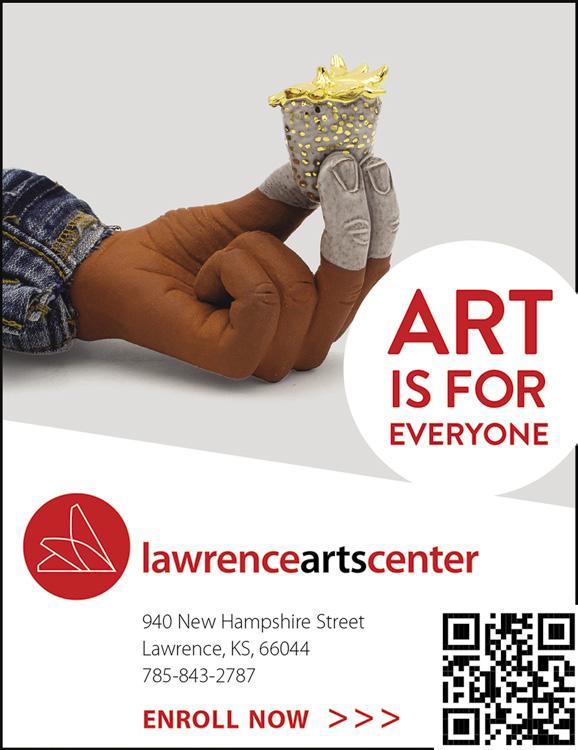 THE CHAMBER Ladies Night Out & Basketball
THE CHAMBER Ladies Night Out & Basketball

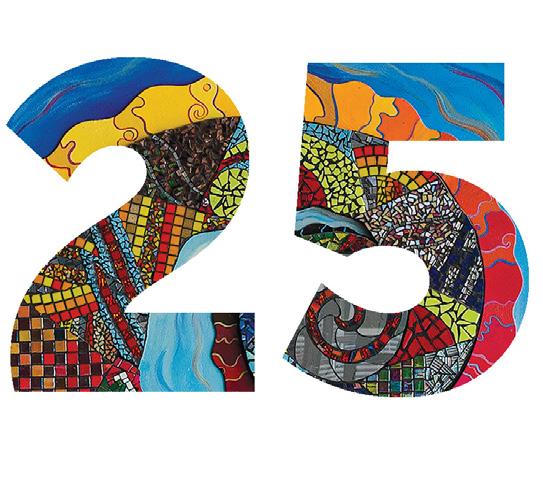

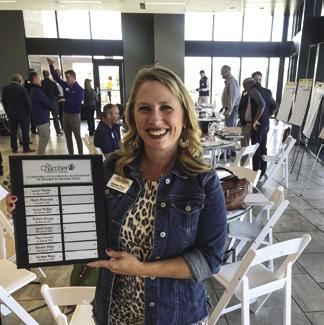

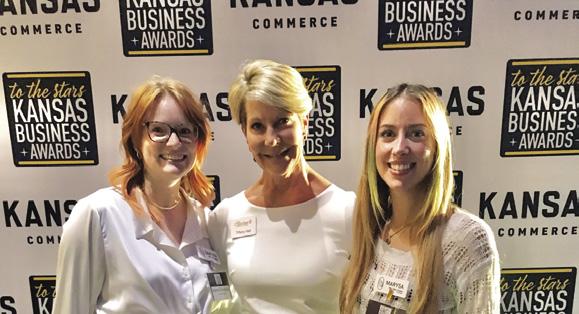
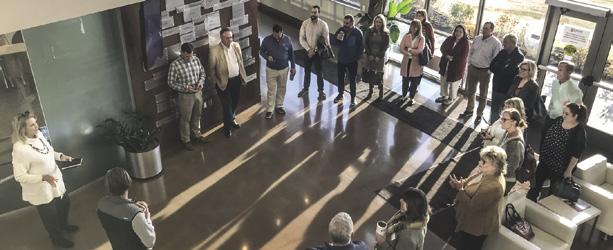
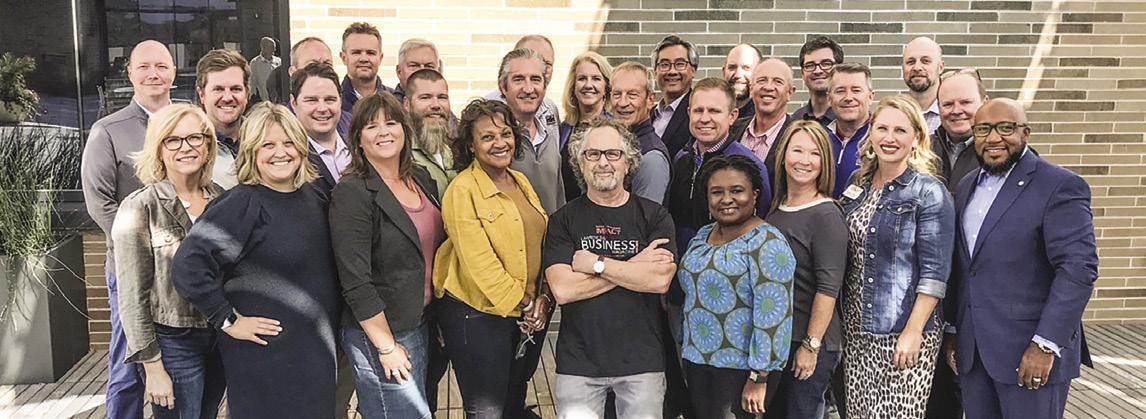
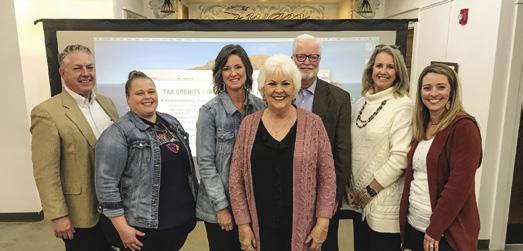


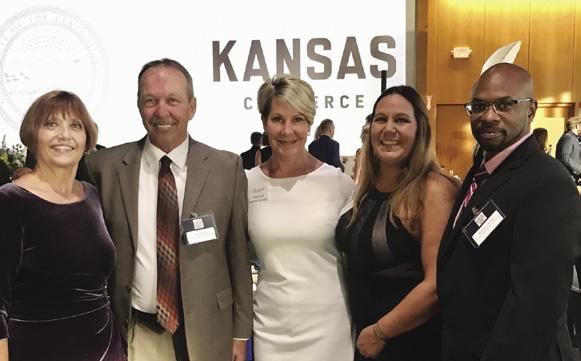
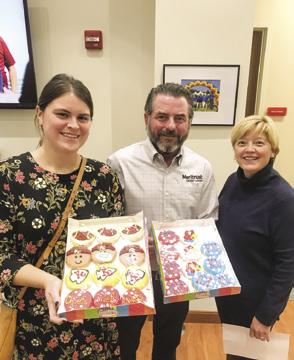

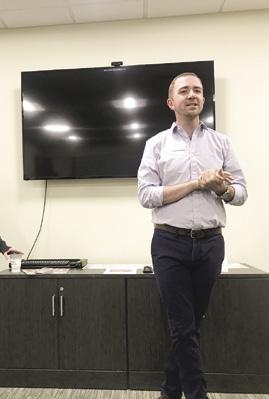
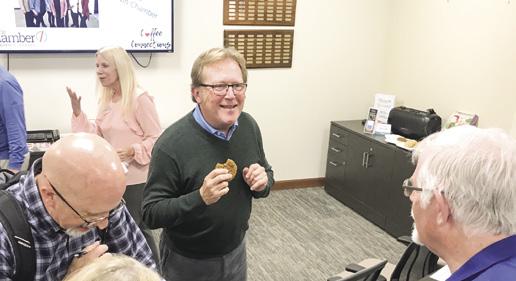

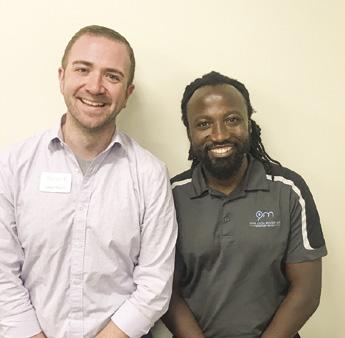

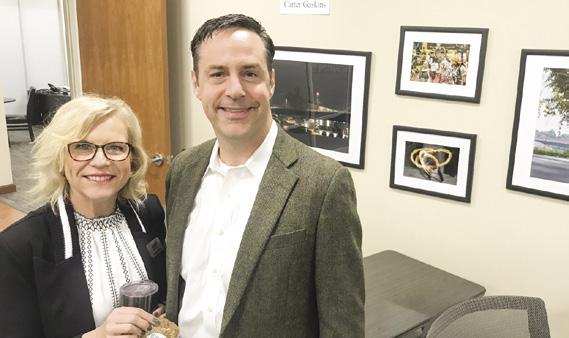

“Every great dream begins with a dreamer. Always remember, you have within you the strength, the patience, and the passion to reach for the stars to change the world.”– Harriet Tubman
Krys O’Brien has been named the Director of Communications for The Chamber, Lawrence, As the Executive Director of Bridge Haven Memory Care, Sarah promotes well-being and comfort for her residents, their families, and all staff members. She has helped Bridge Haven open four memory and physical care homes on a beautiful campus in West Lawrence. Residents and their families enjoy a fish pond, six water features, abundant gardens, a wooded walking path, three shade gazebos and pavilions as well as a play area for children.
Sarah Randolph has more than twenty years in healthcare, is a native Lawrencian, and a graduate of the University of Kansas. Sarah says "Alongside my amazing staff members, I am always evolving and improving our care. Nursing home care does not have to look or feel like it has in the past. Care can be individualized in a beautiful smaller setting delivered by certified professionals."
Allegra is a Kansas native and holds a BA in Psychology from KU, as well as an AAS in Graphic Design from JCCC. Her expertise includes branding, website design, motion design, social media, and content marketing.
As Tallgrass Studios’ digital media designer, Allegra brings brands straight to your device of choice and ensures it’s a cohesive and compelling experience. Her background in Psychology informs much of her work, as she always seeks to understand more about a brand’s audience and their experiences and desires.
She believes in the power of design to change how we interact with the world and the decisions we make.
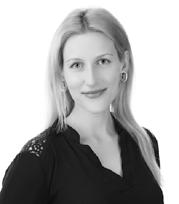

The EDC and the Chamber are excited to announce and welcome Rob Richardson as the Panasonic Opportunities Manager. “We believe it is essential to have a point person specifically tasked with furthering our interests in the many facets of the Panasonic development process.” Bonnie Lowe, Chamber and EDC President and CEO said.
This summer Panasonic announced it will build a $4 billion facility in De Soto just 7 miles to the east of Douglas County. This development brings significant new economic opportunities and is fast approaching for Douglas County. This project is the biggest private investment in state history, bringing 4,000 Panasonic jobs and a projected 4,500 supplier jobs to the region. Another approximately 15,000 construction jobs in the next 2 years will construct the plant. Panasonic will be producing new batteries or electric vehicles.

The Chamber is excited to announce that Joshua Falleaf has been named the Director of Economic Development for The Chamber, Lawrence, Kansas. Falleaf is responsible for promoting job growth and investment throughout the City of Lawrence and Douglas County, KS. Joshua will also develop and maintain strategic relationships and continue to have open lines of communication with local stakeholders and economic development partners.
Prior to joining the Chamber staff, Falleaf was a consultant with Coneflower Consulting in developing strategic planning processes for clients, particularly regarding diversity, equity, and inclusion initiatives. He also served as the Dean of the College of Humanities and Arts, as well as an English Instructor at Haskell Indian Nations University from 2012 - 2022.
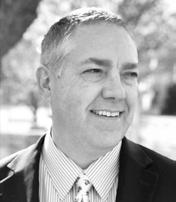
Sarah Randolph celebrates her 10th year with Bridge Haven Memory Care!
Truity Credit Union is pleased to welcome Johnathan Willis as the newest Lawrence Branch Manager. He will serve at the 23rd Street branch location.

“We are thrilled to promote Johnathan to a branch manager position,” Vice President, Lawrence Market Manager Kaylee Sell said. “He has an enthusiastic attitude and eagerness to help others which will be great assets to the credit union, our members and the community.”
Previously at Truity, he worked as a Member Consultant and a Branch Coordinator. He is passionate about the community and is eager to partner with local organizations and build relationships with members. He lives in Lawrence with his wife, Madi, and dog, Cooper.
Truity Credit Union is excited to announce Branch Manager Jordan Griffin has been named a winner of the NextGen Under 30 Kansas award. This program seeks to recognize individuals who demonstrate talent, drive and service to their communities.
“We are incredibly proud of Jordan and the exemplary work she does every single day with our employees and members. This award is well deserved,” Vice President, Lawrence Market Manager Kaylee Sell said. “We look forward to being on the front line of her continued success as she progresses in her career at Truity Credit Union.”
Griffin has been in the financial industry since 2016 and has filled various roles at Truity. She currently serves as the Social Chair for Lawrence Young Professionals and is involved with the Lawrence Women's Network. She is also an active member of the Chamber of Commerce and enjoys volunteering with Douglas County United Way and Junior Achievement.

Good Energy Solutions, one of the leadingsolar design and installation companies in Kansas and Missouri, has opened a new division dedicated solely to the service and repair of solar panel systems. This new division will help owners of existing residential and commercial solar panelinstallations keep their systems operating at peak efficiency, diagnose problems, and make repairs. Jeff Dunn, Director of Solar Service for Good Energy Solutions says, “We want to keepyour solar panel system working at its absolute best. Our team of solar technicians can service, fix or upgrade any system, even if it wasn’t installed by us.”
The new solar service and repair division will also help clients remove/reinstall solar panels, update monitoring software, and install critter guard barriers around panels. The Good Energy Solutions solar team is entirely made up of full-time employees with many being NABCEP© certified, indicating they are elites in the solar industry
The Kiwanis Club of Lawrence hosted its sixth Honors Dinner to benefit the Boys & Girls Club of Lawrence, bringing recognition and celebration to two long-standing community organizations.
Left to right: Matt Llewellyn (Board Member), Gary Rexroad (Kiwanis Substantial Citizen), Mindy Collmeyer (BGCLK Advocate and Volunteer), Lindsay (BGCLK Director of Program Operations), Kathryn Watson-Jackson (BGCLK Youth Support Aide), Brandon McAnderson(Master of Ceremonies).
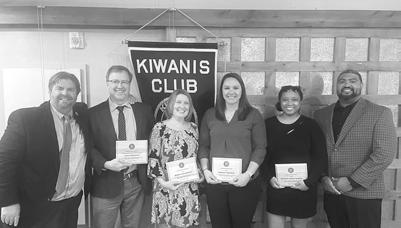
Be the first to correctly guess which local business figure works behind this desk. Winner receives a $50 gift card to 23rd Street Brewery. facebook.com/lawrencebusinessmagazine


